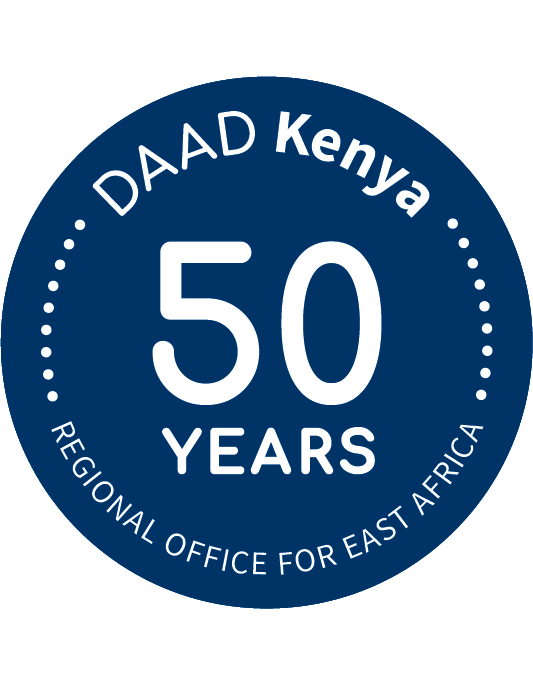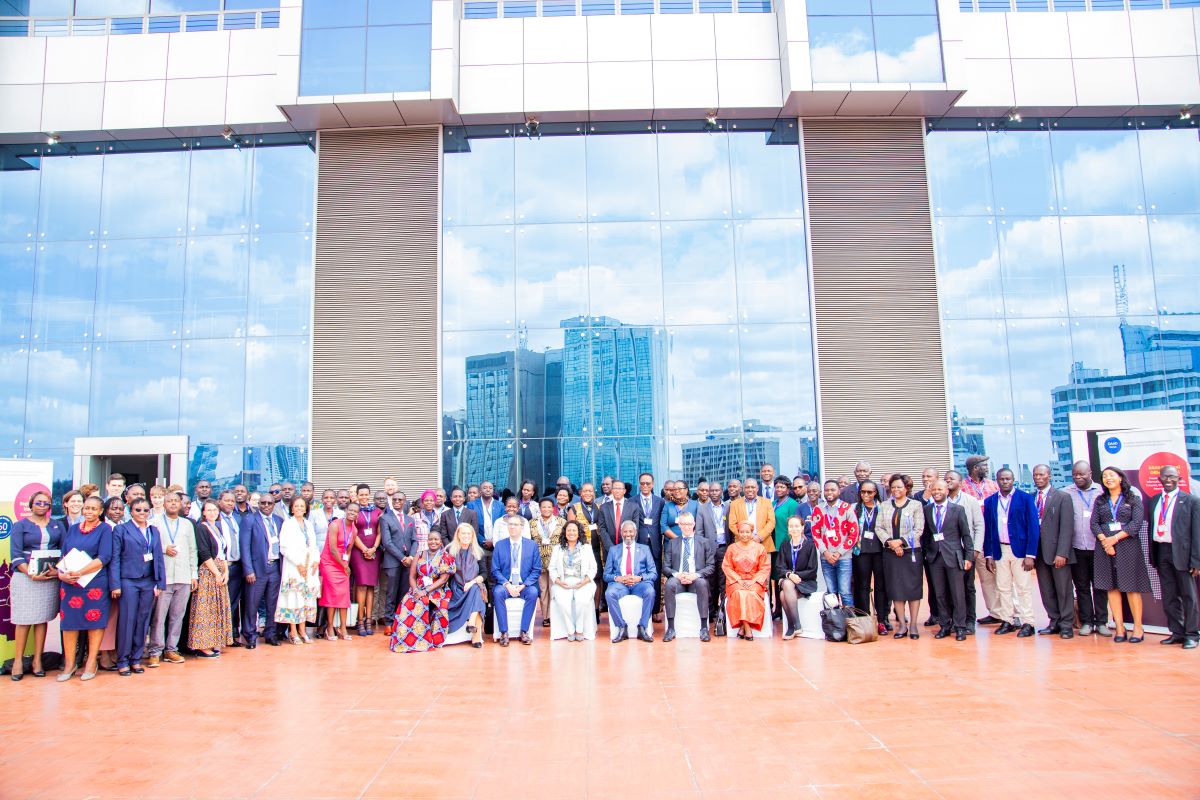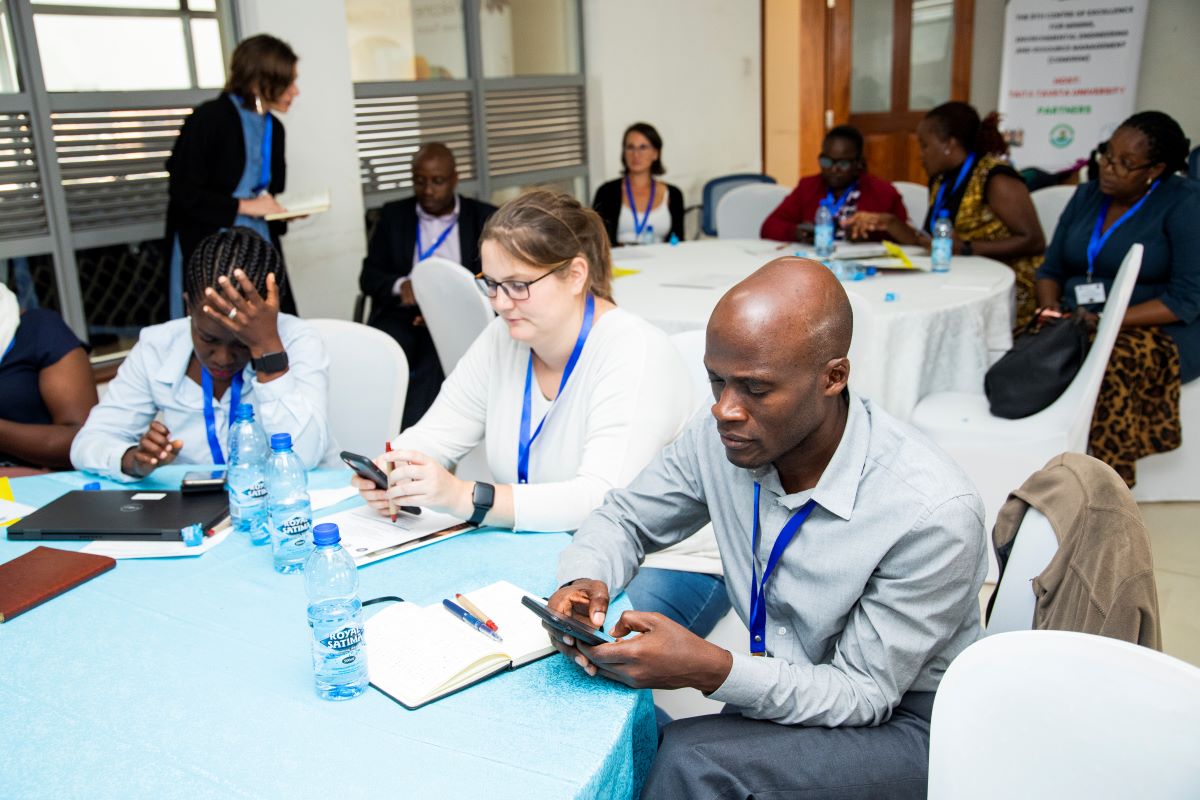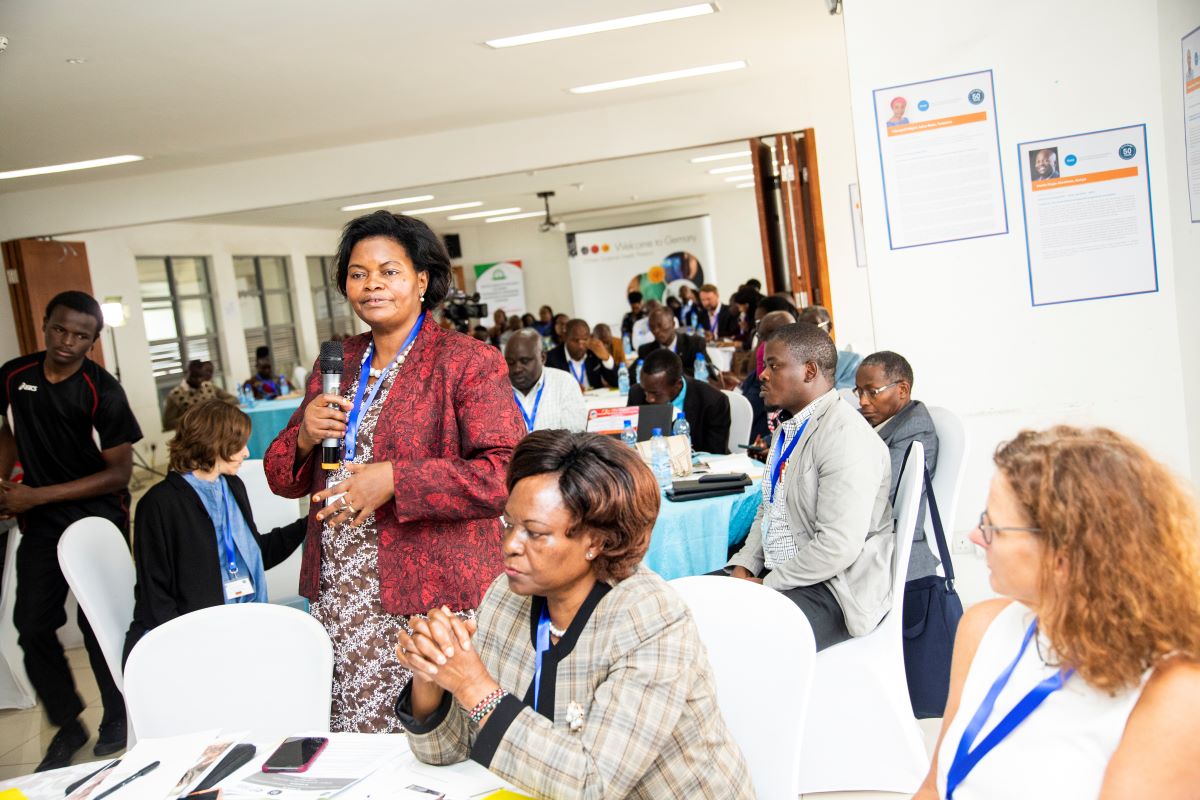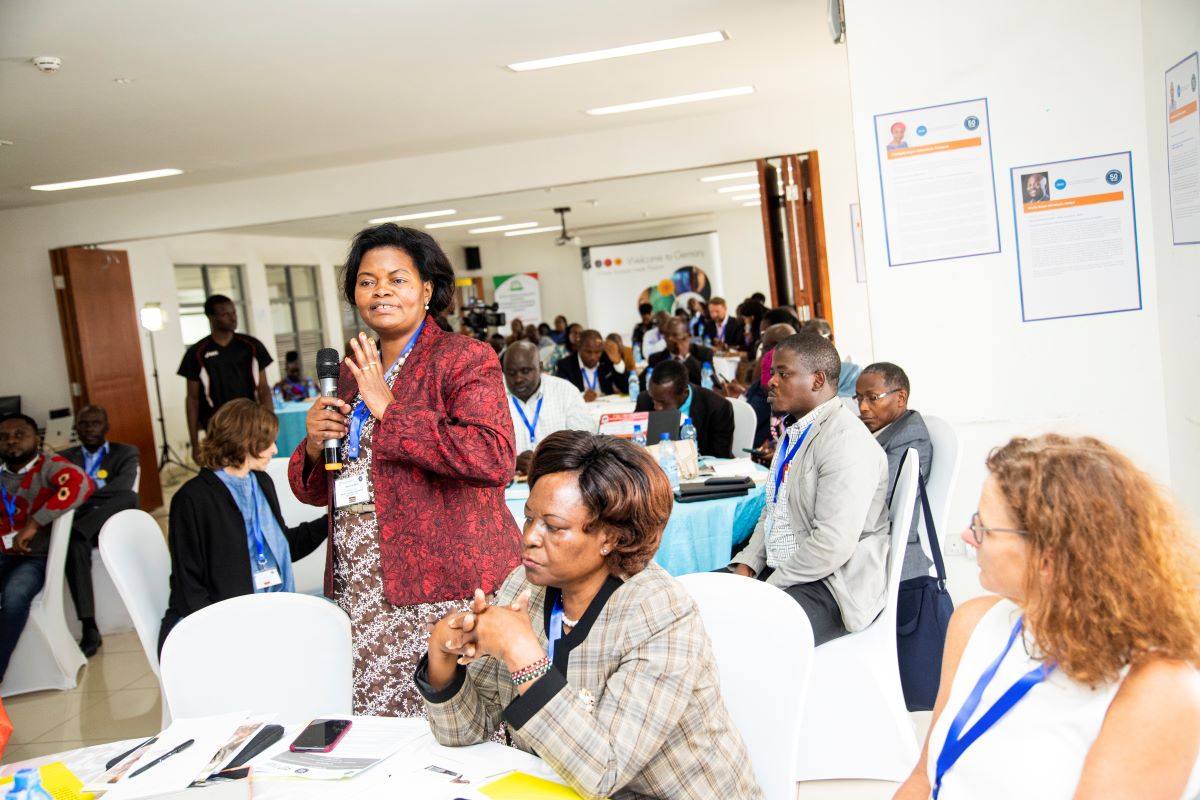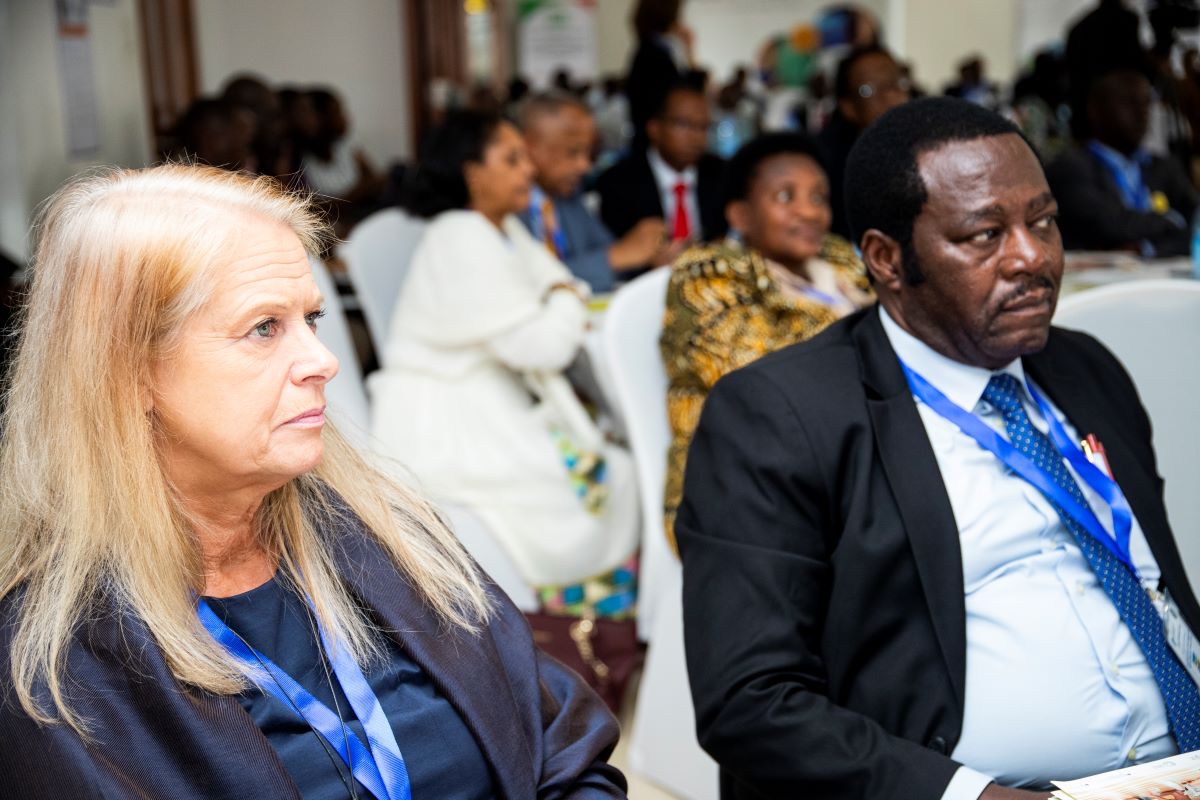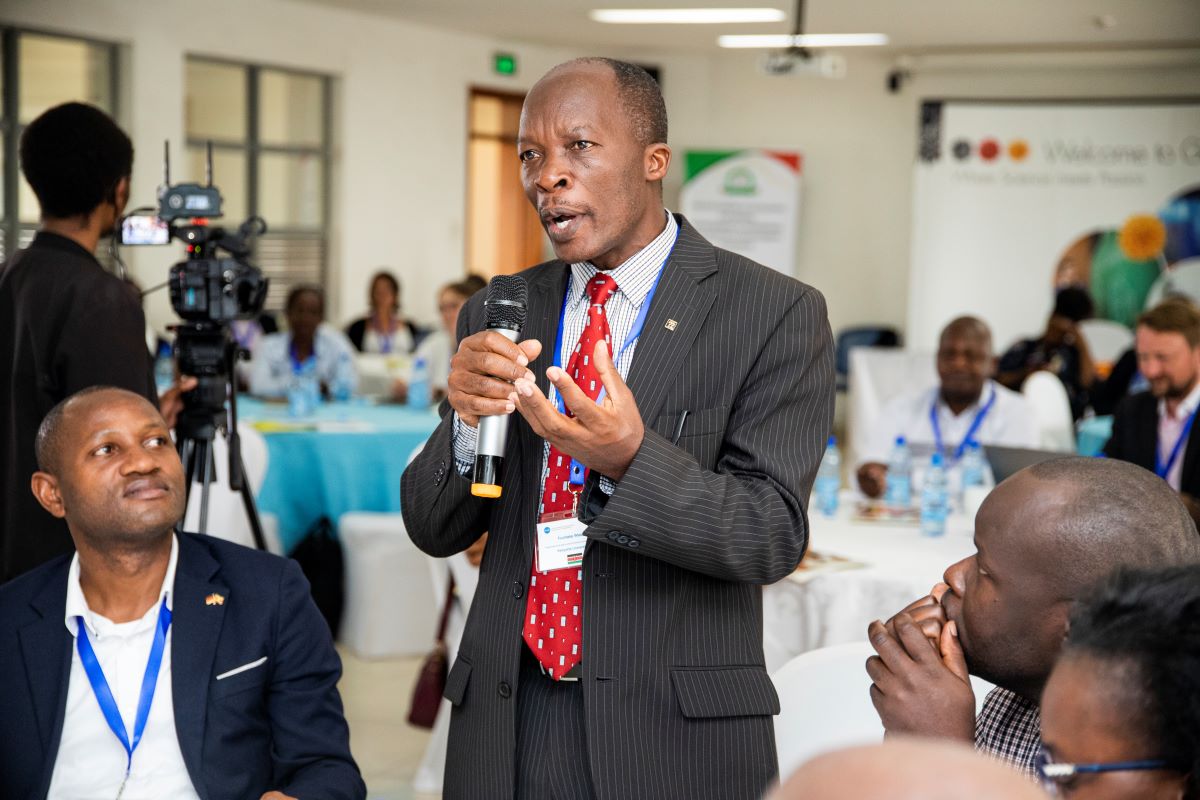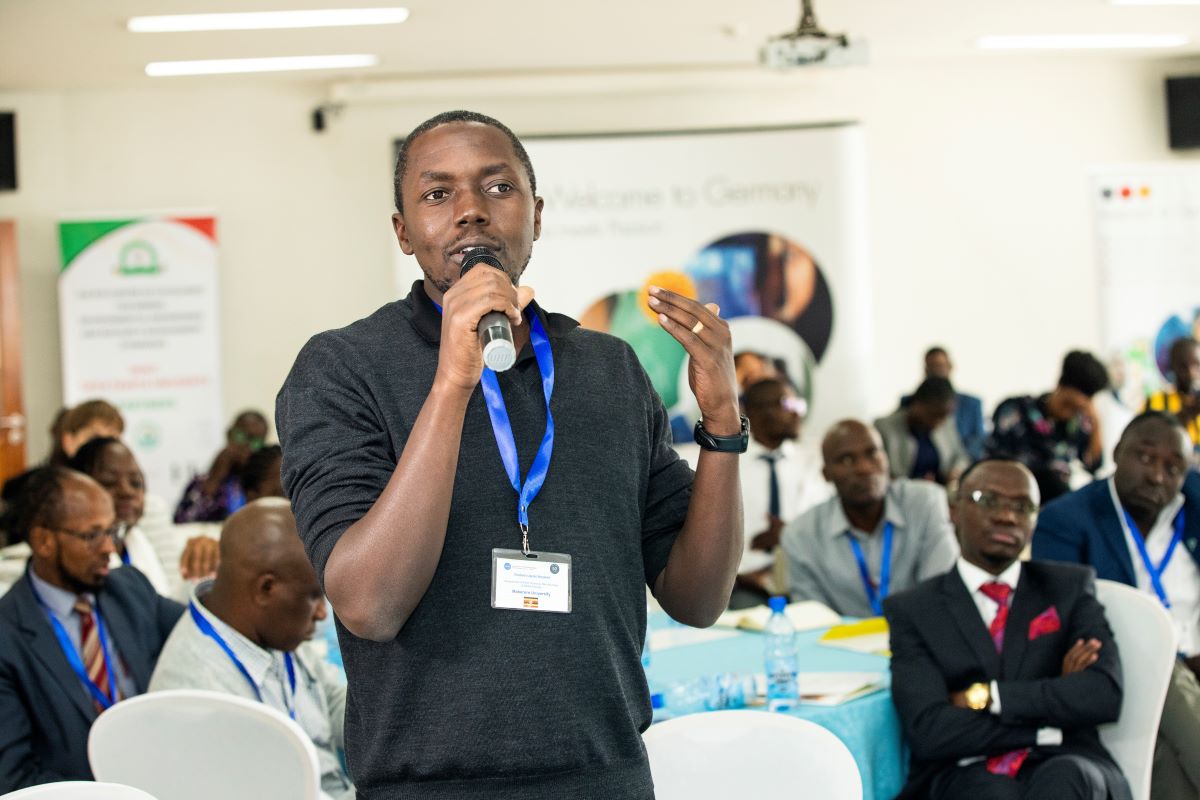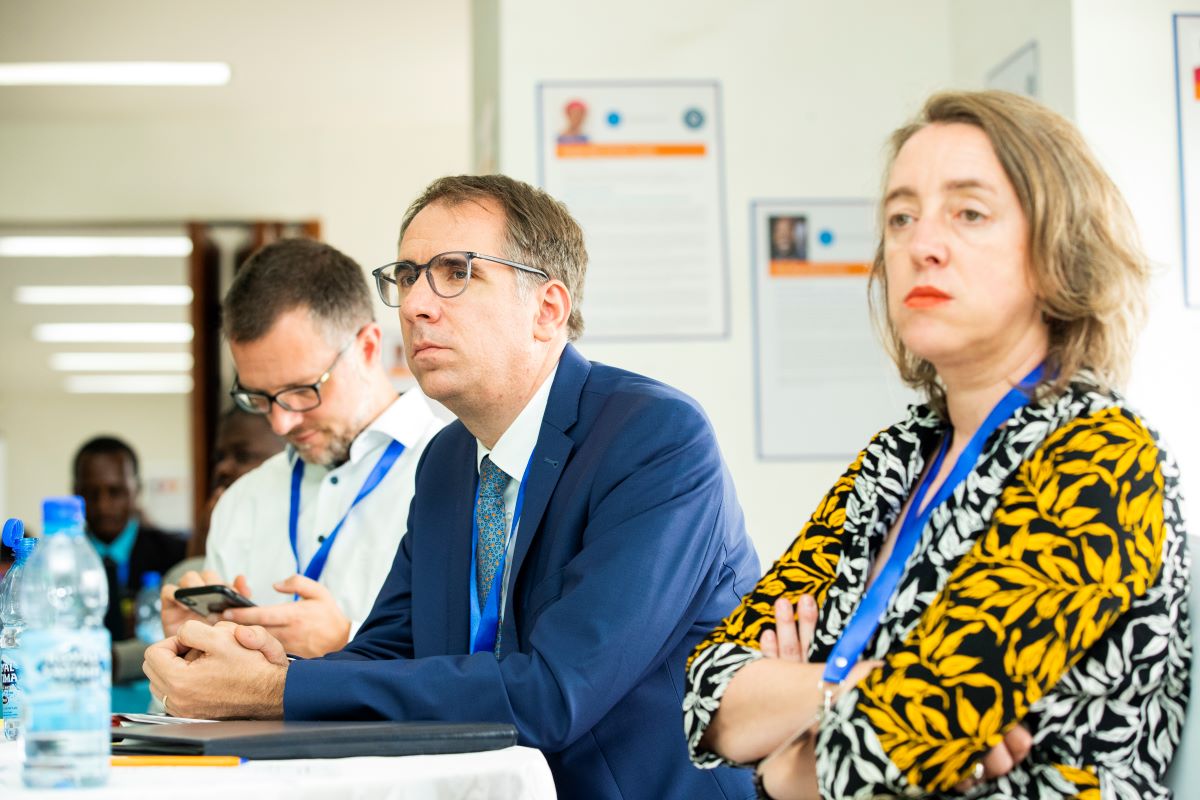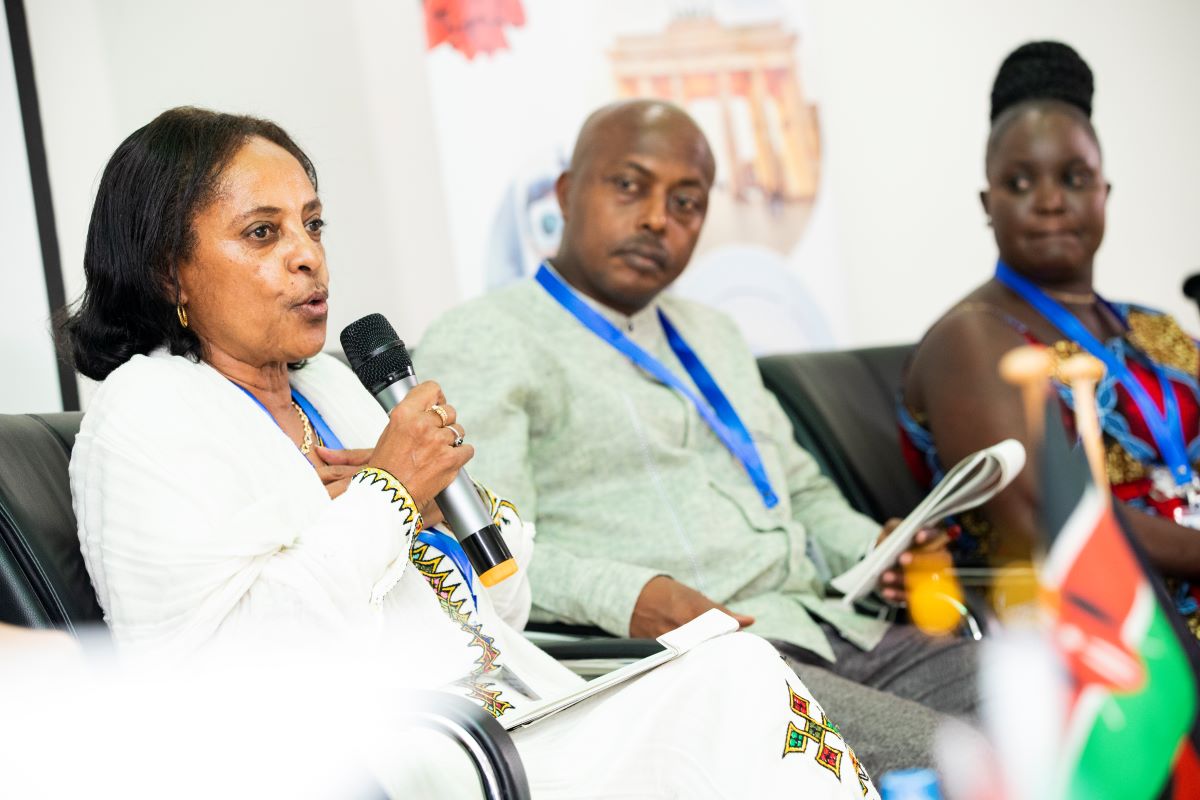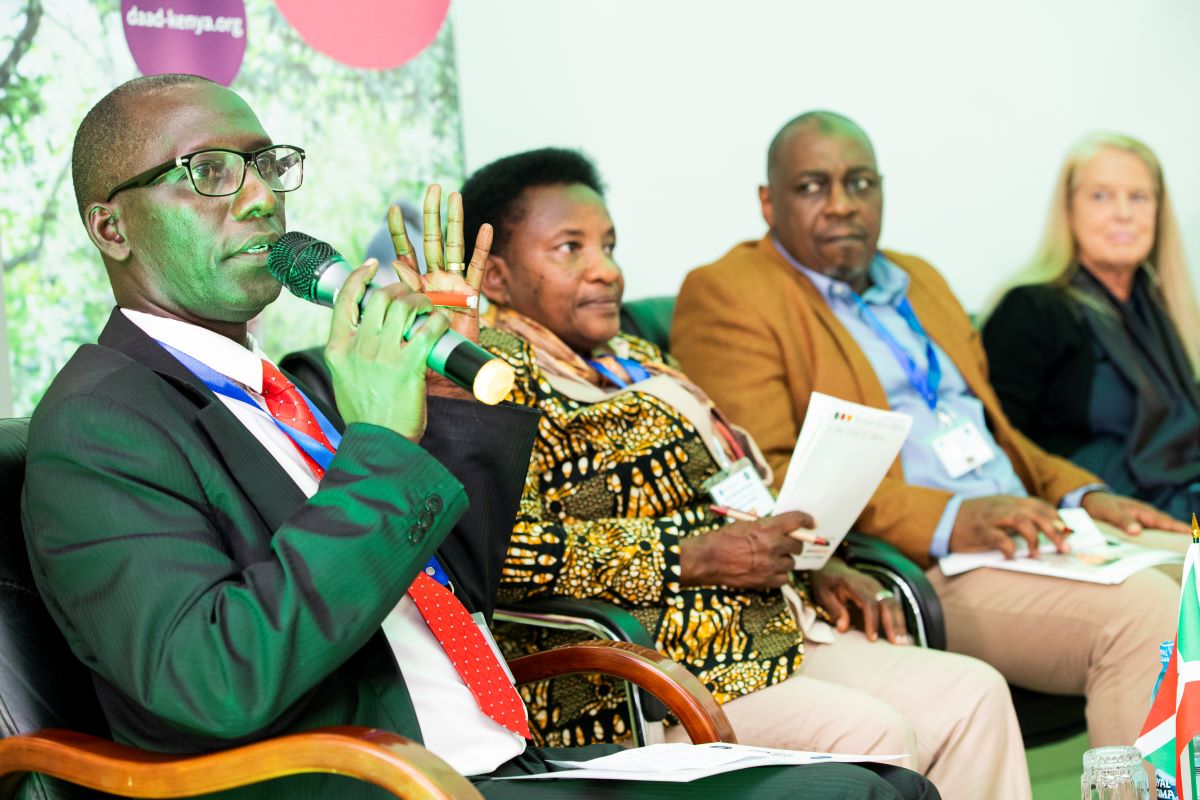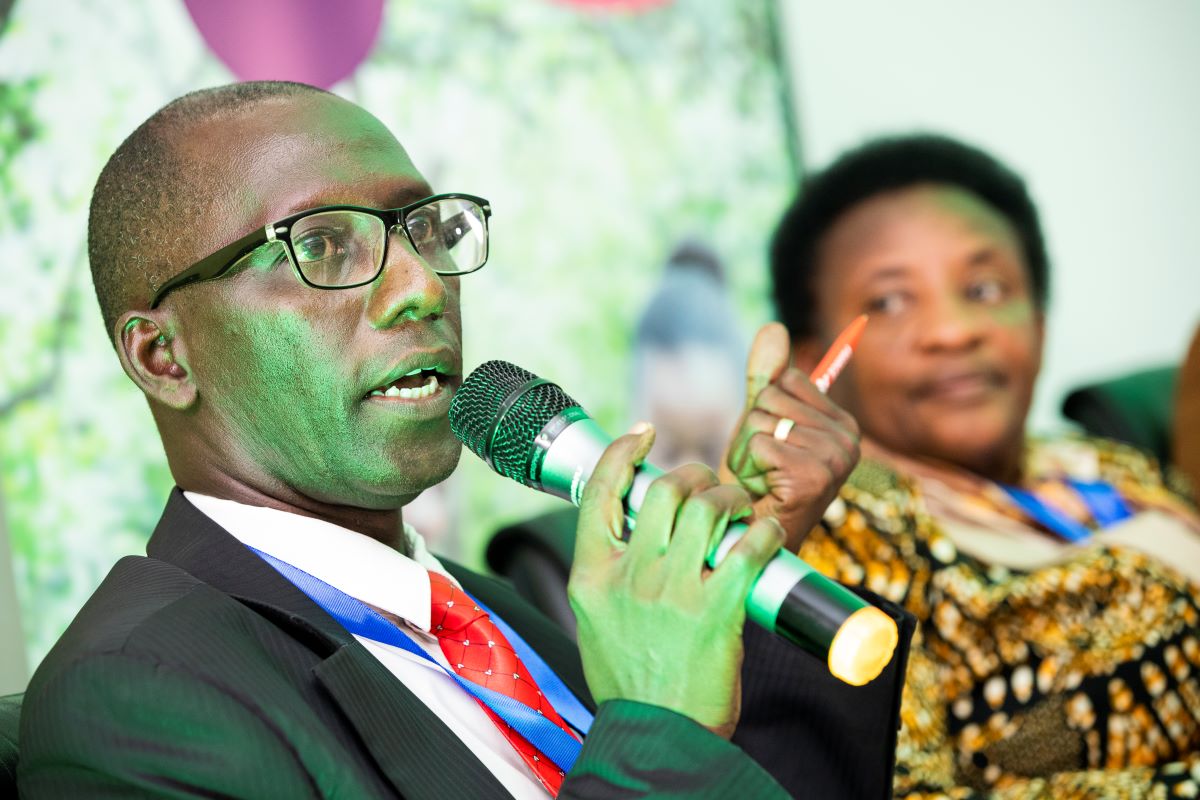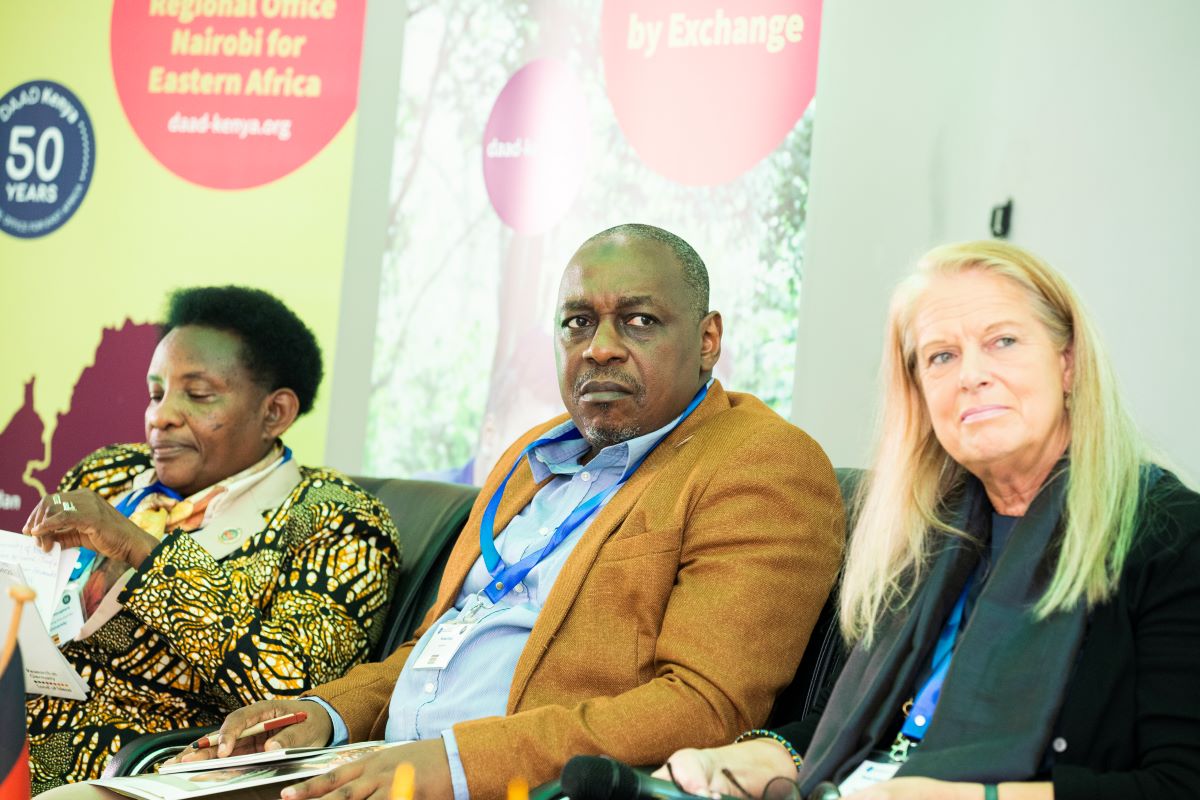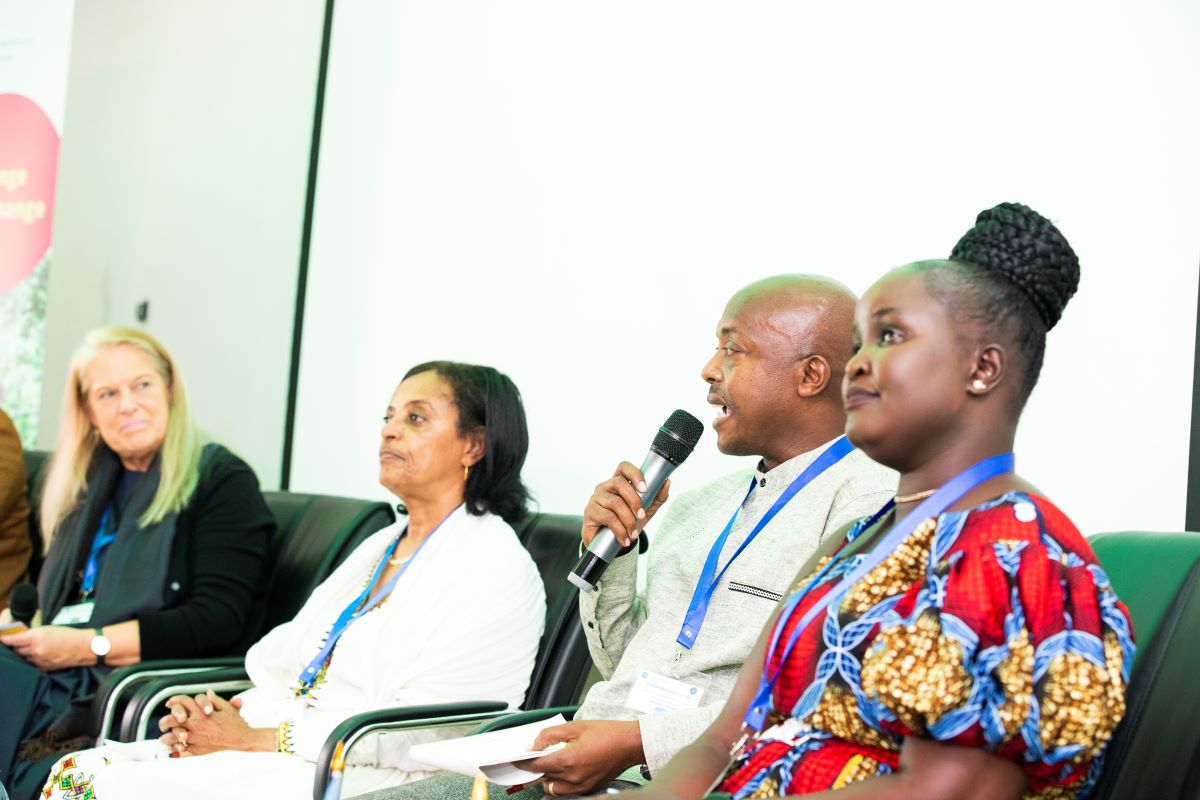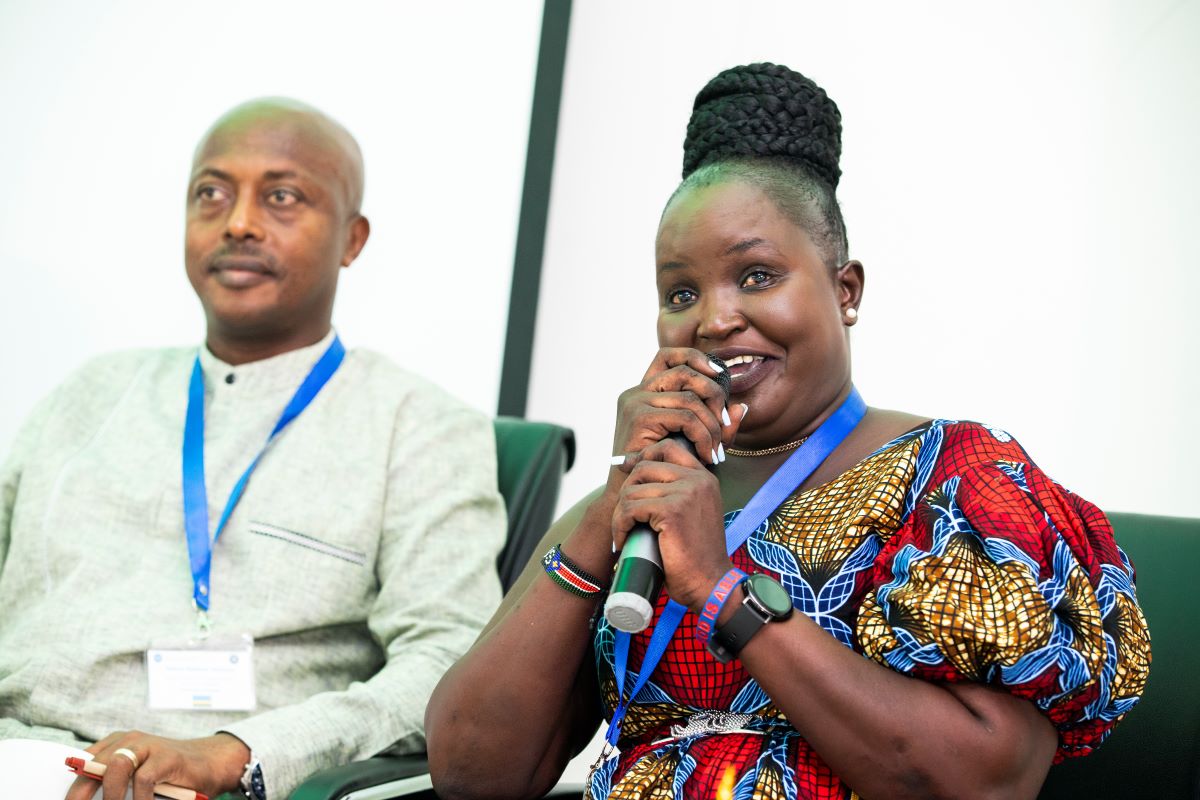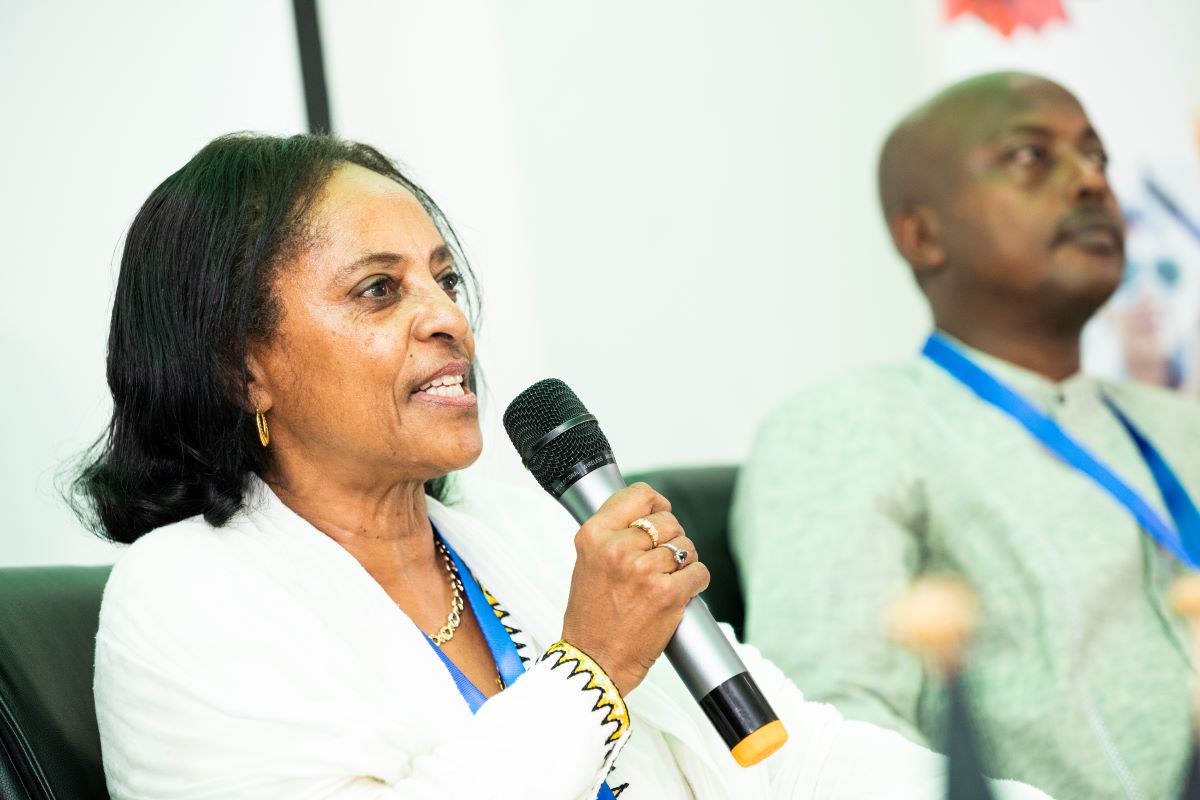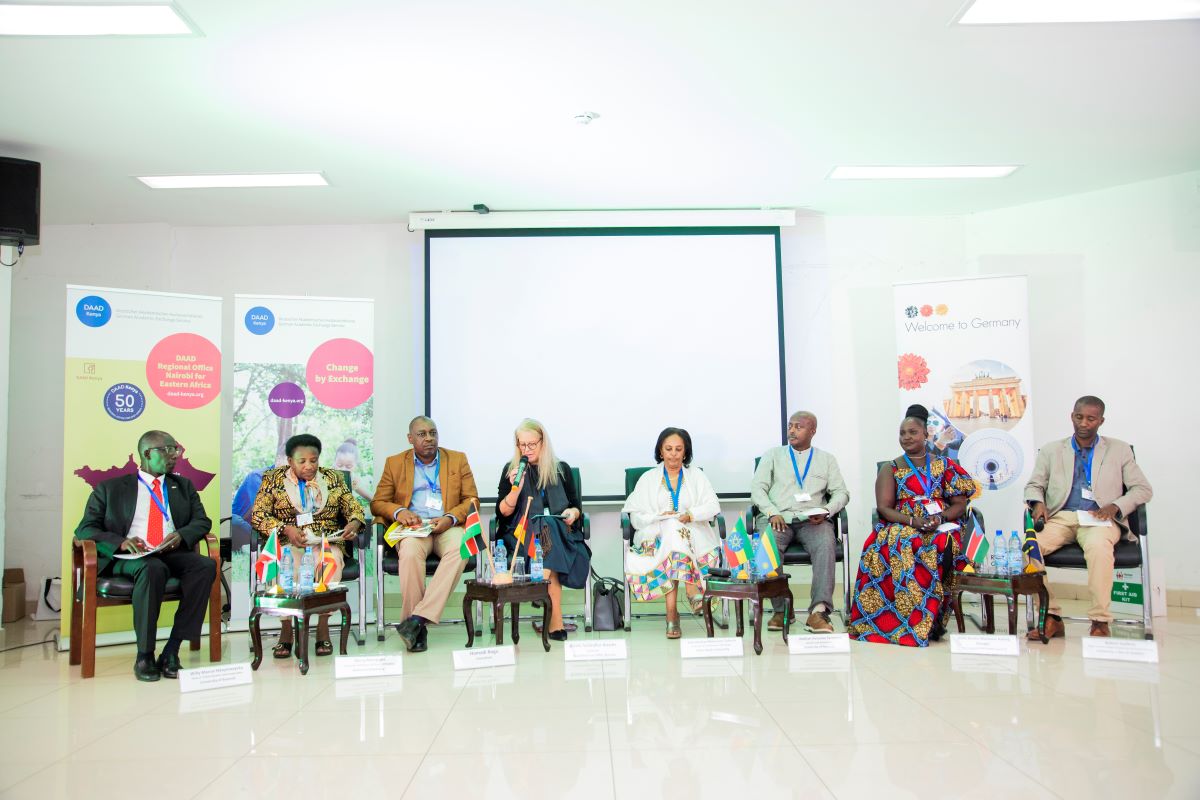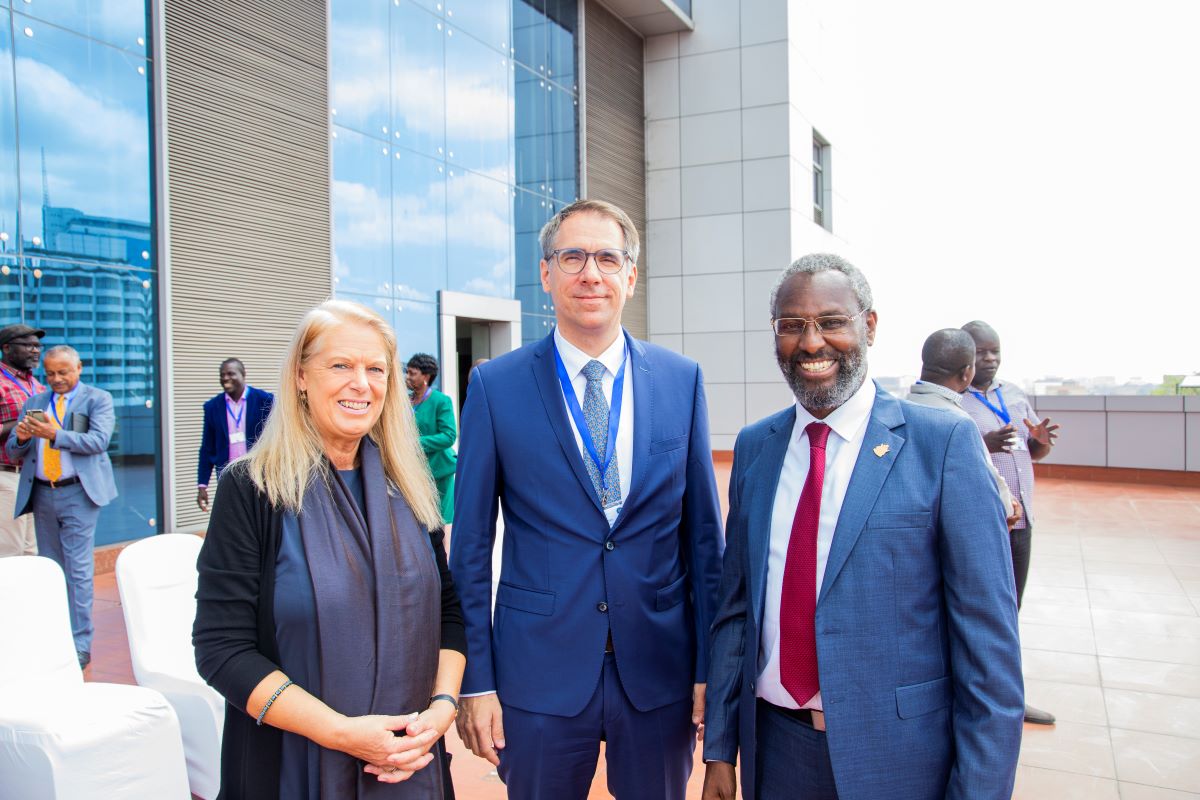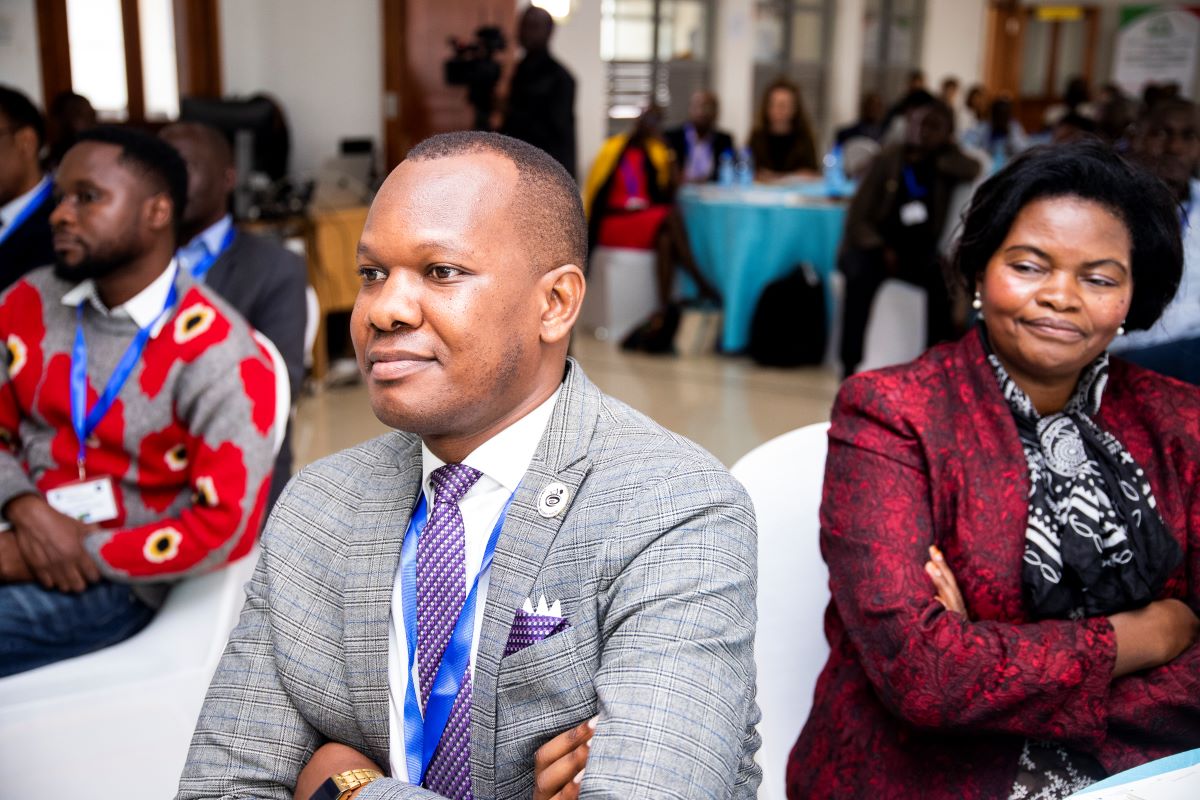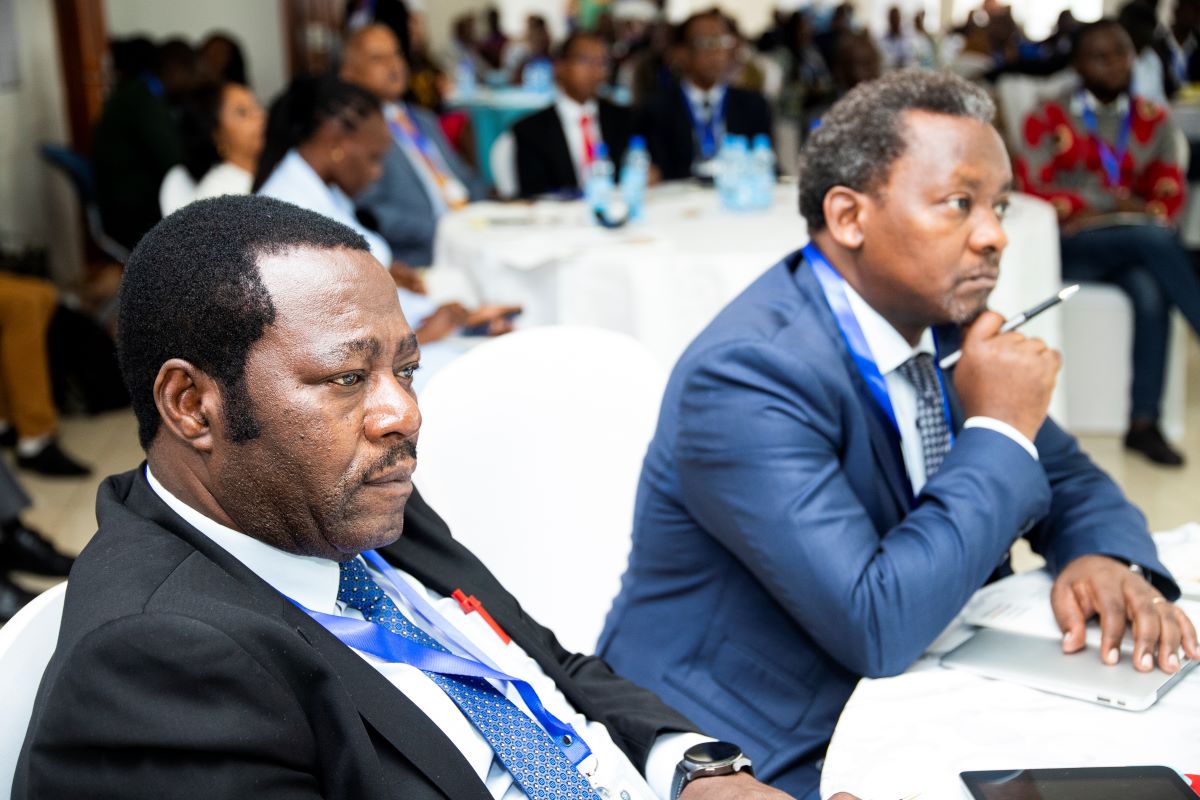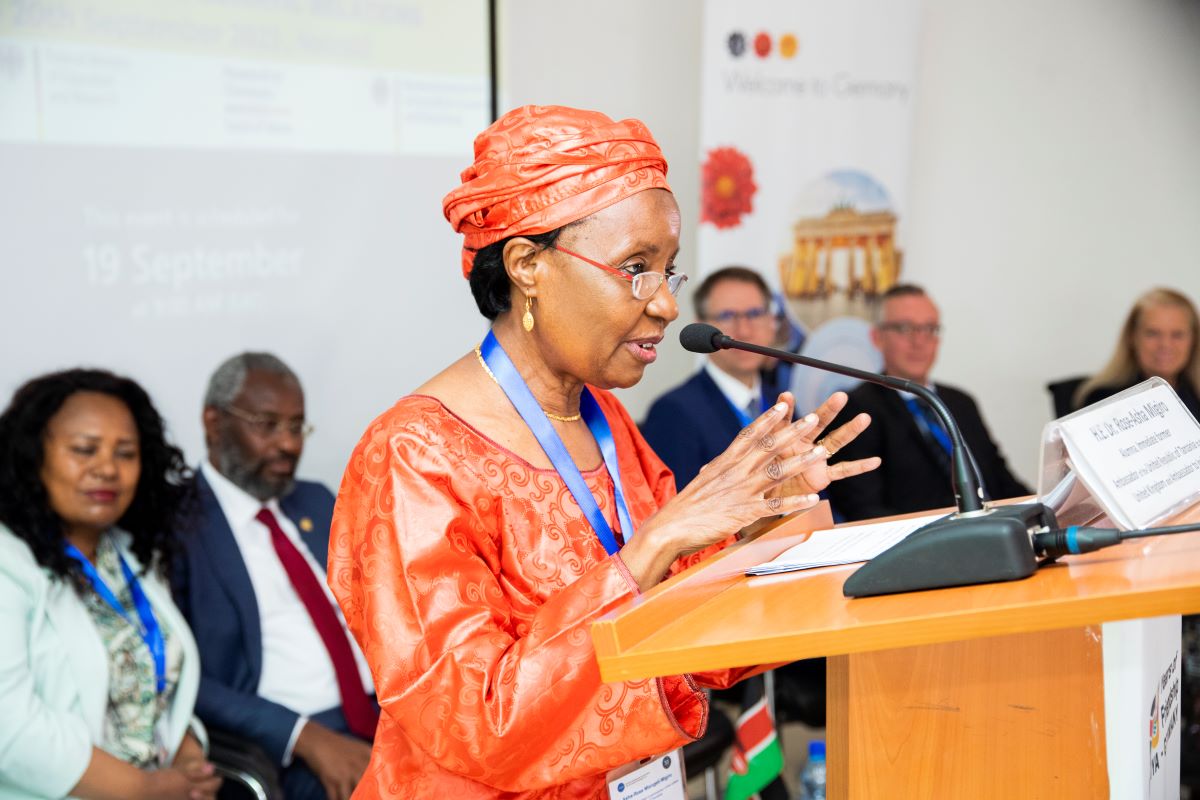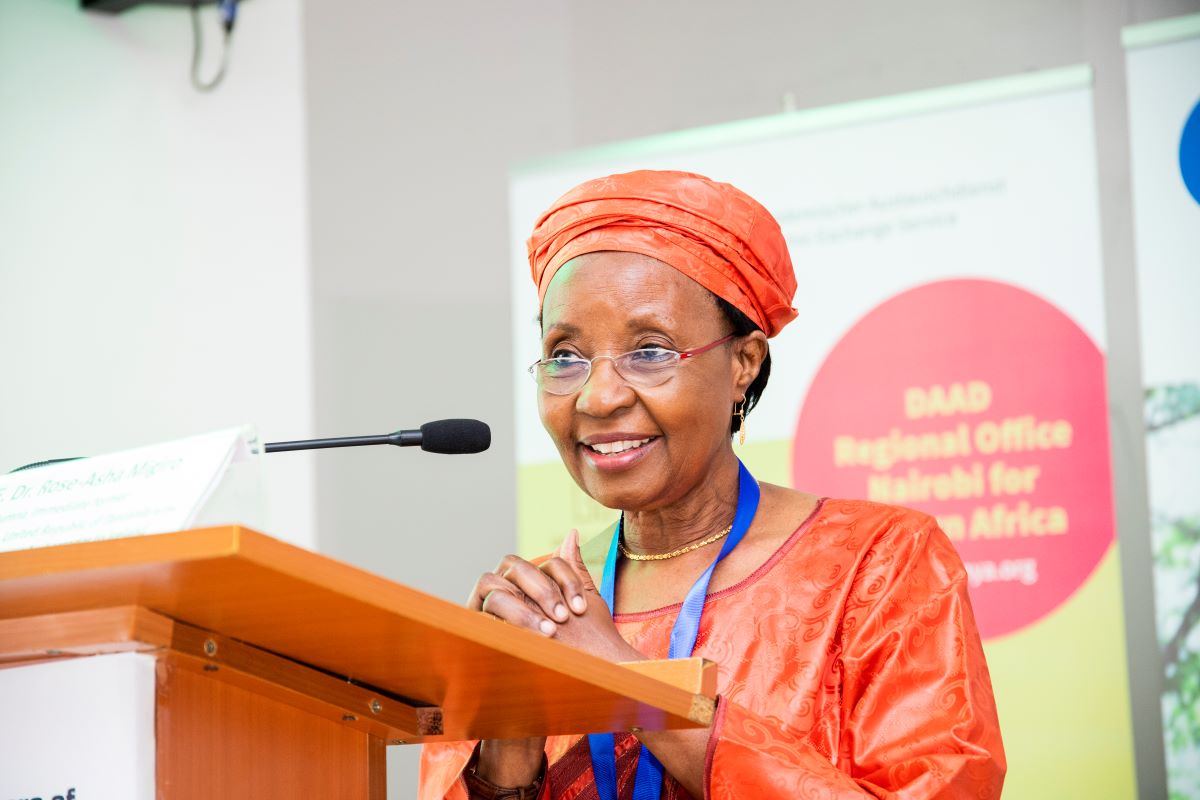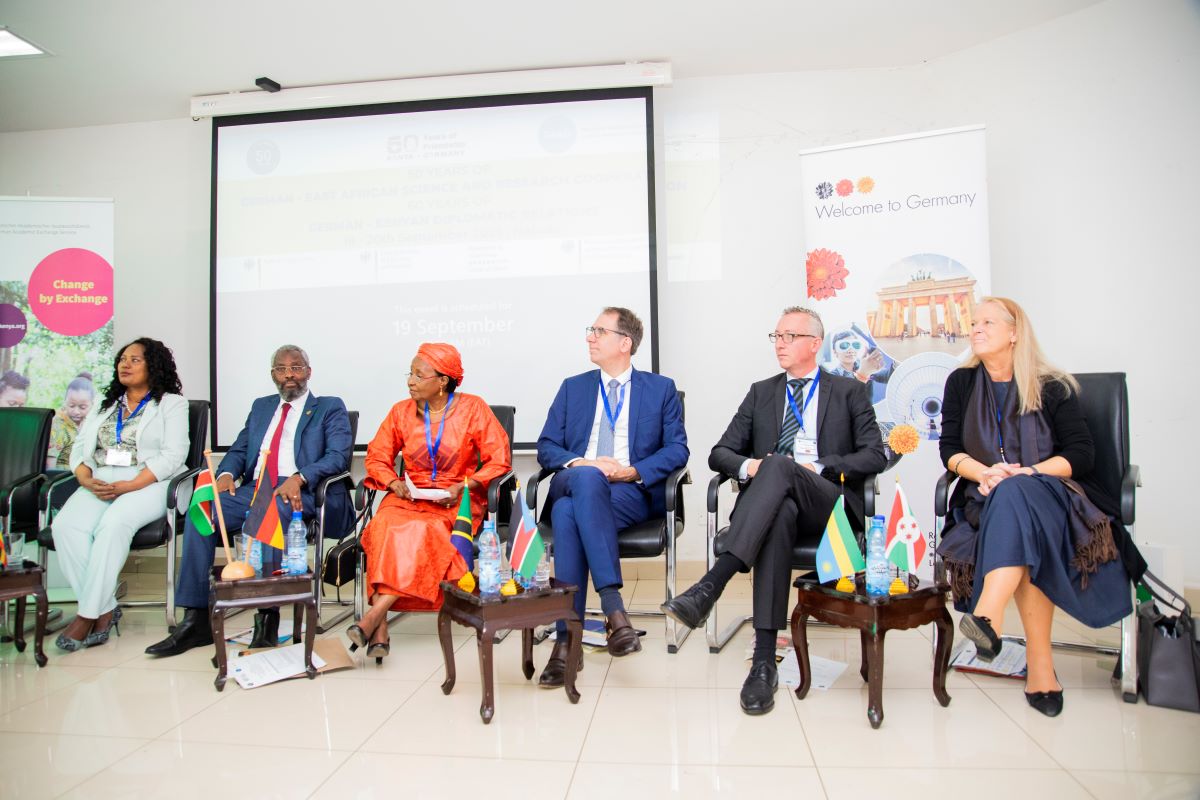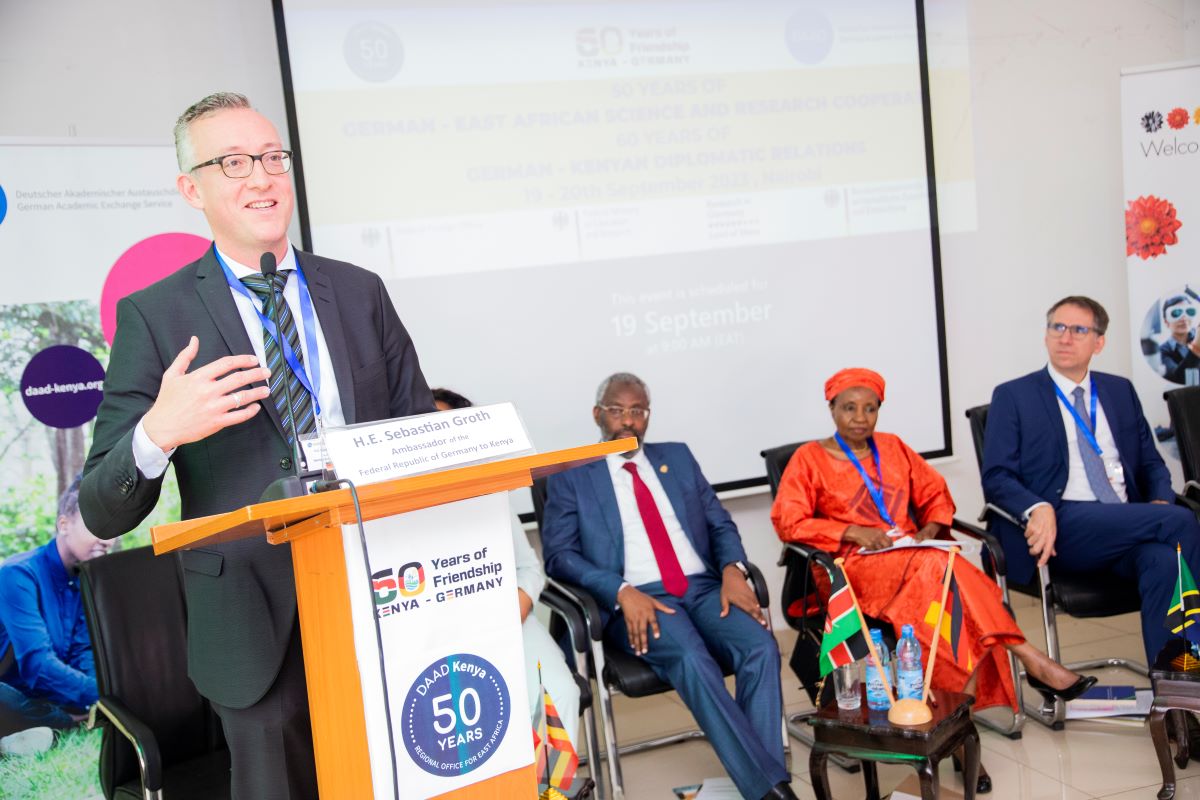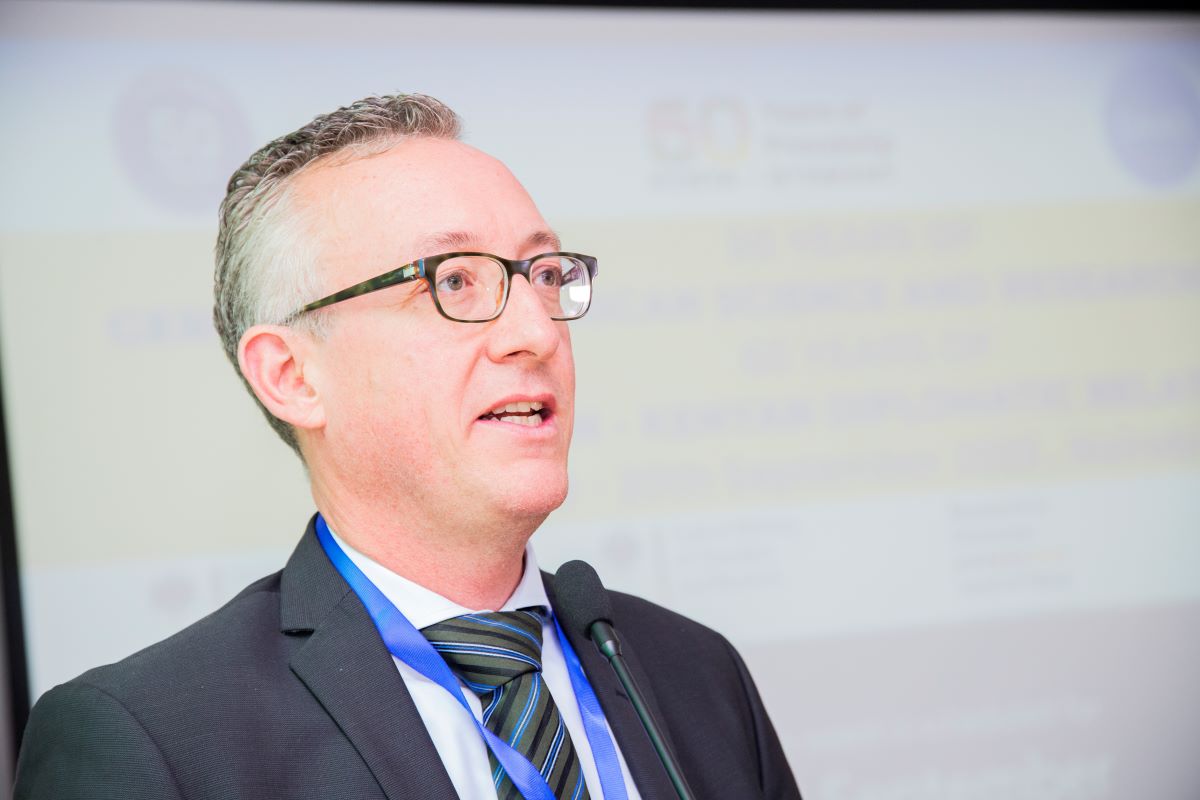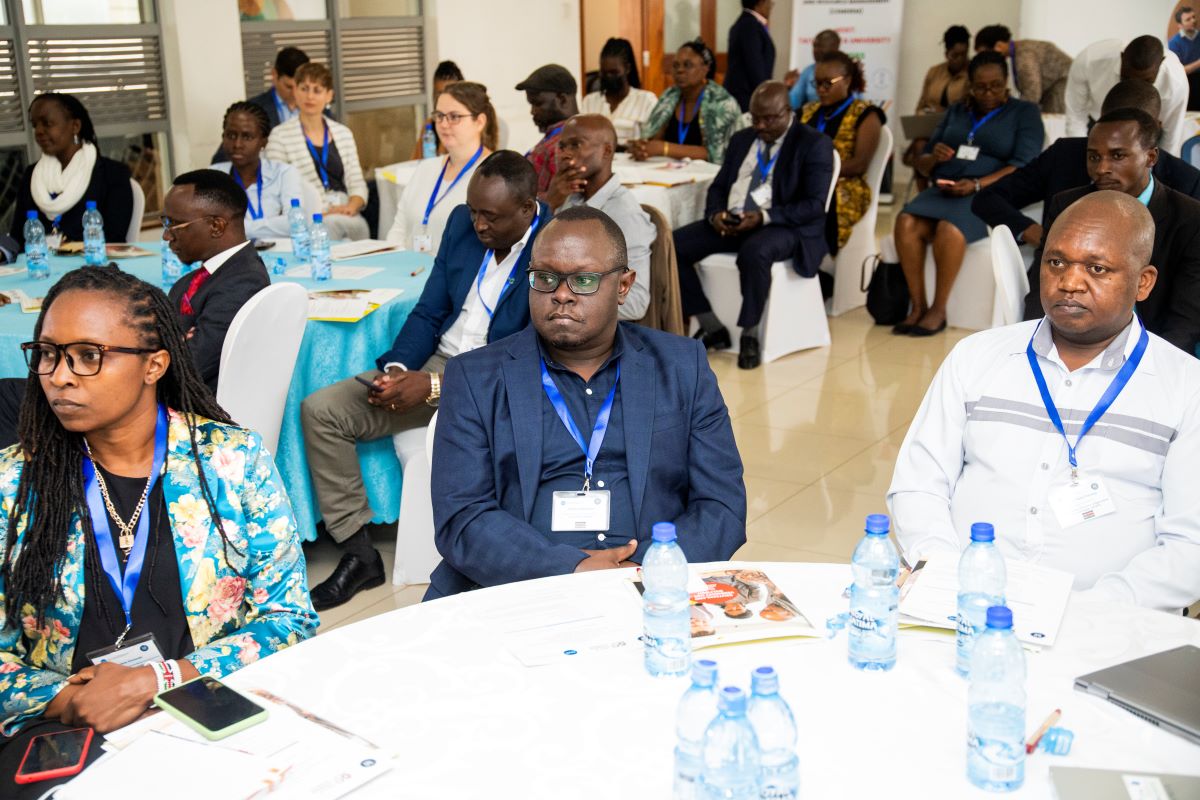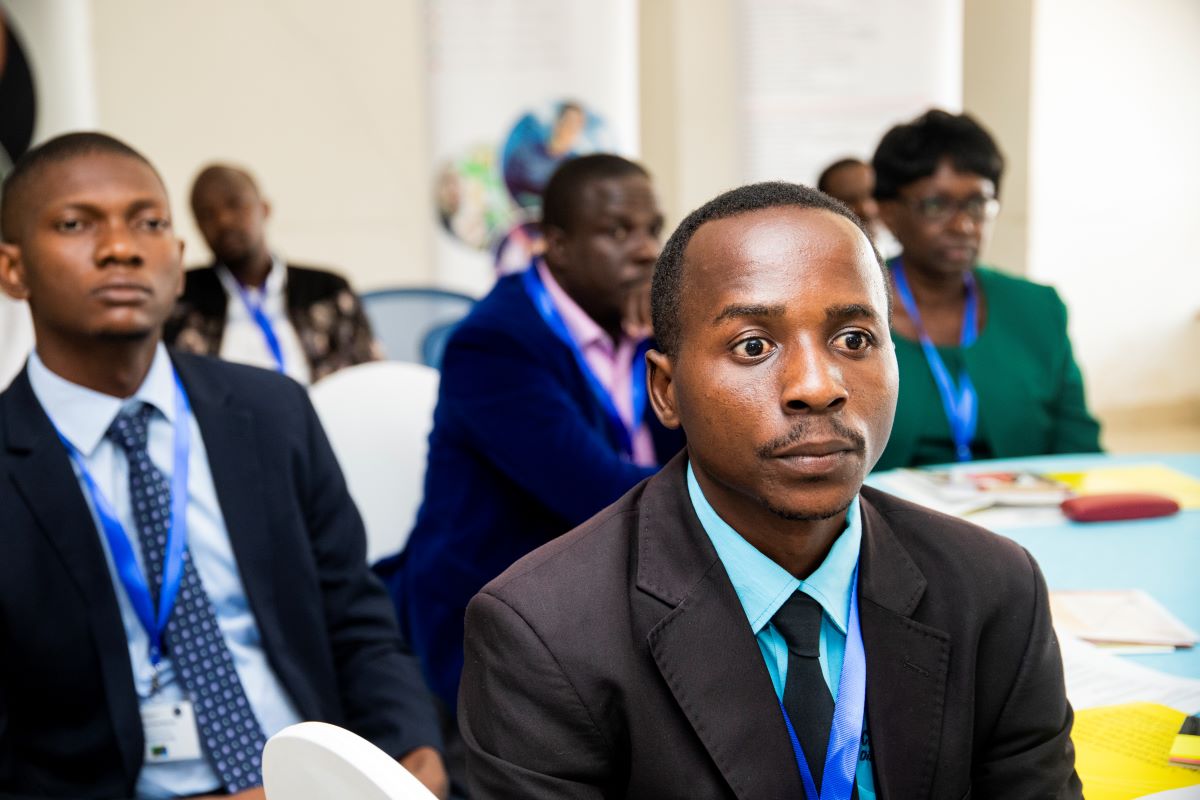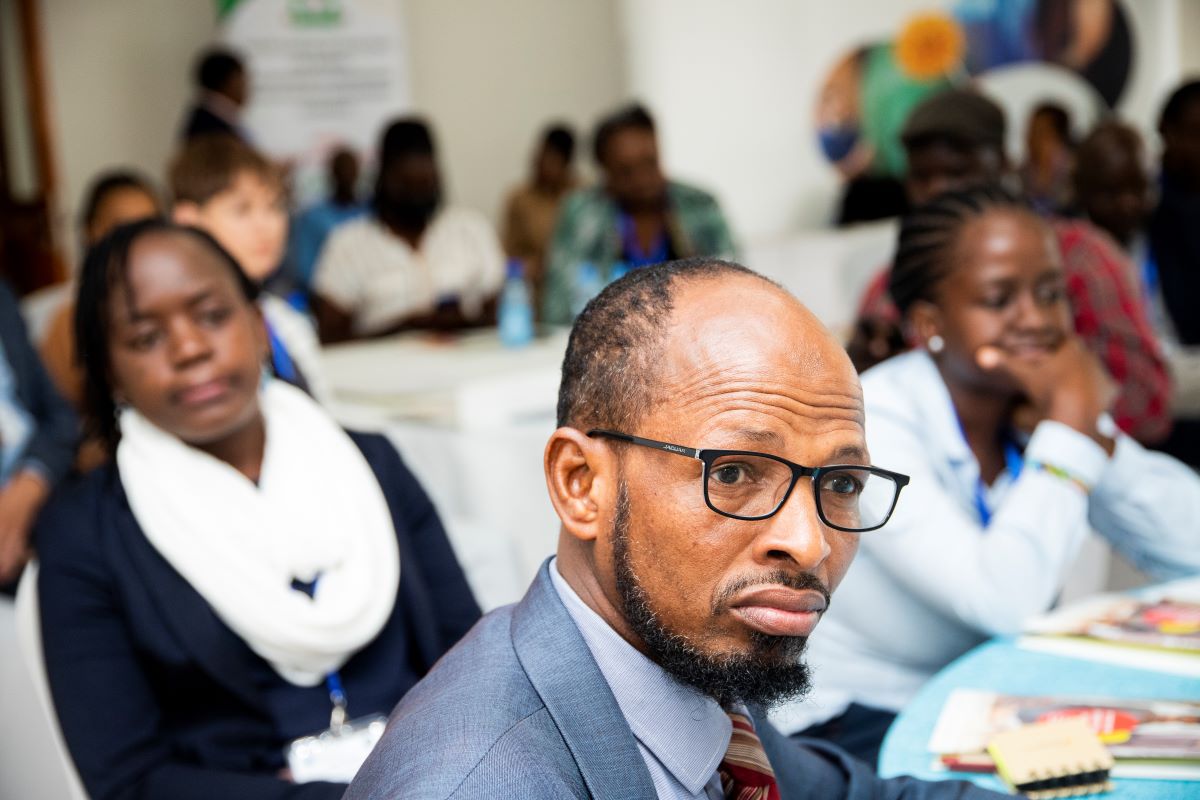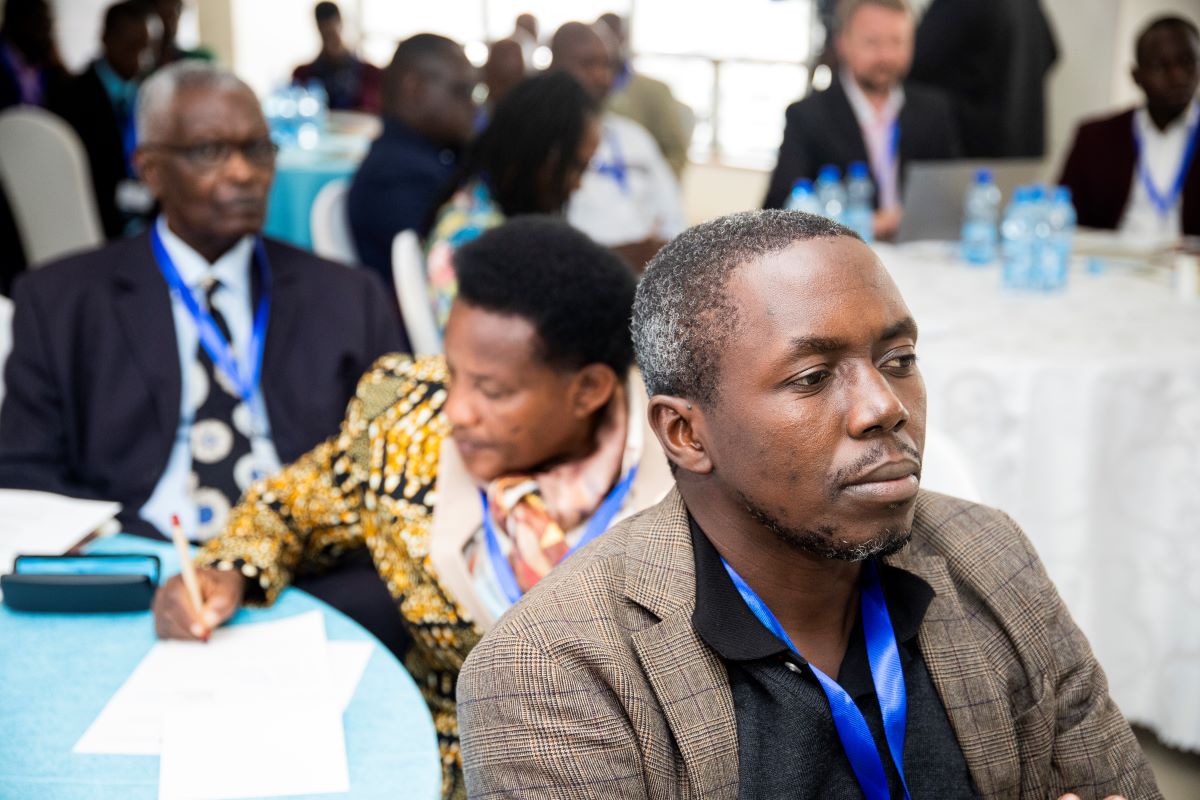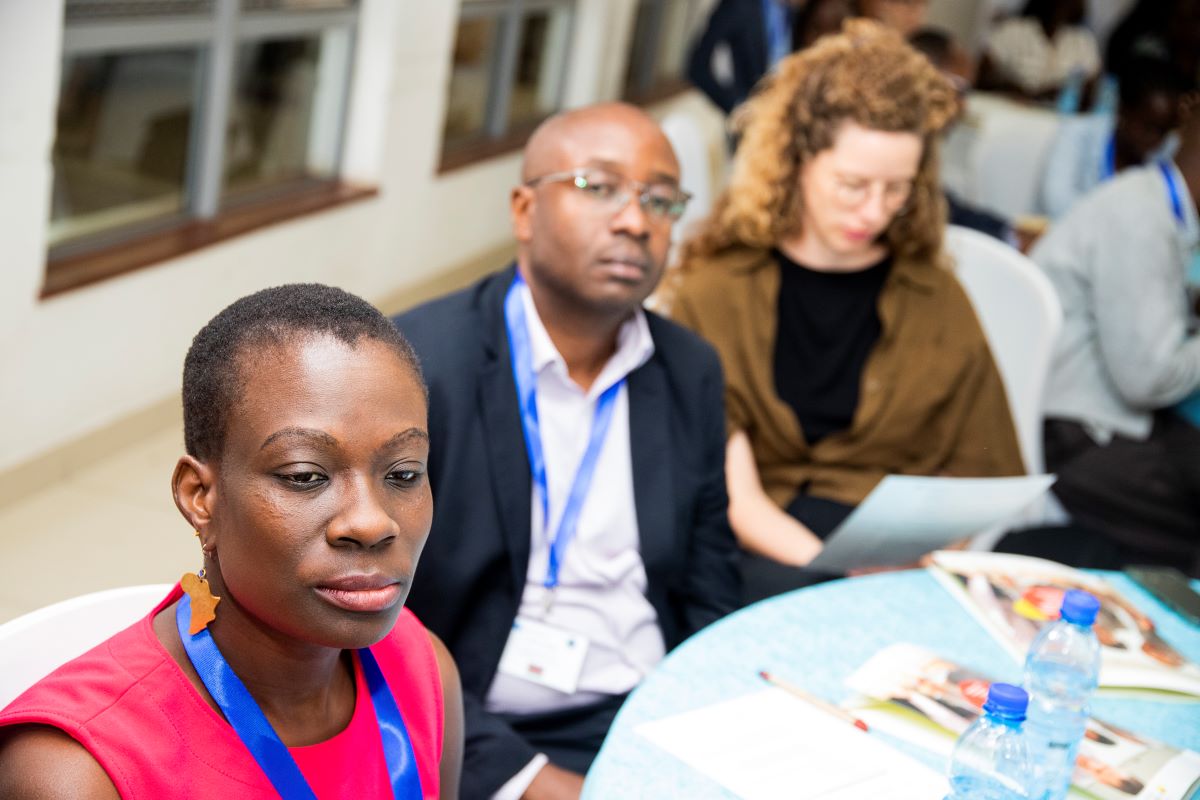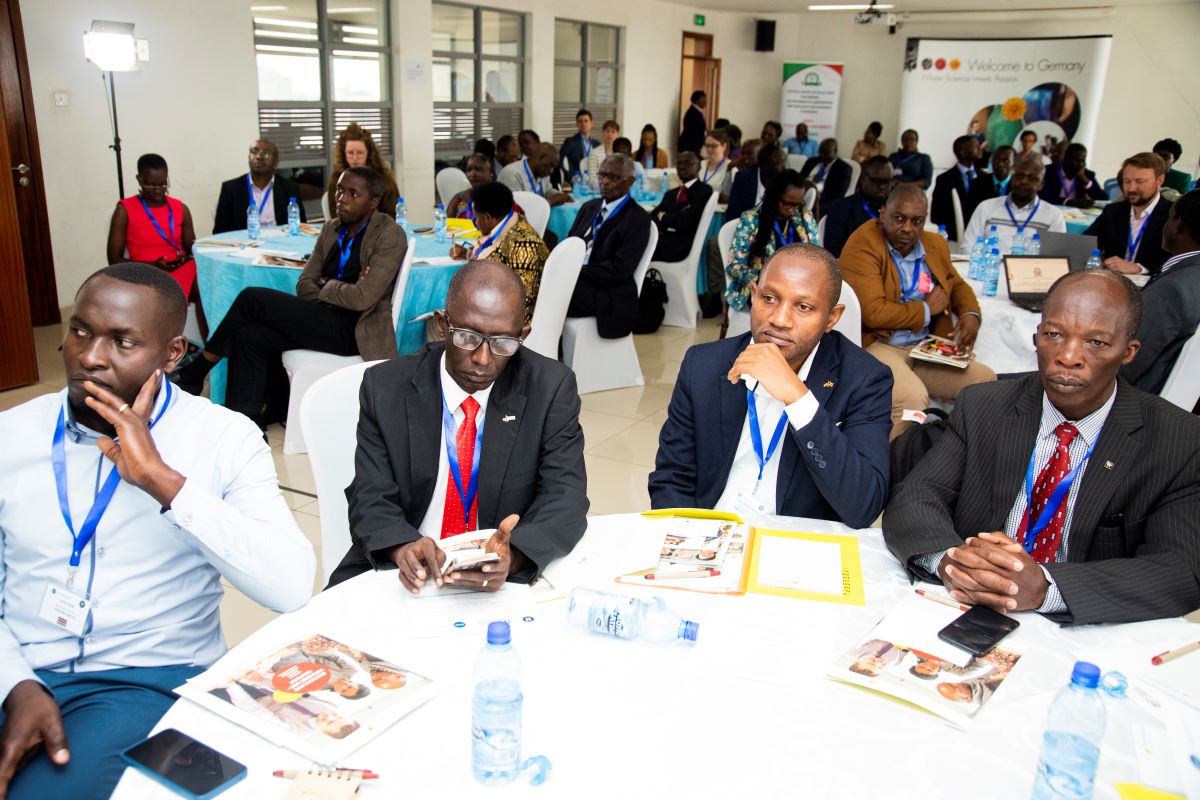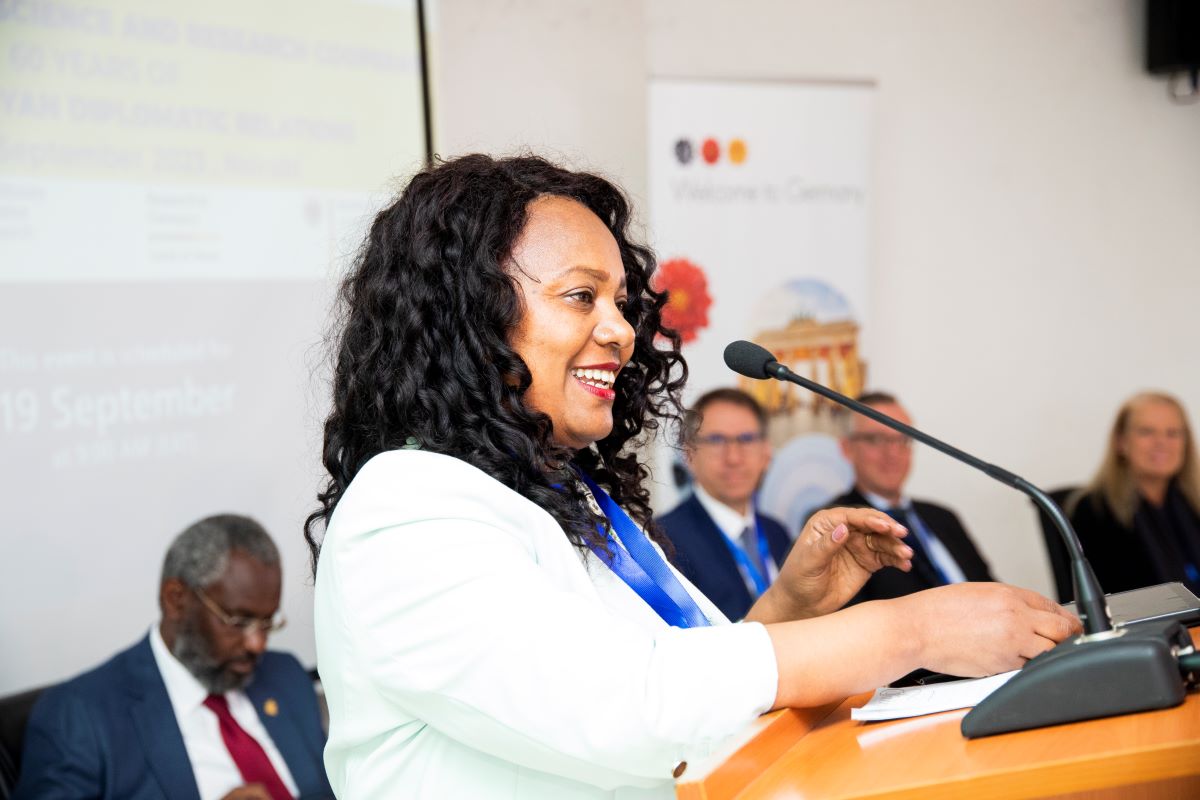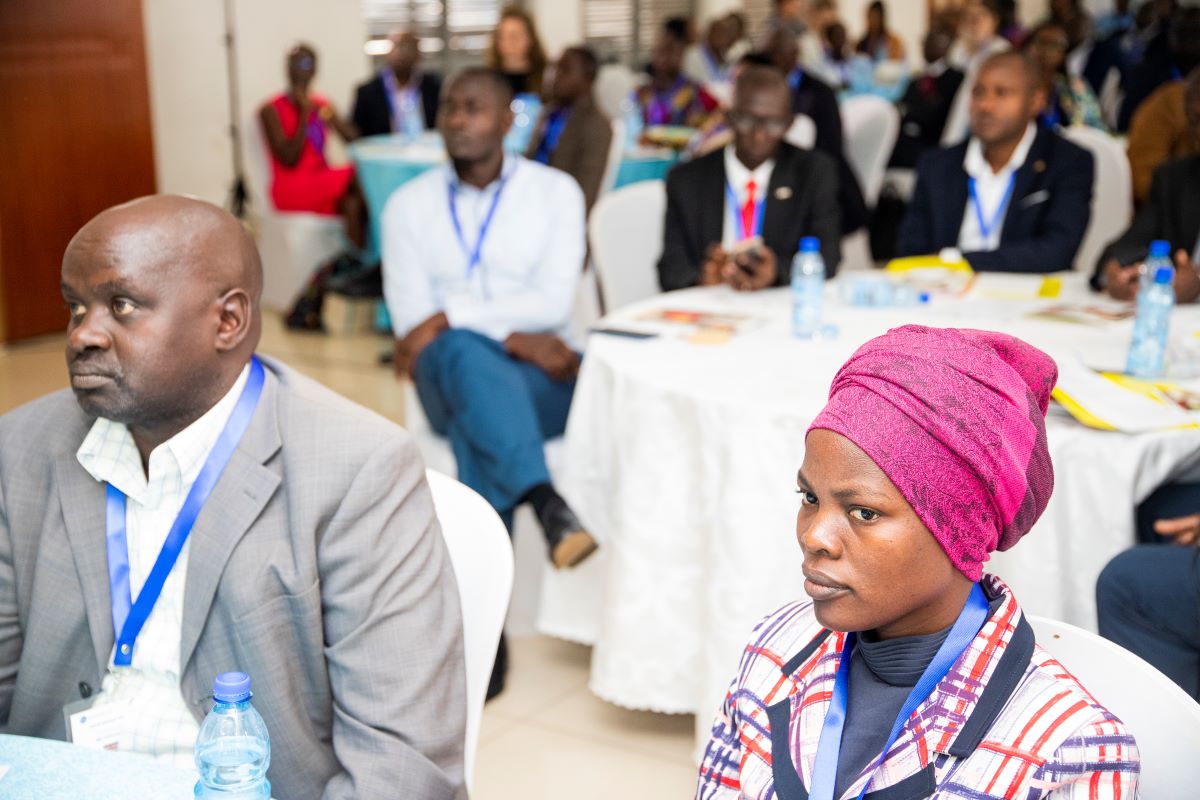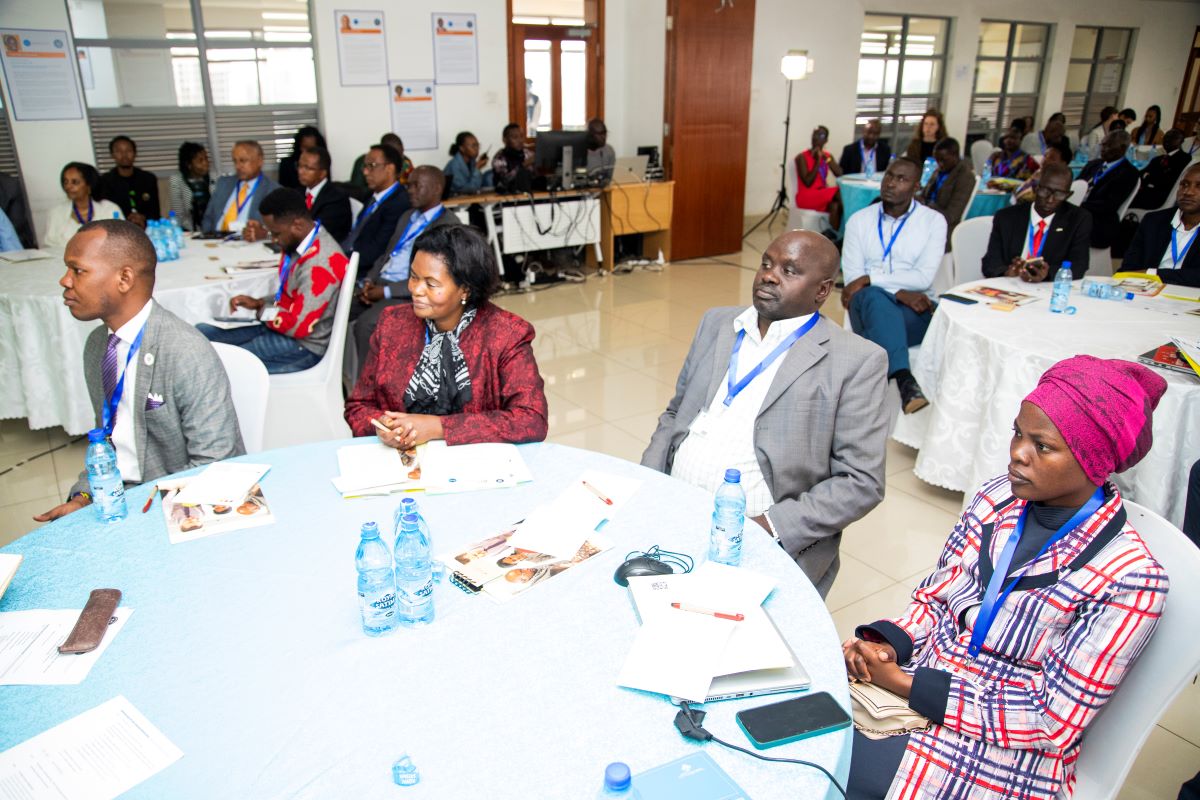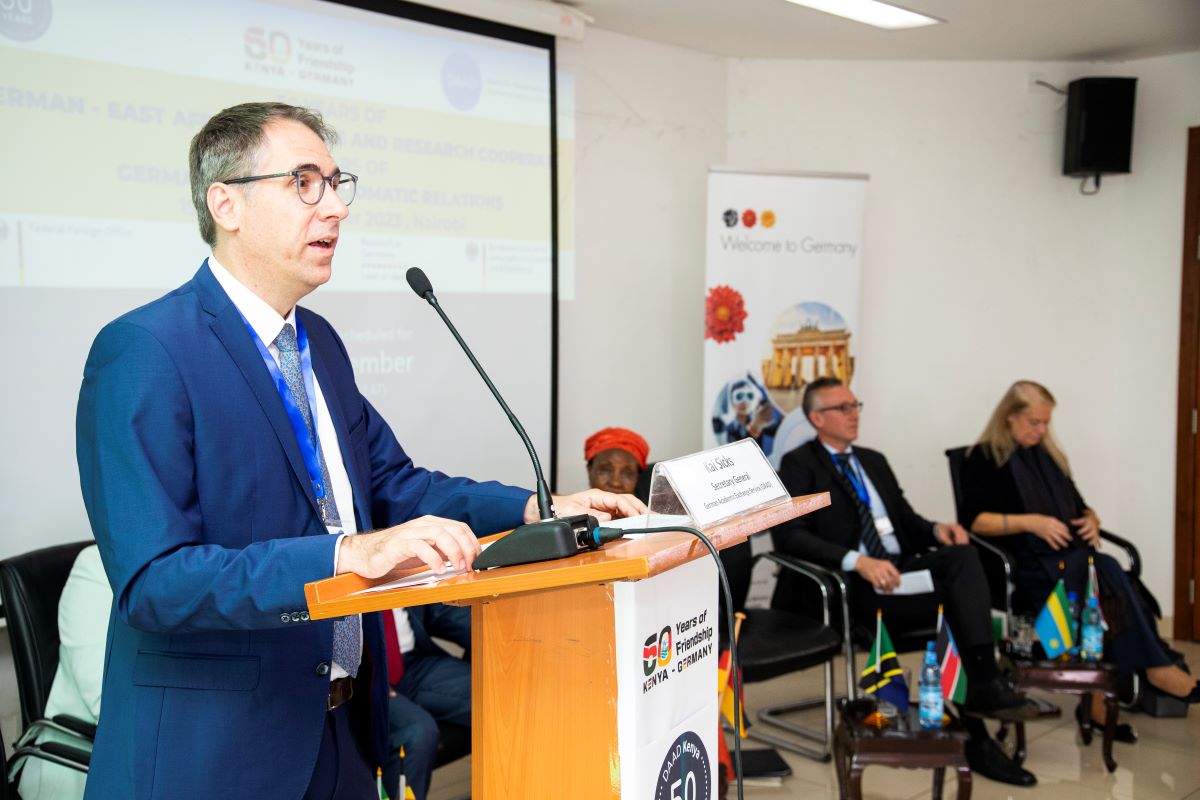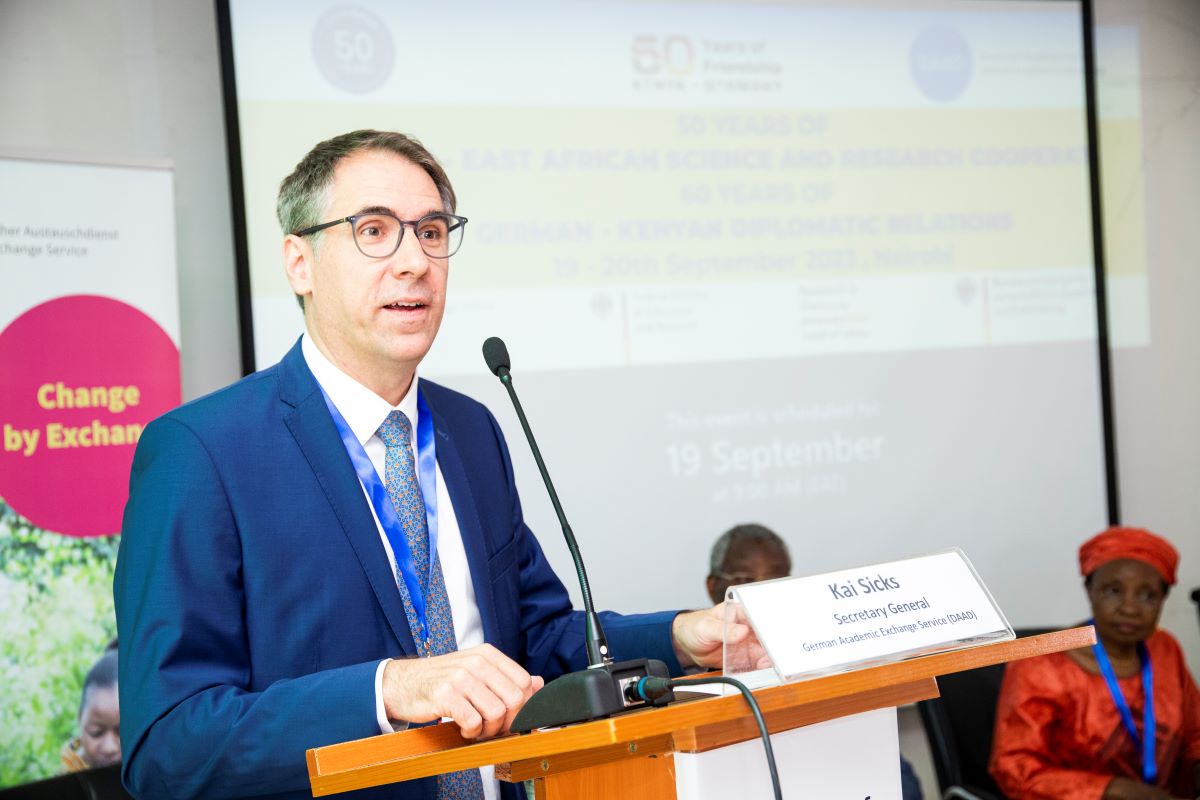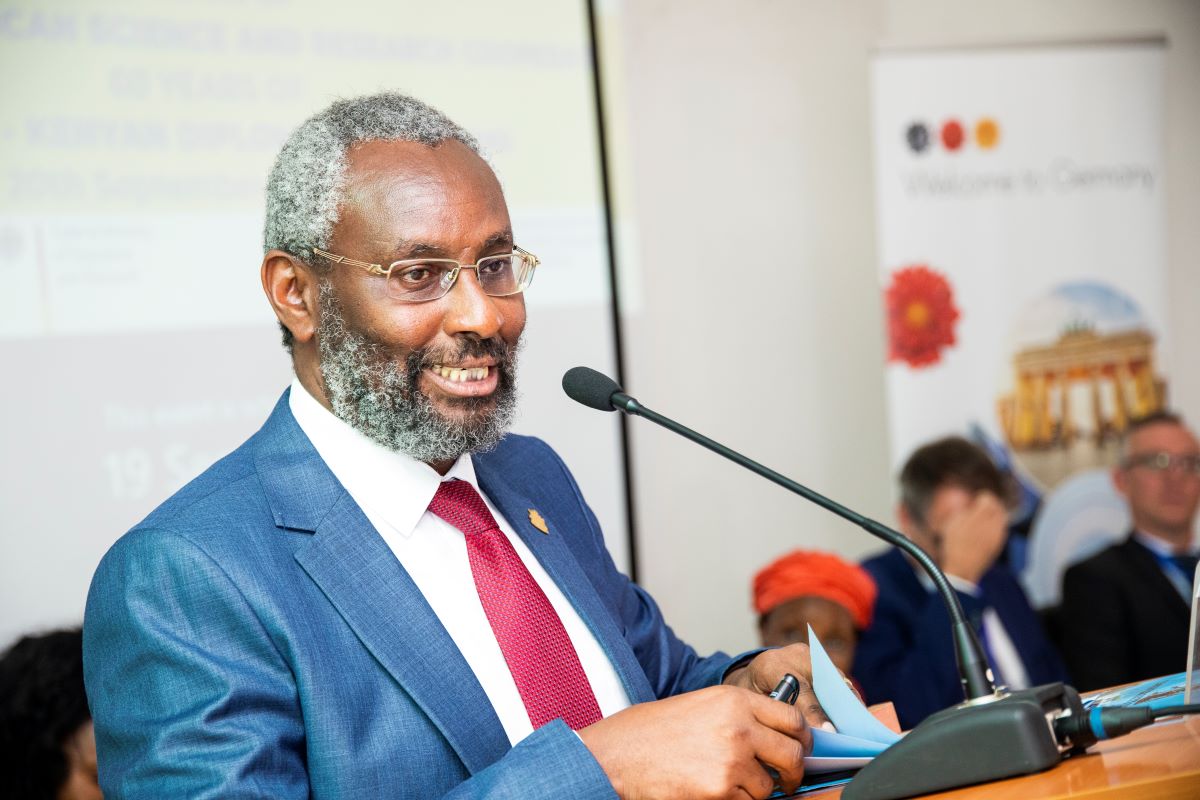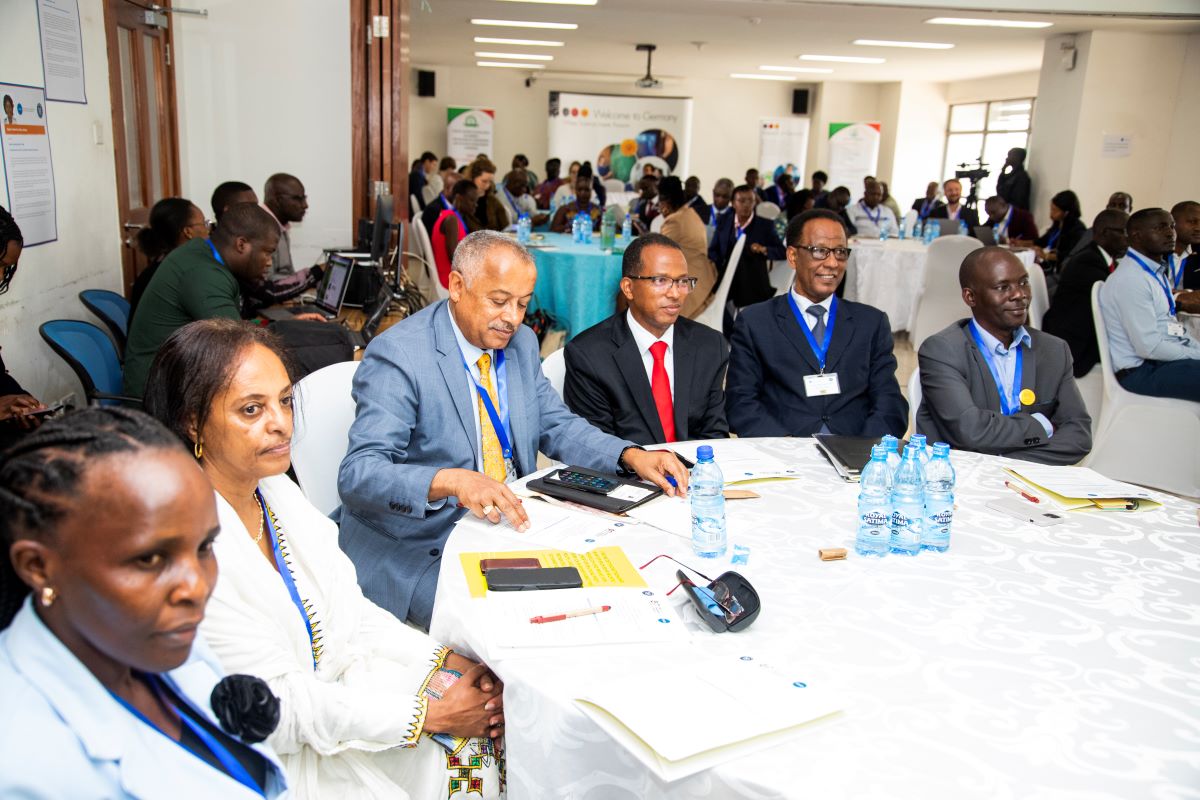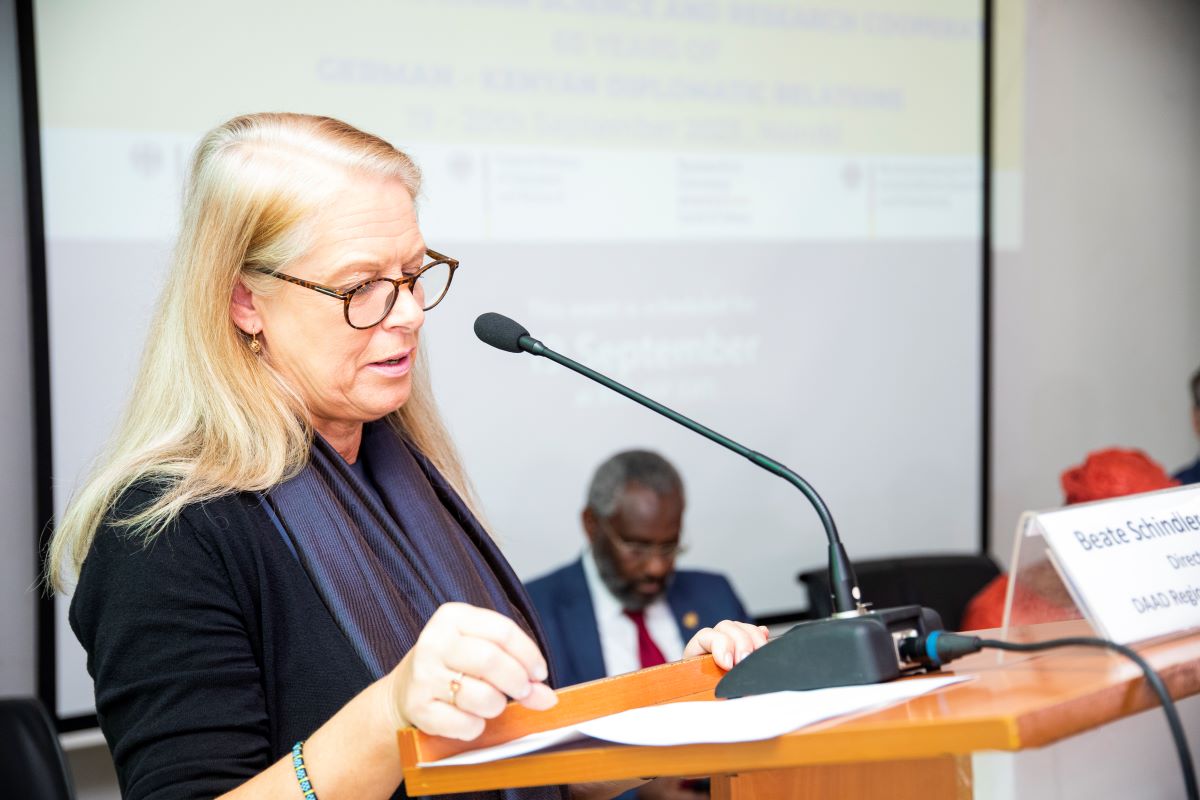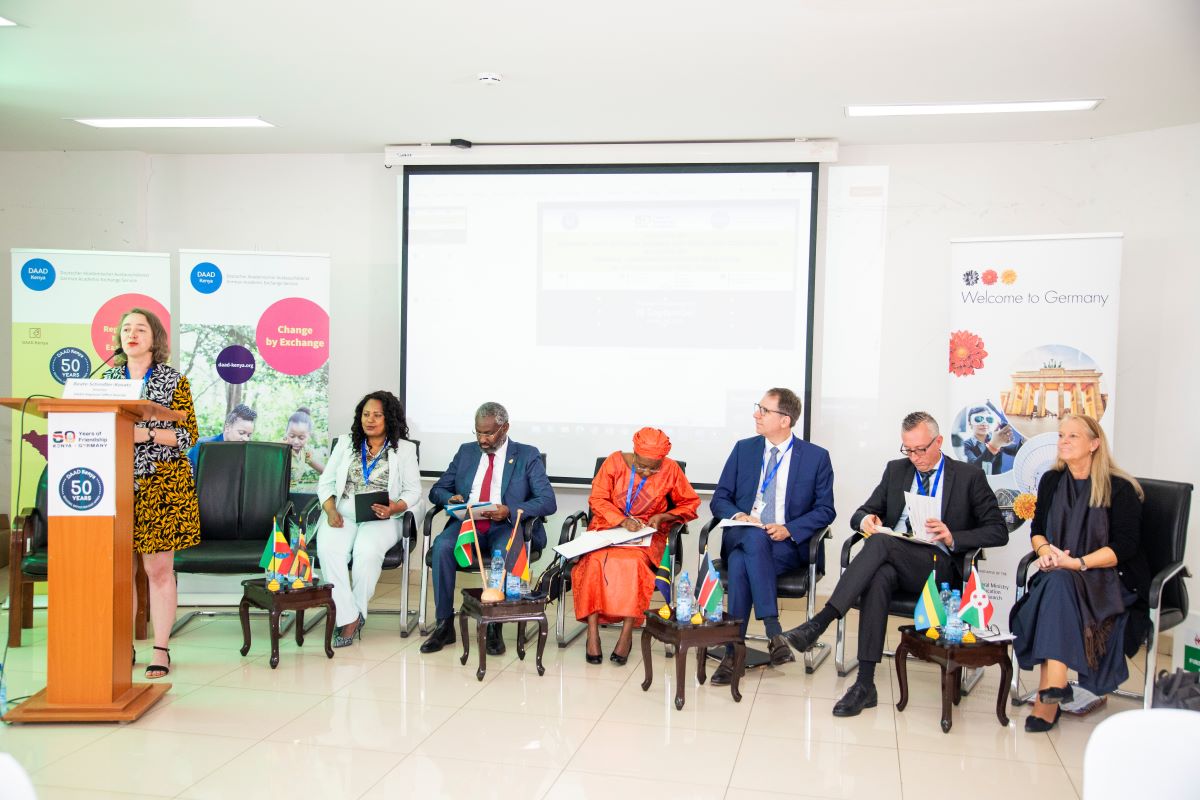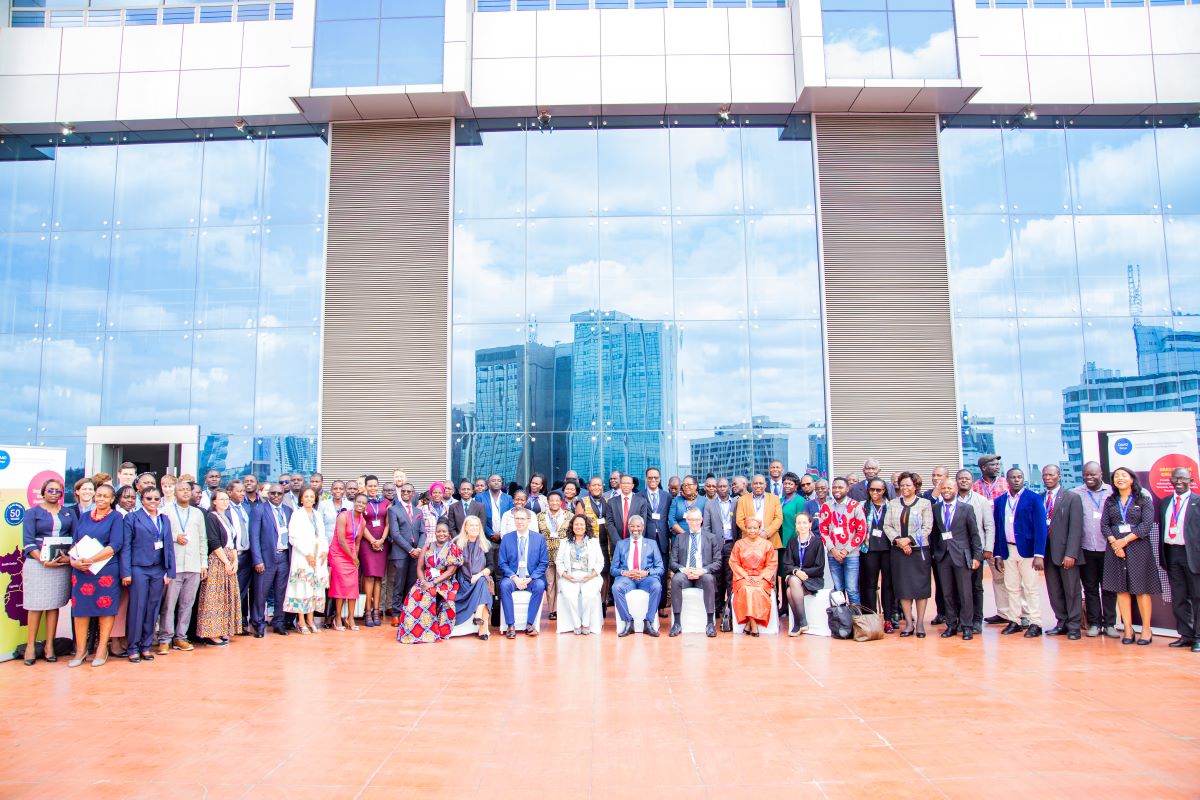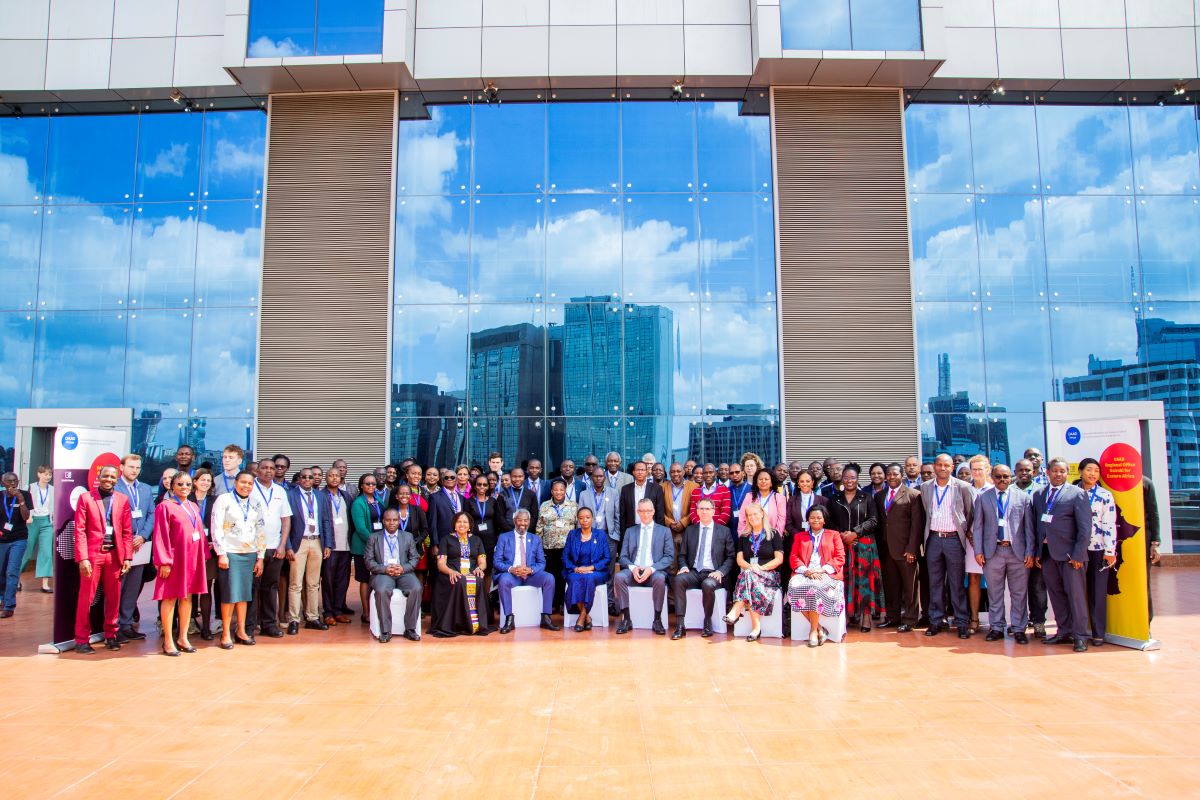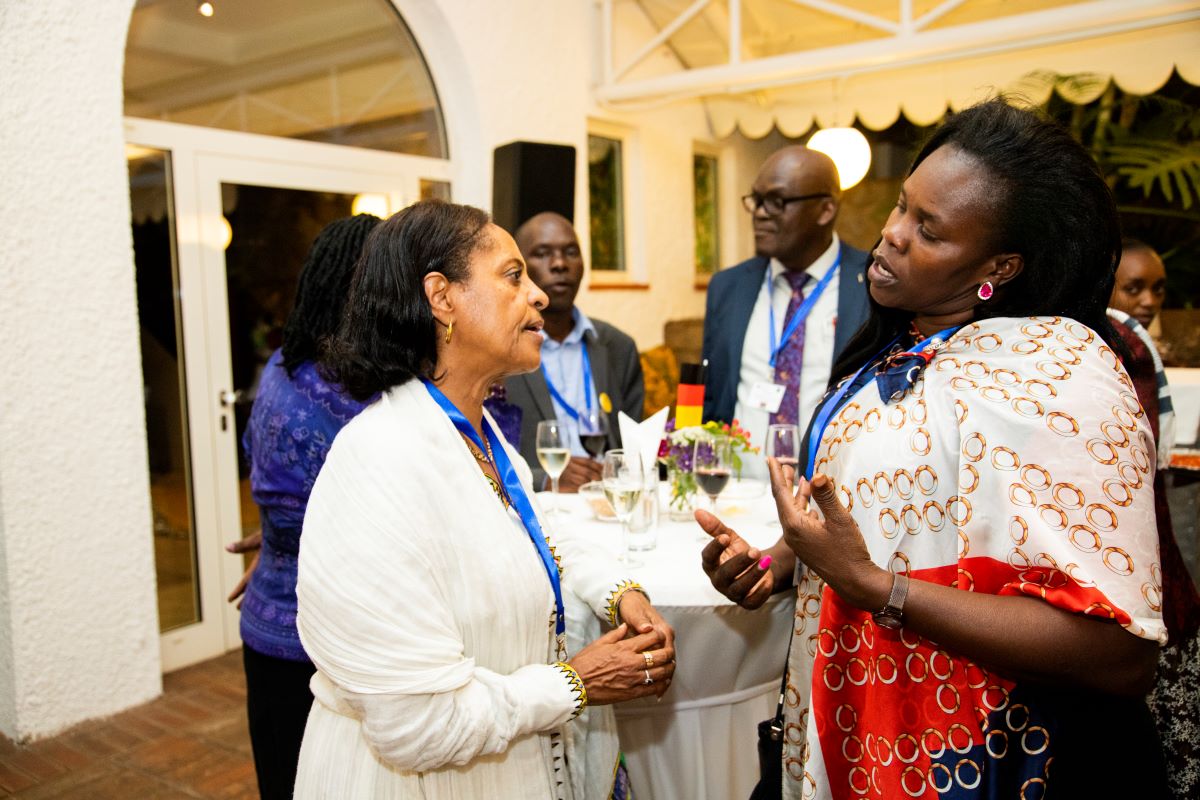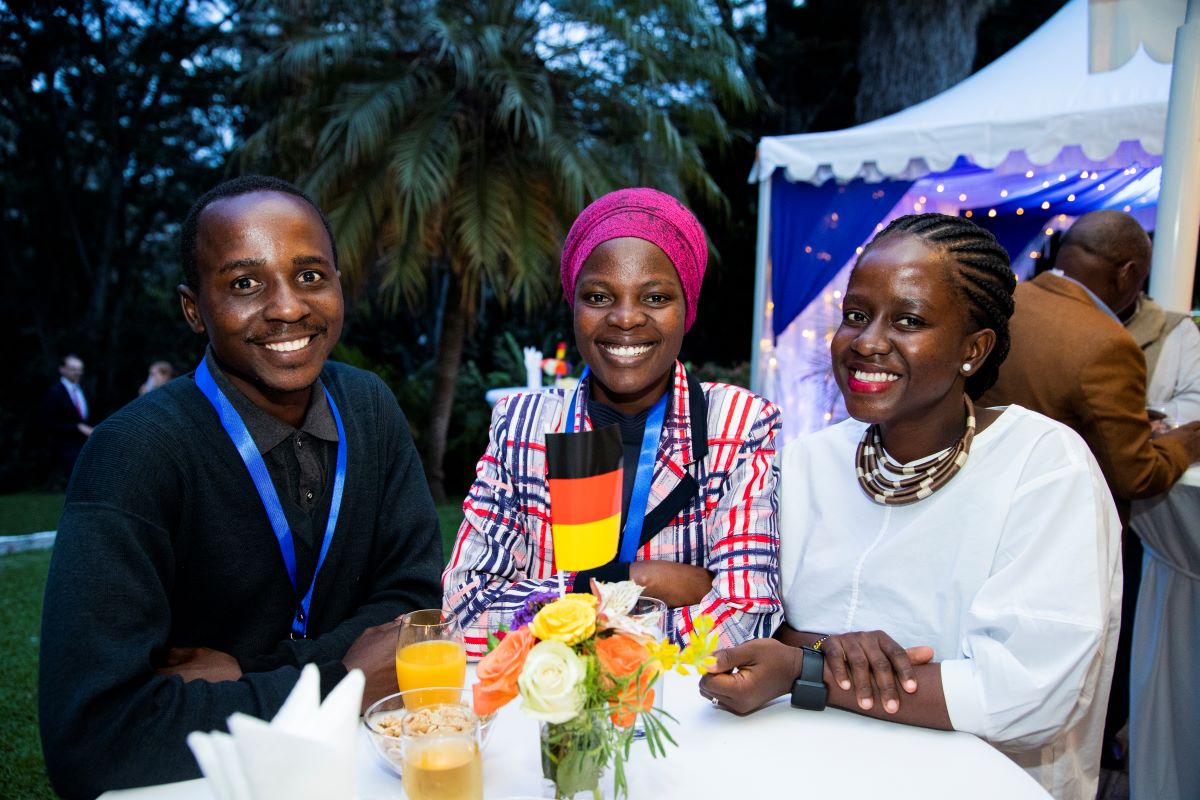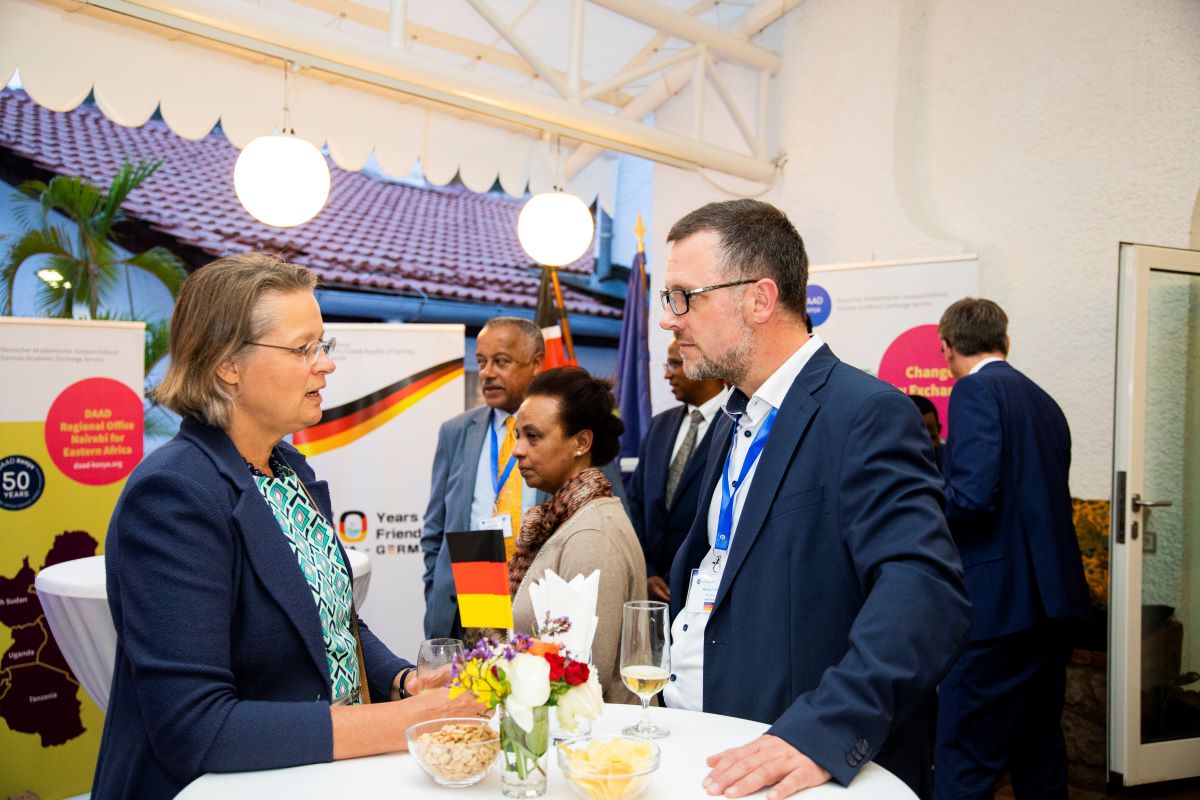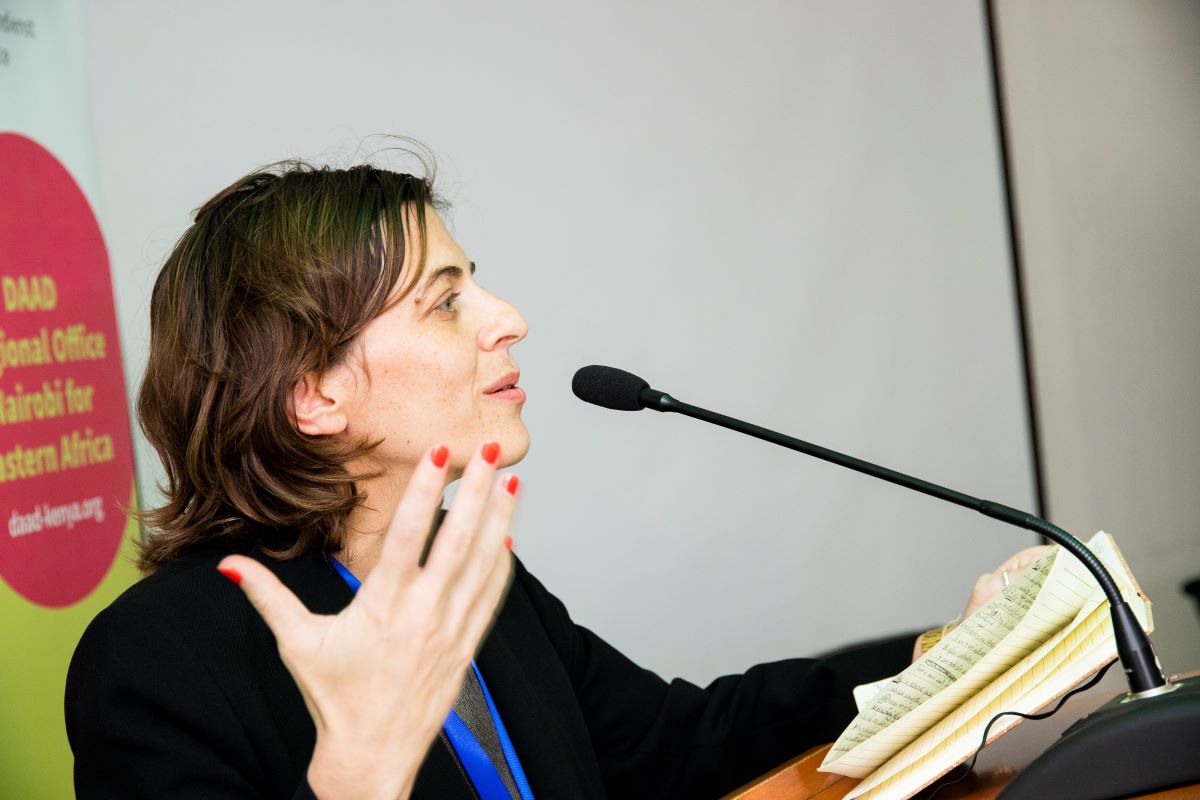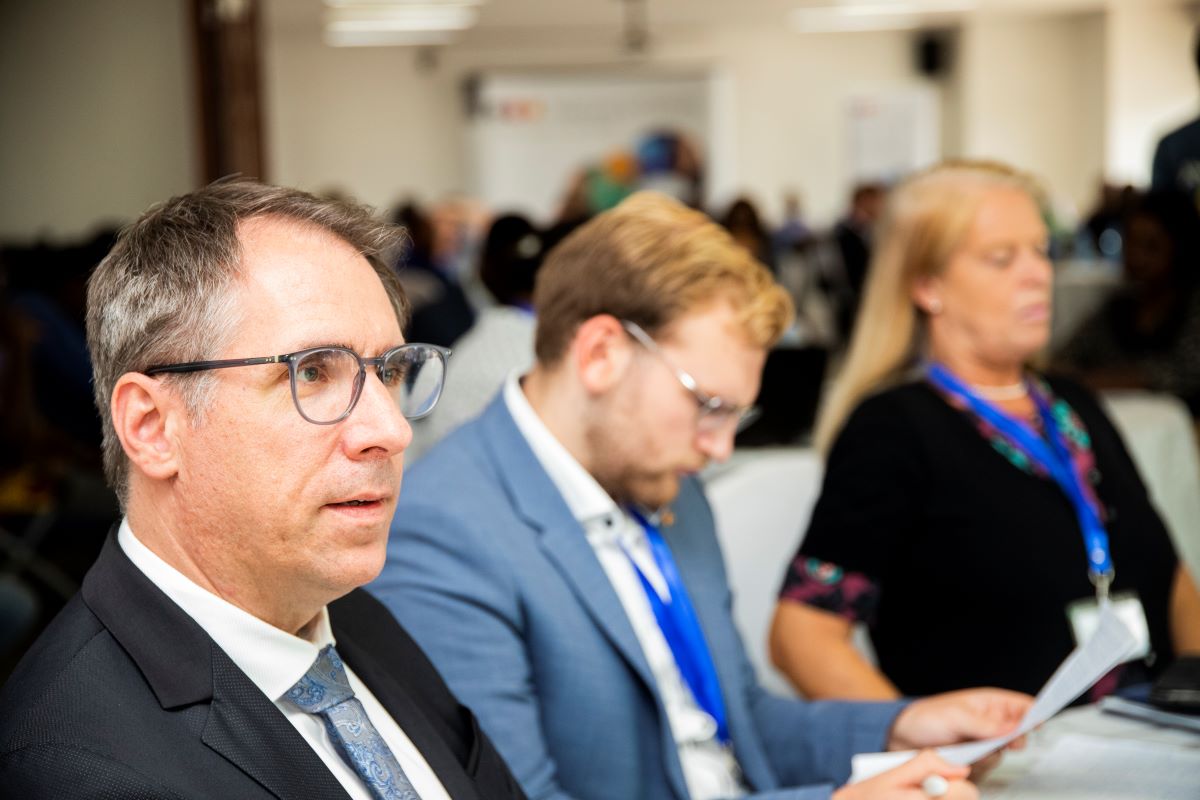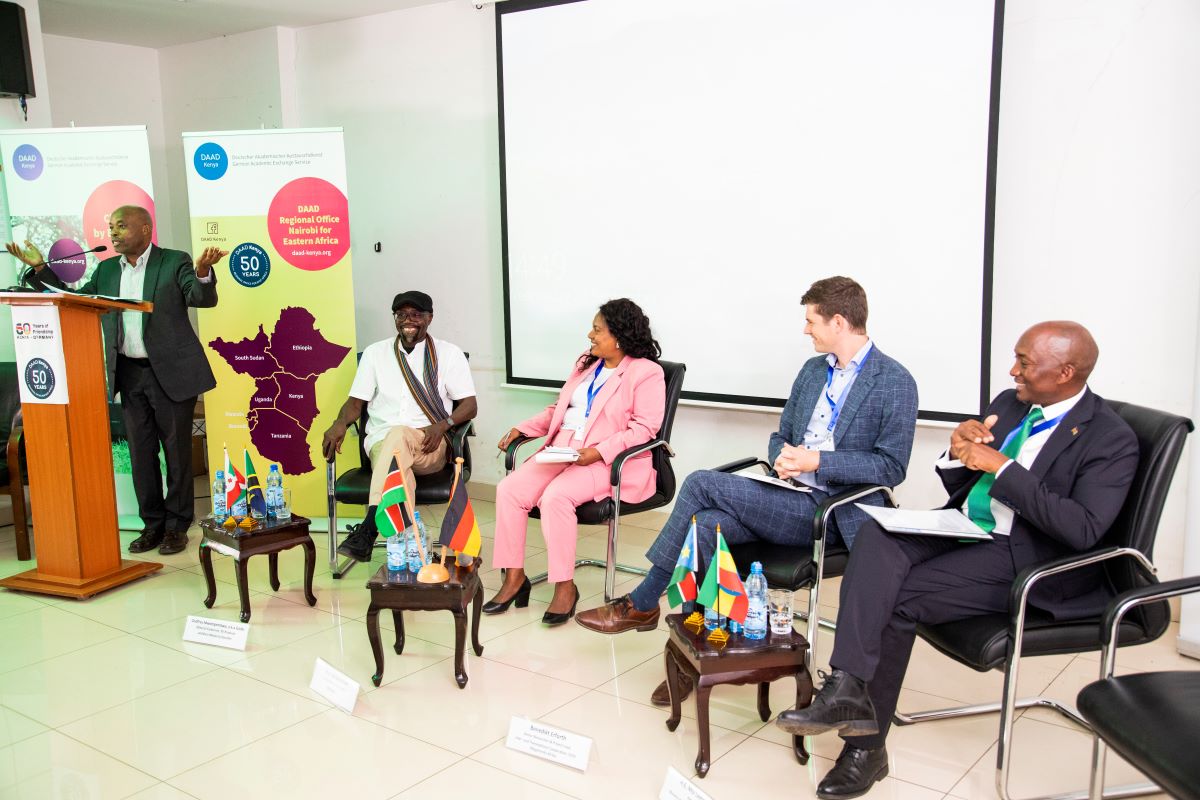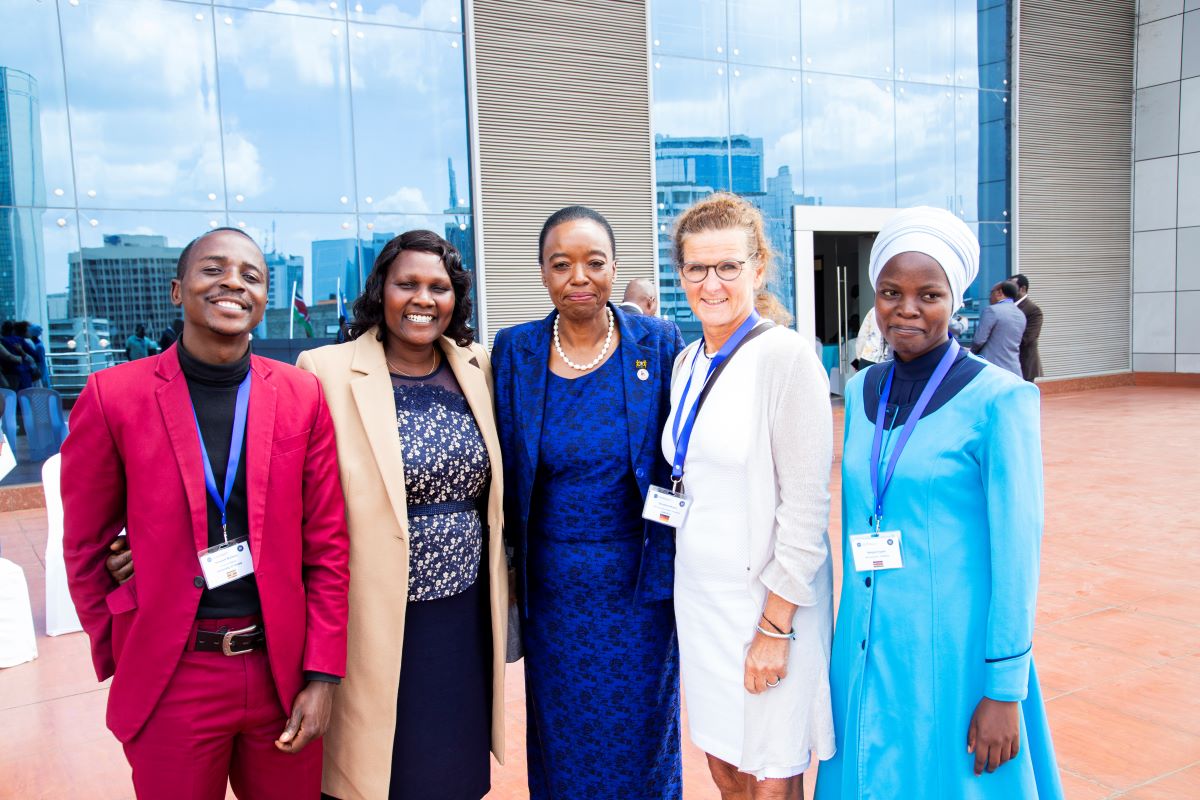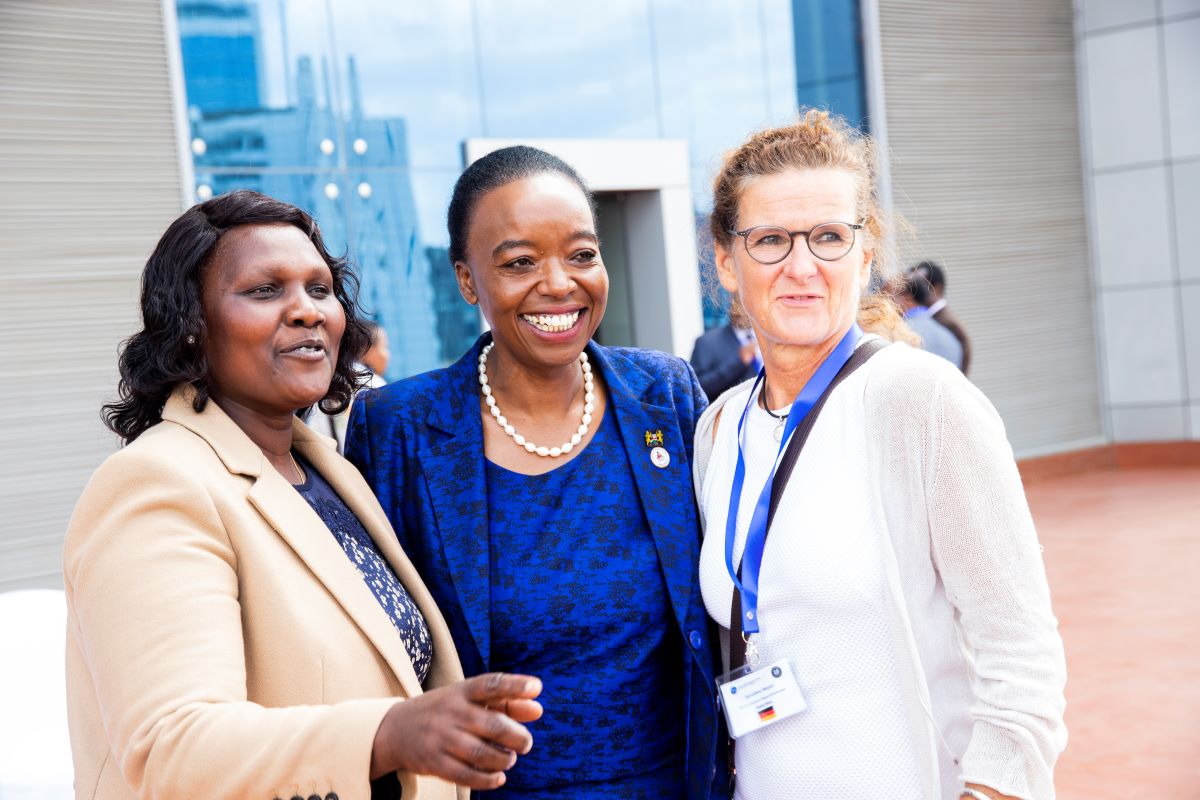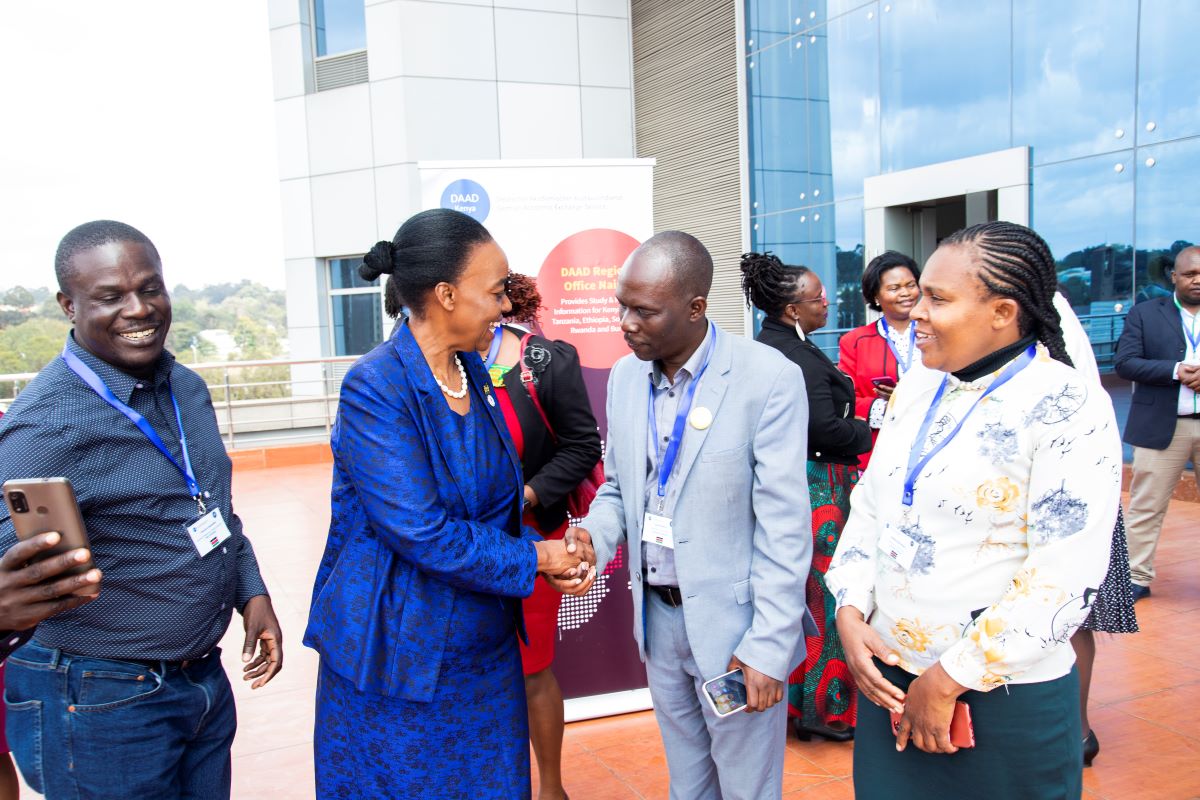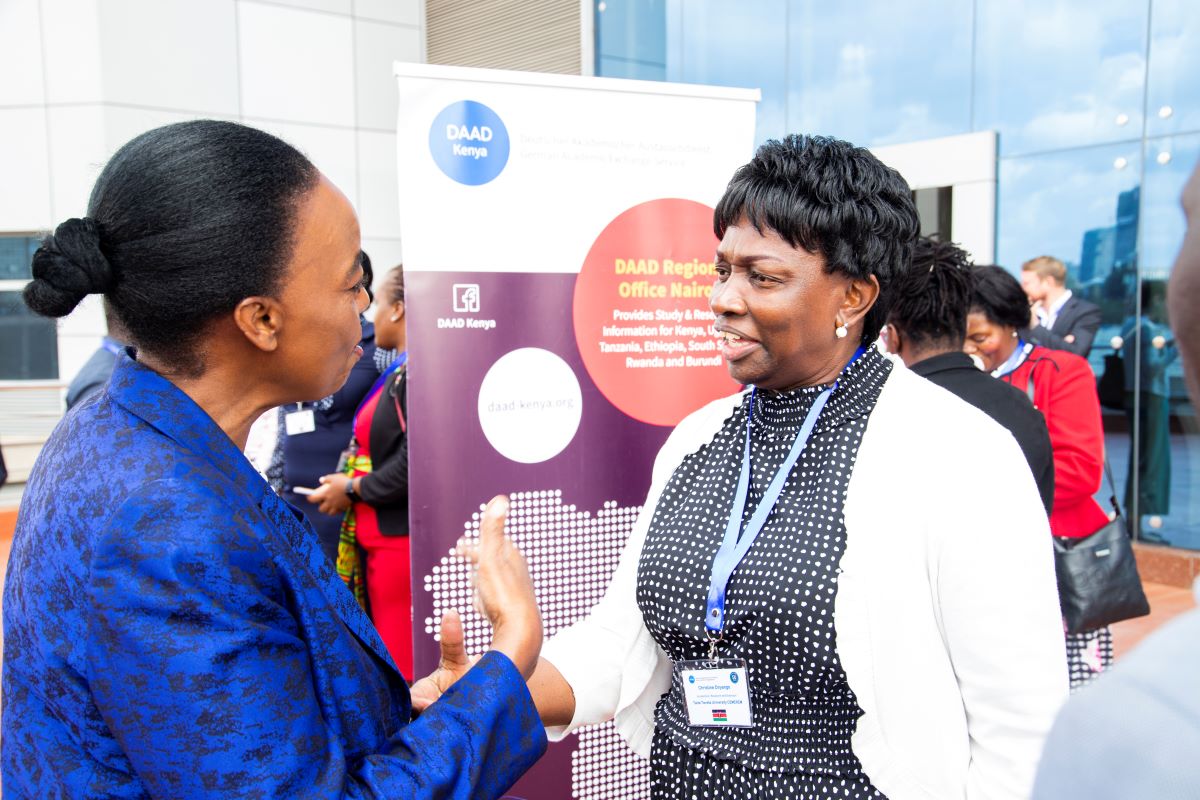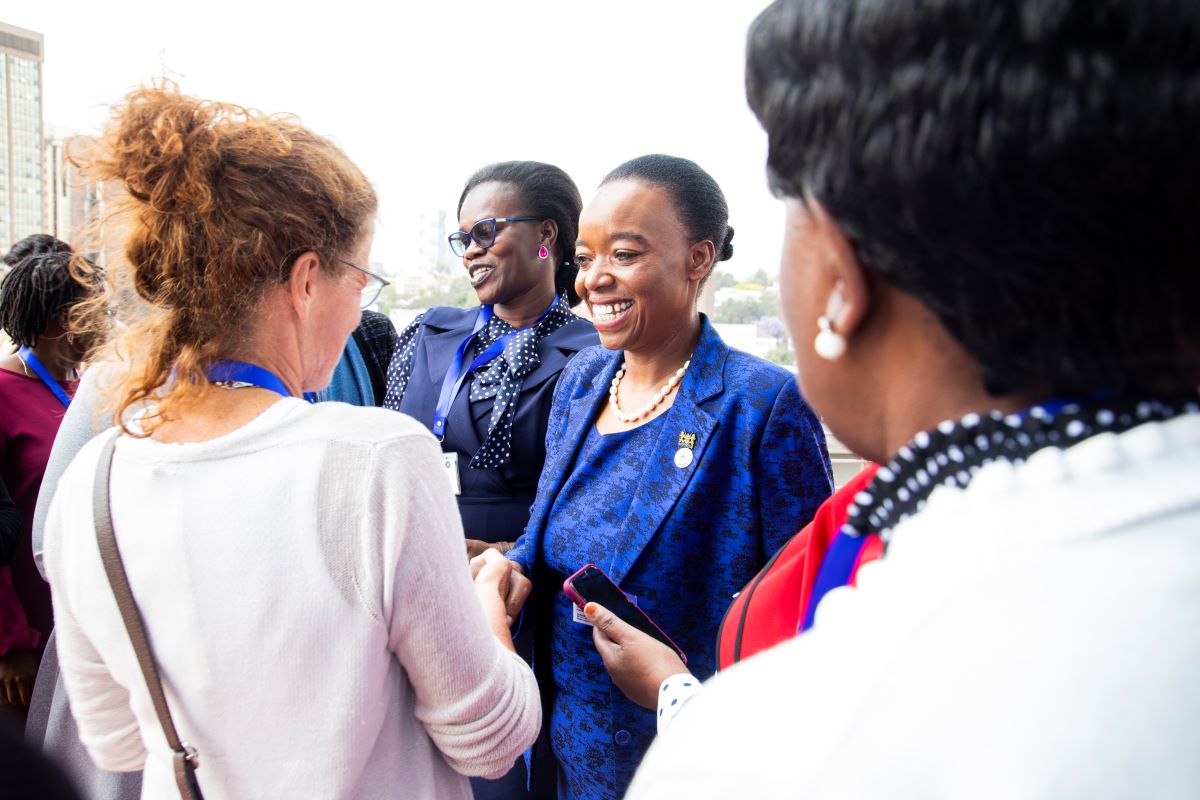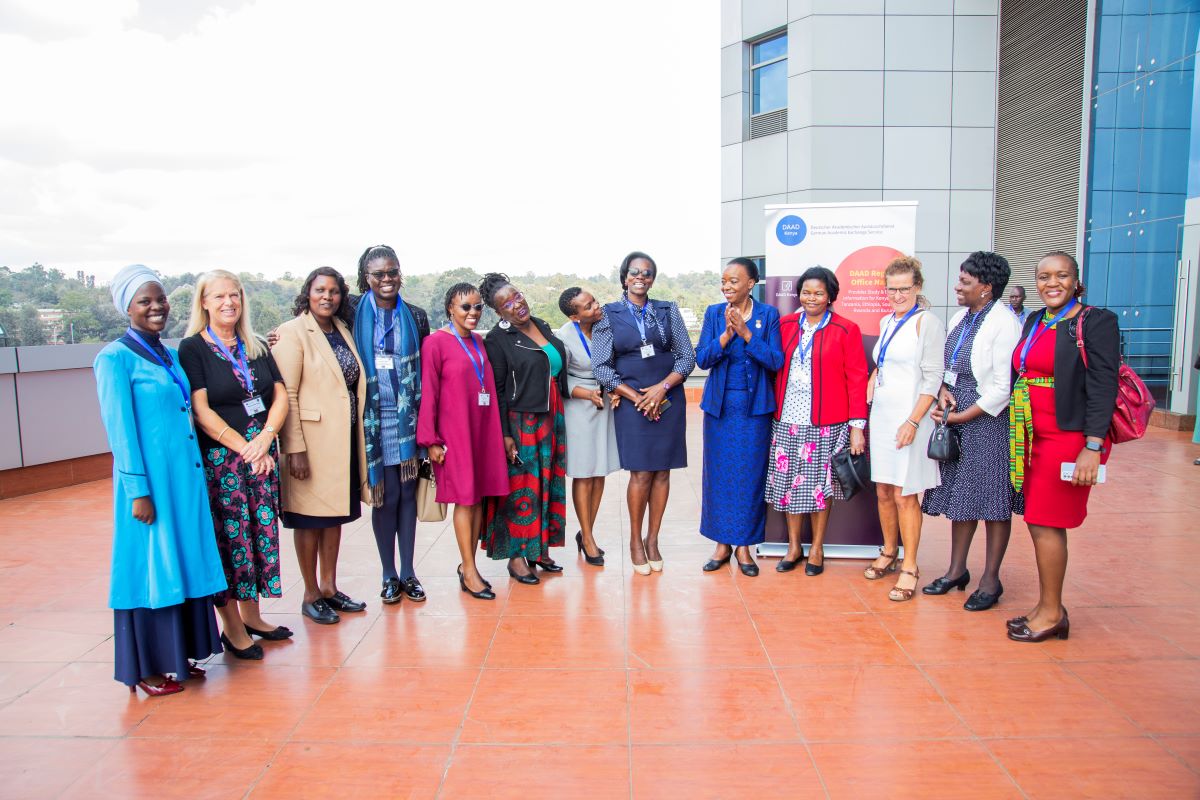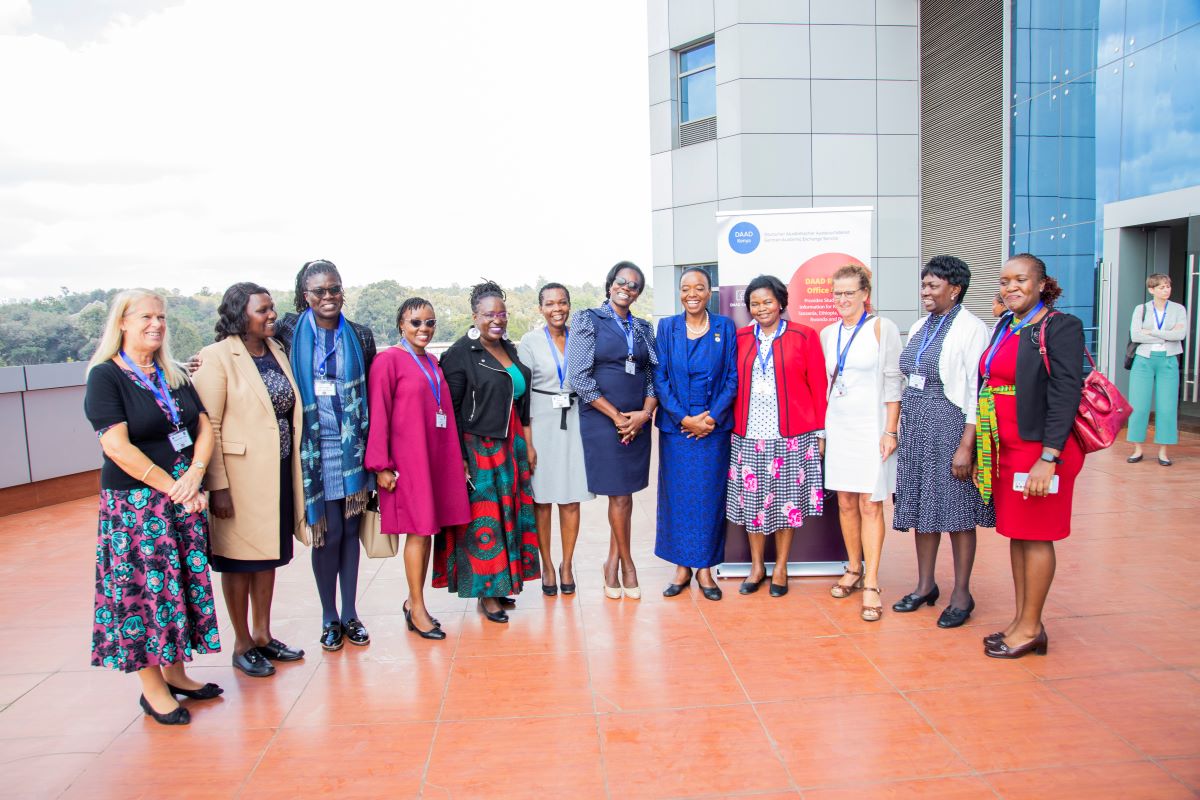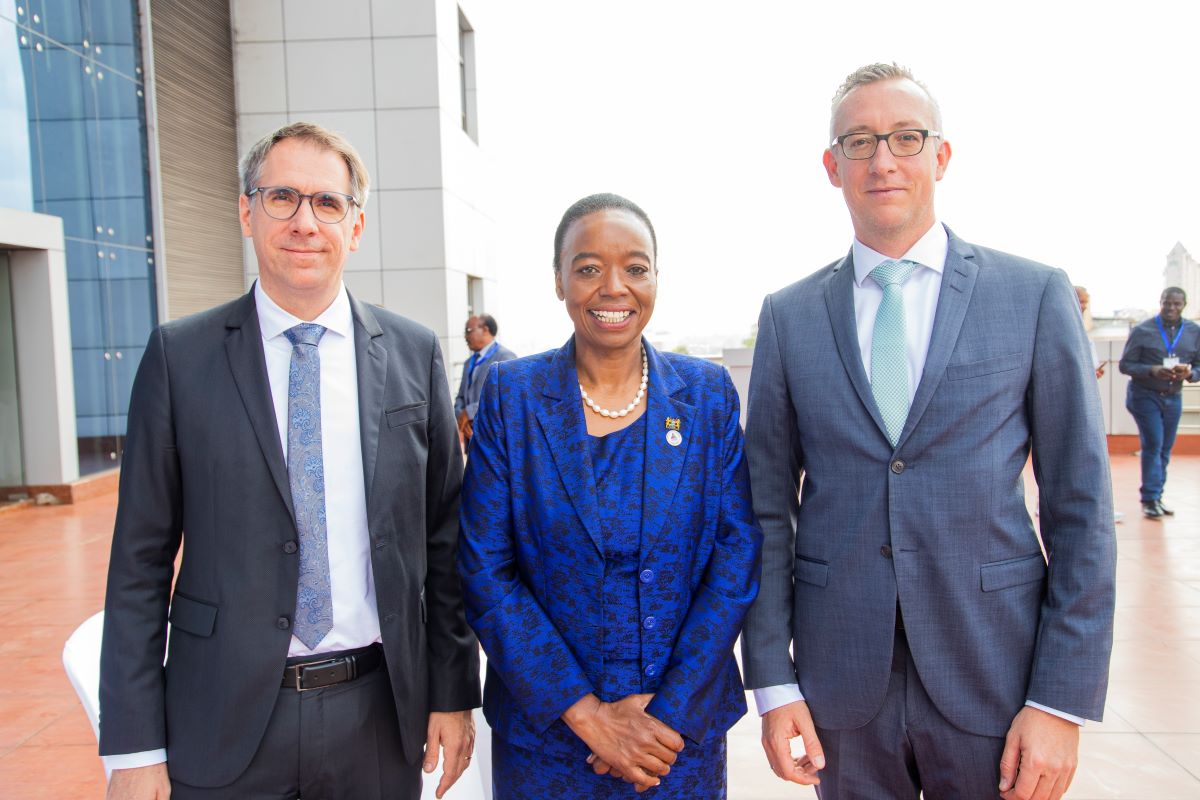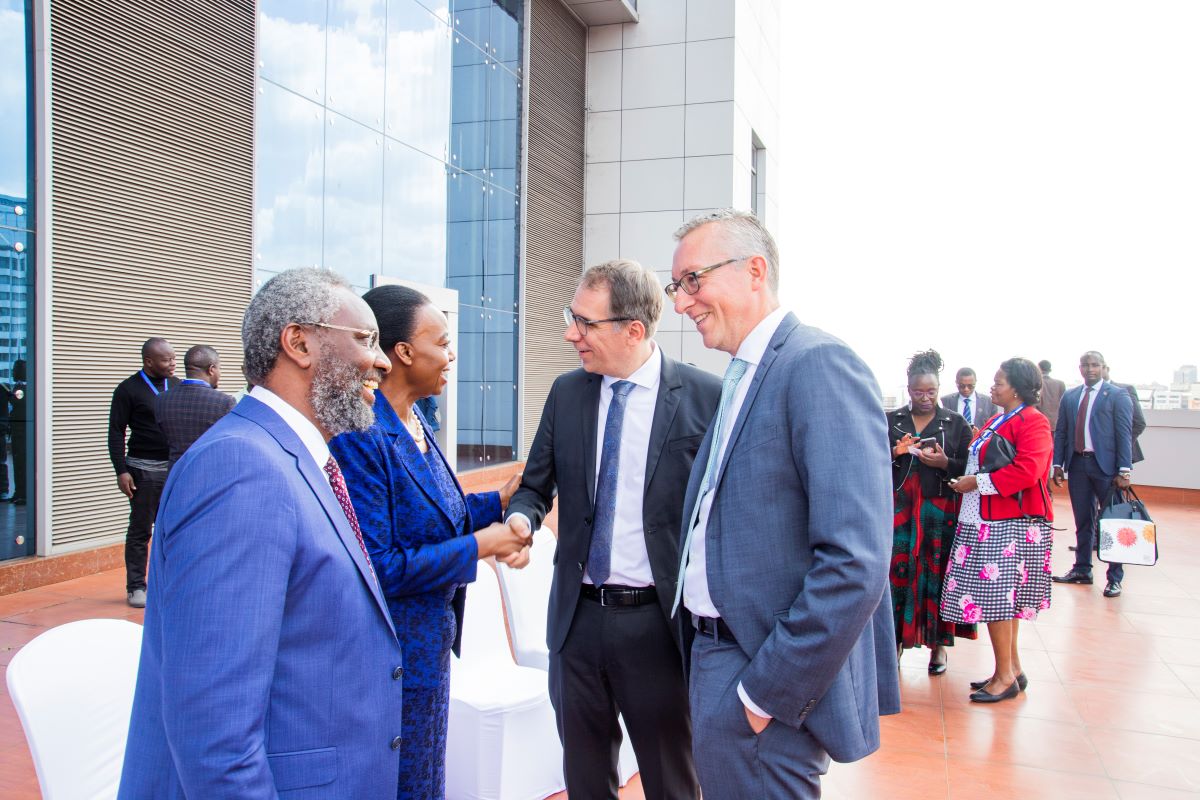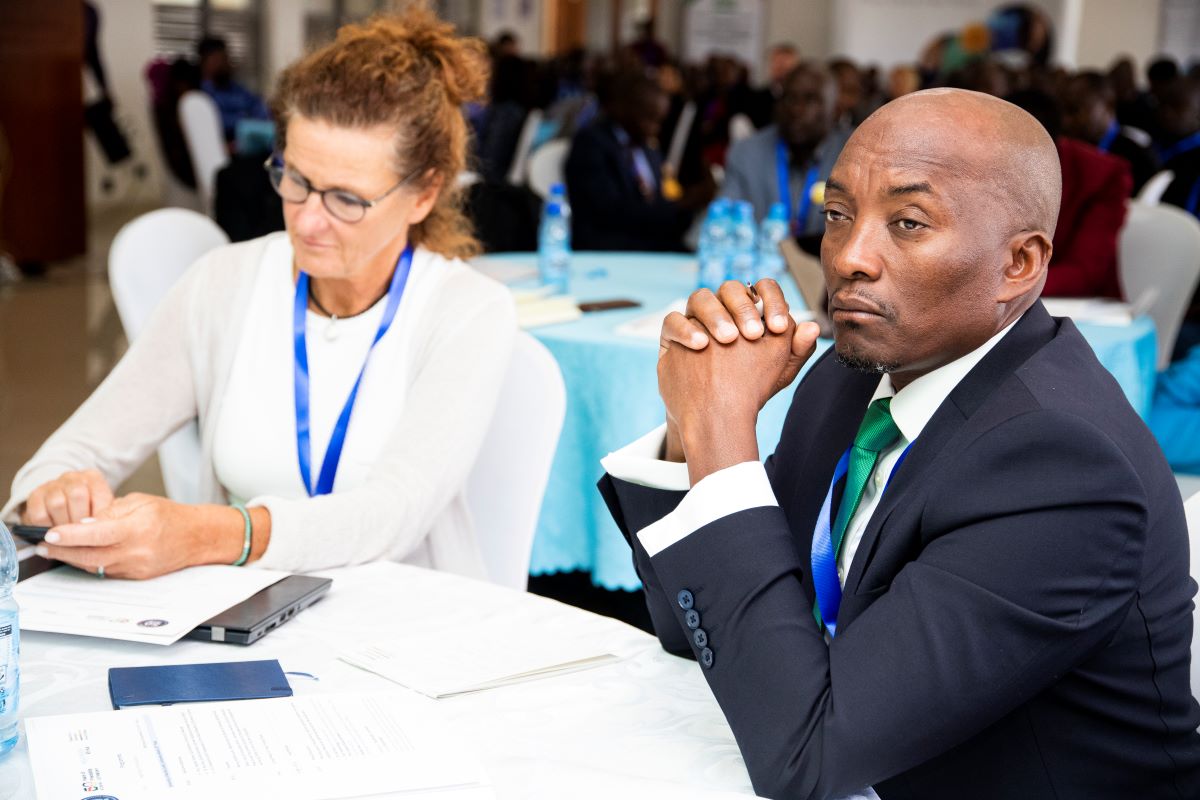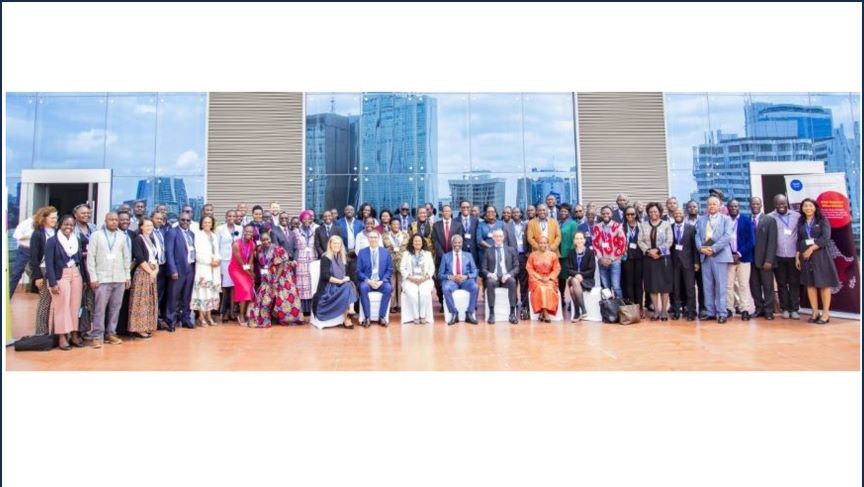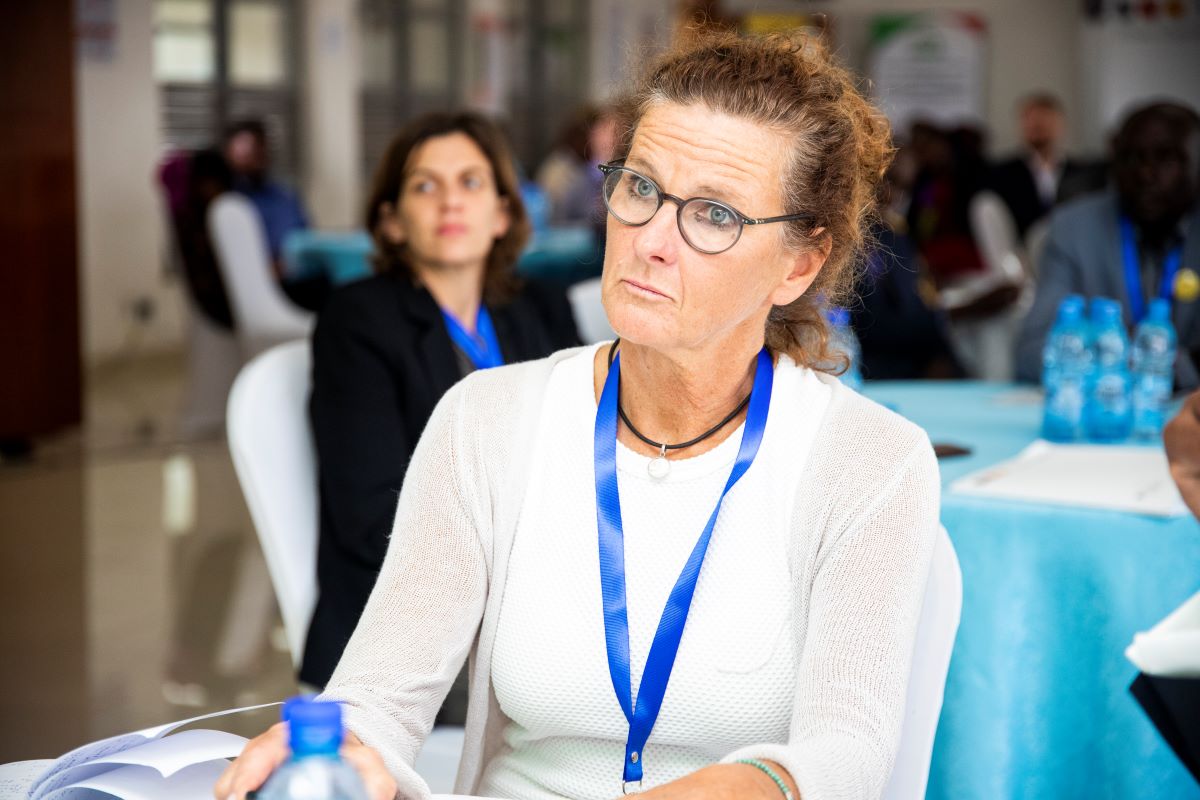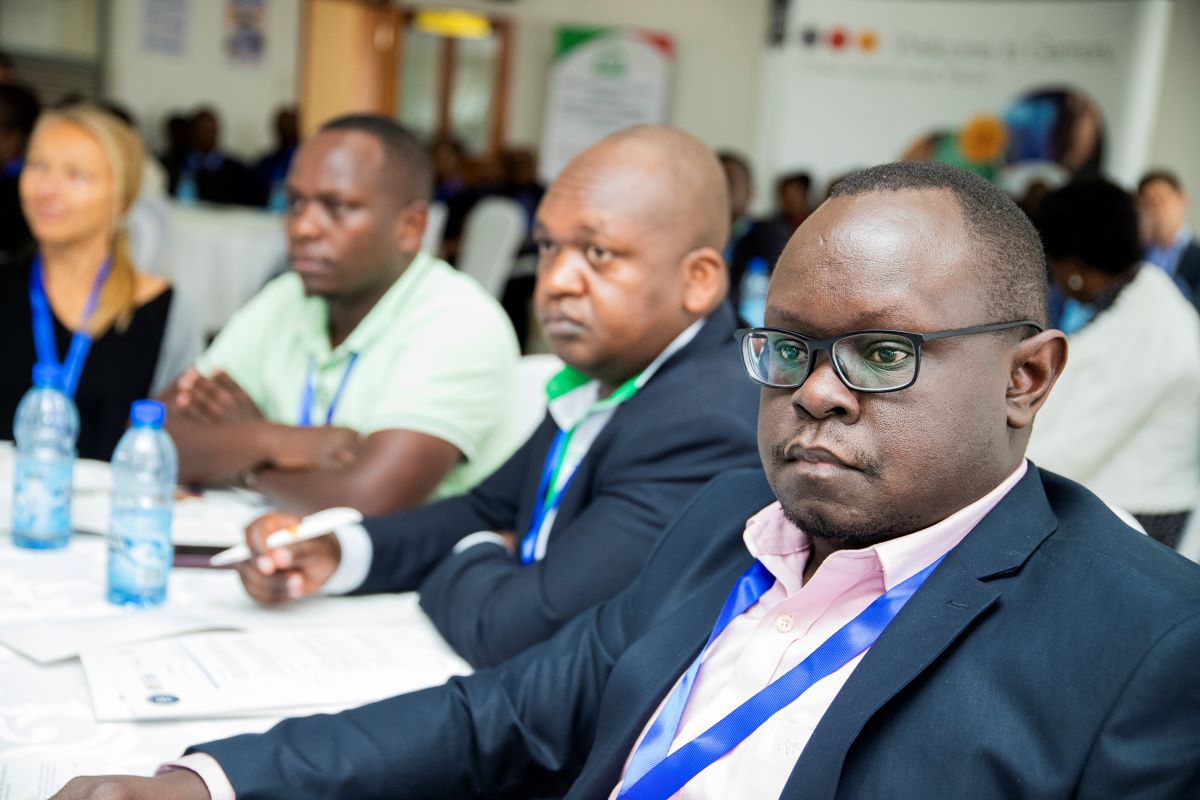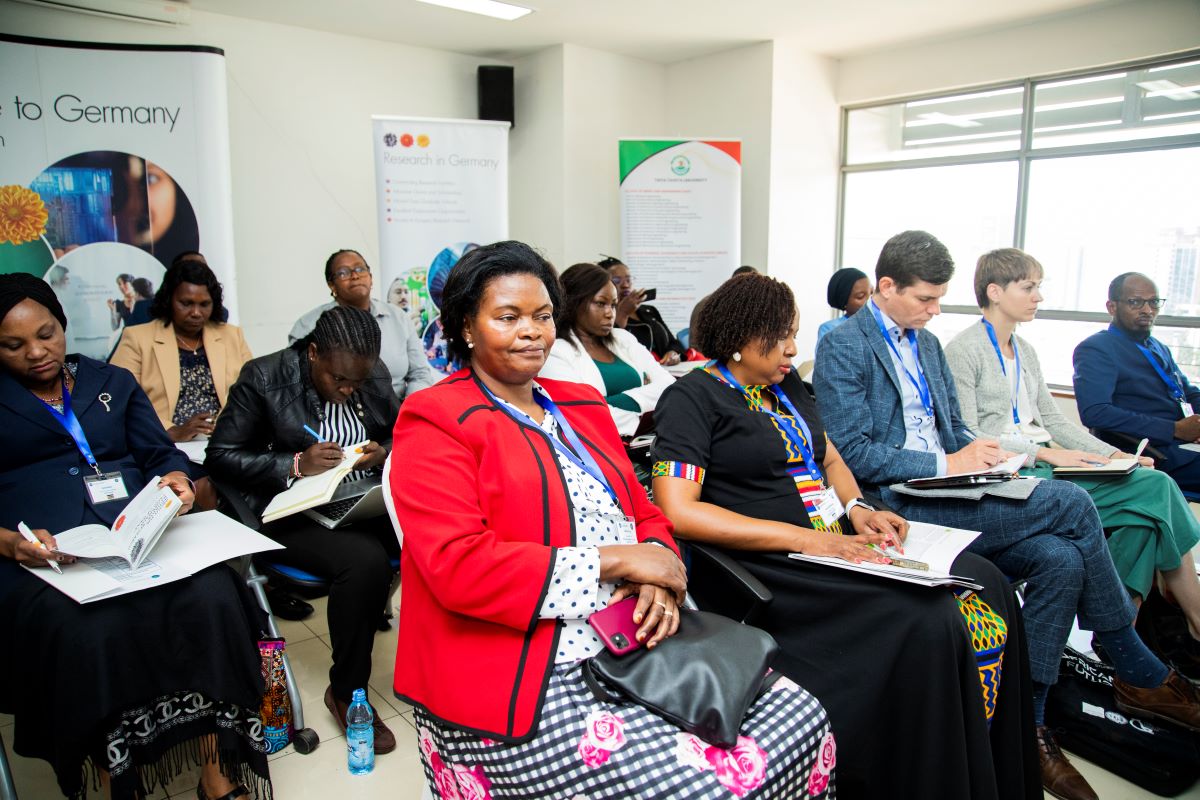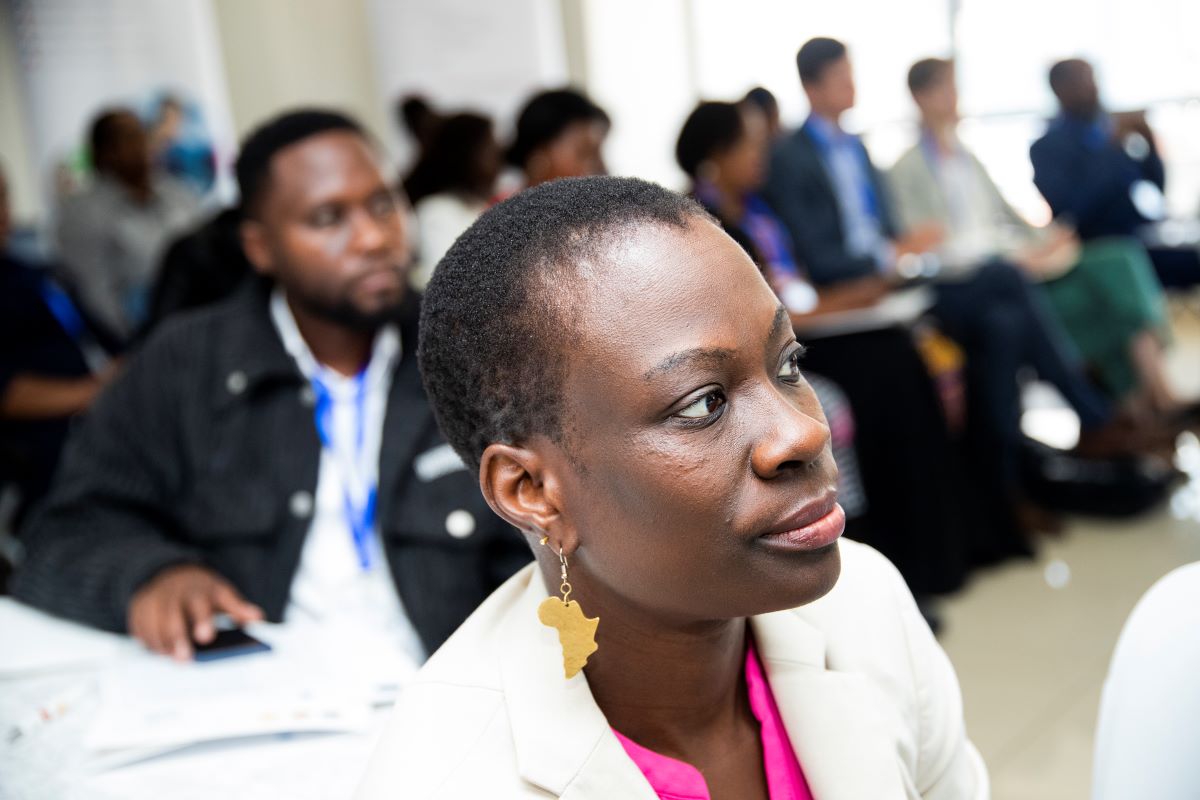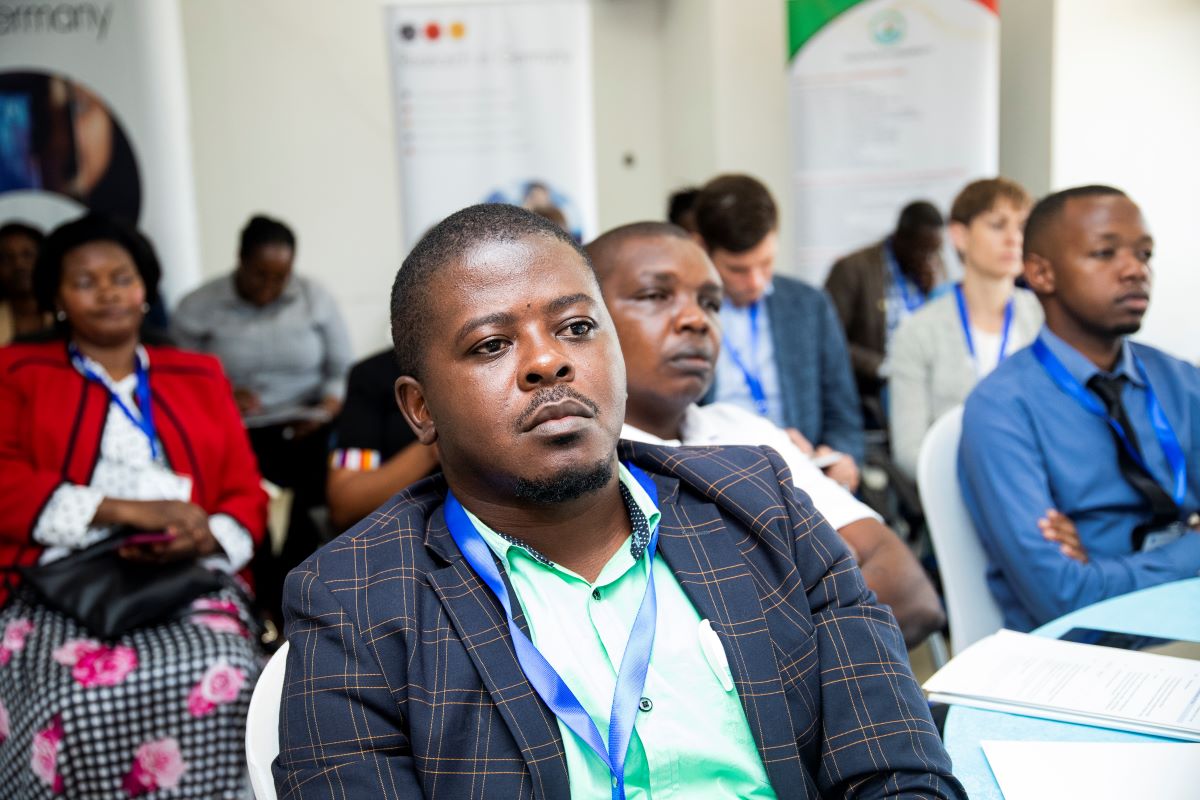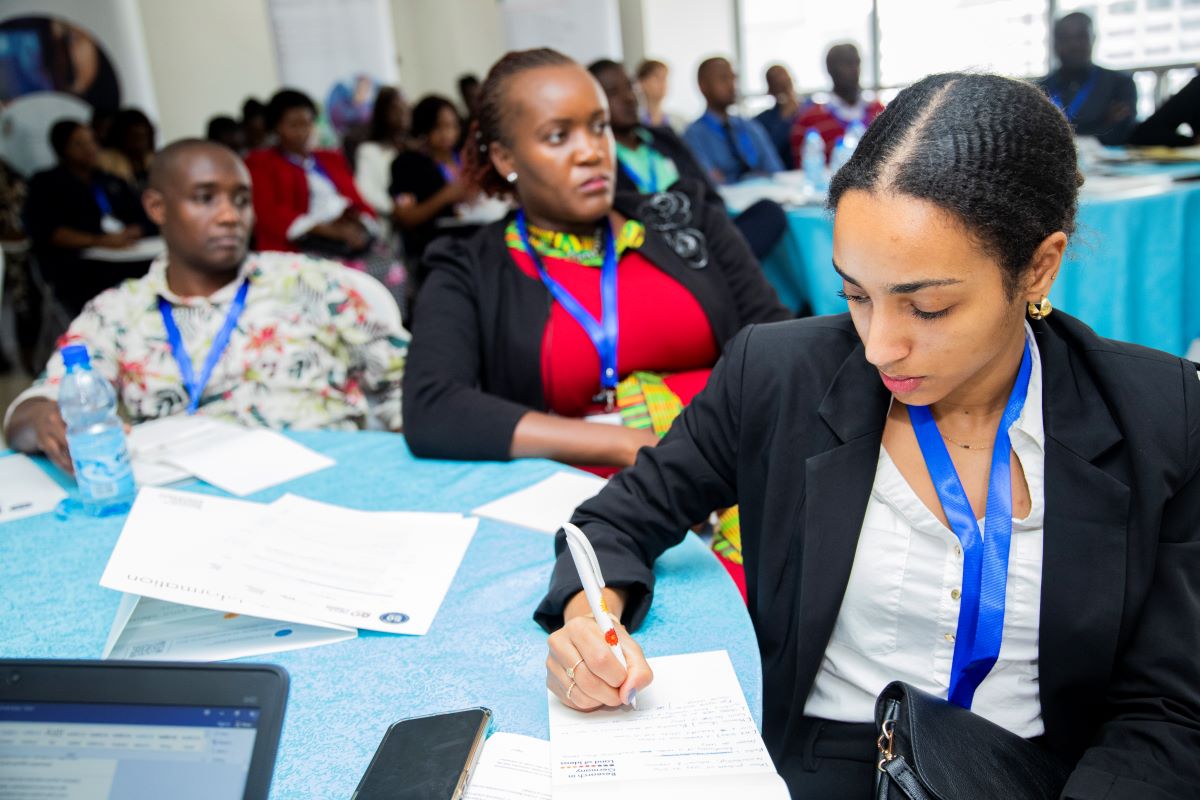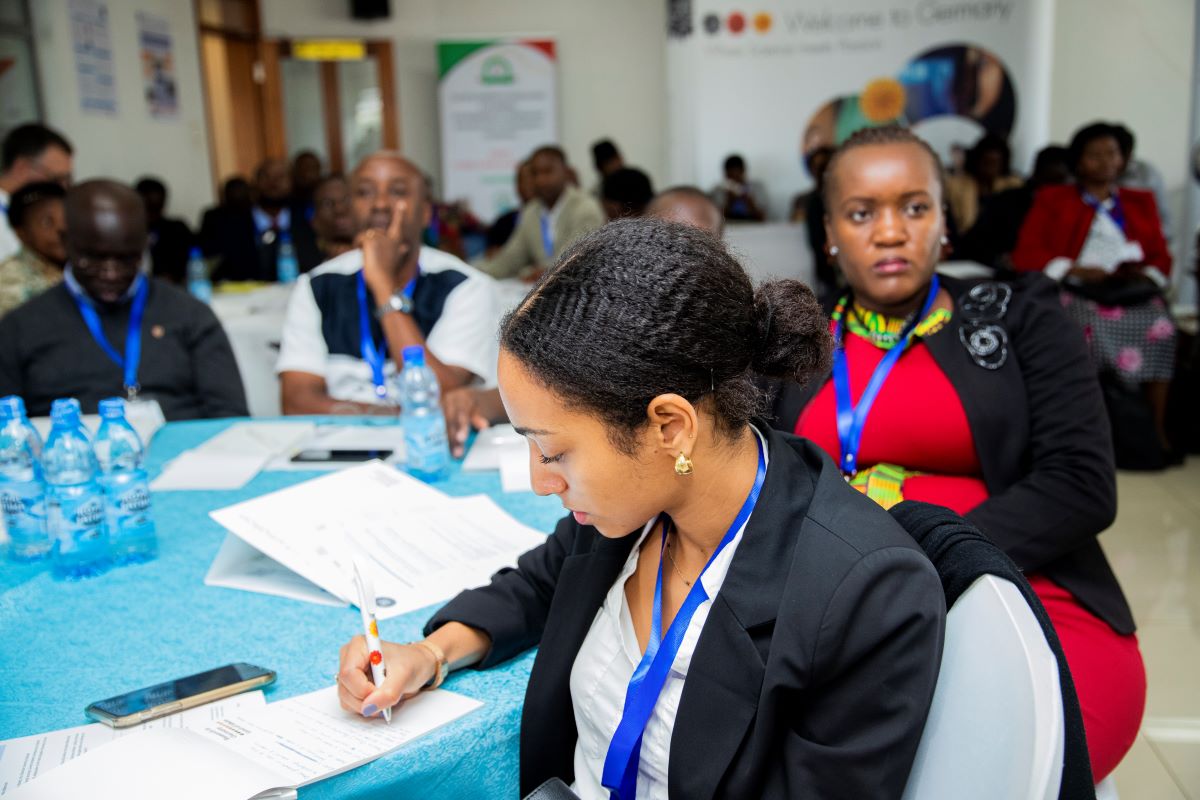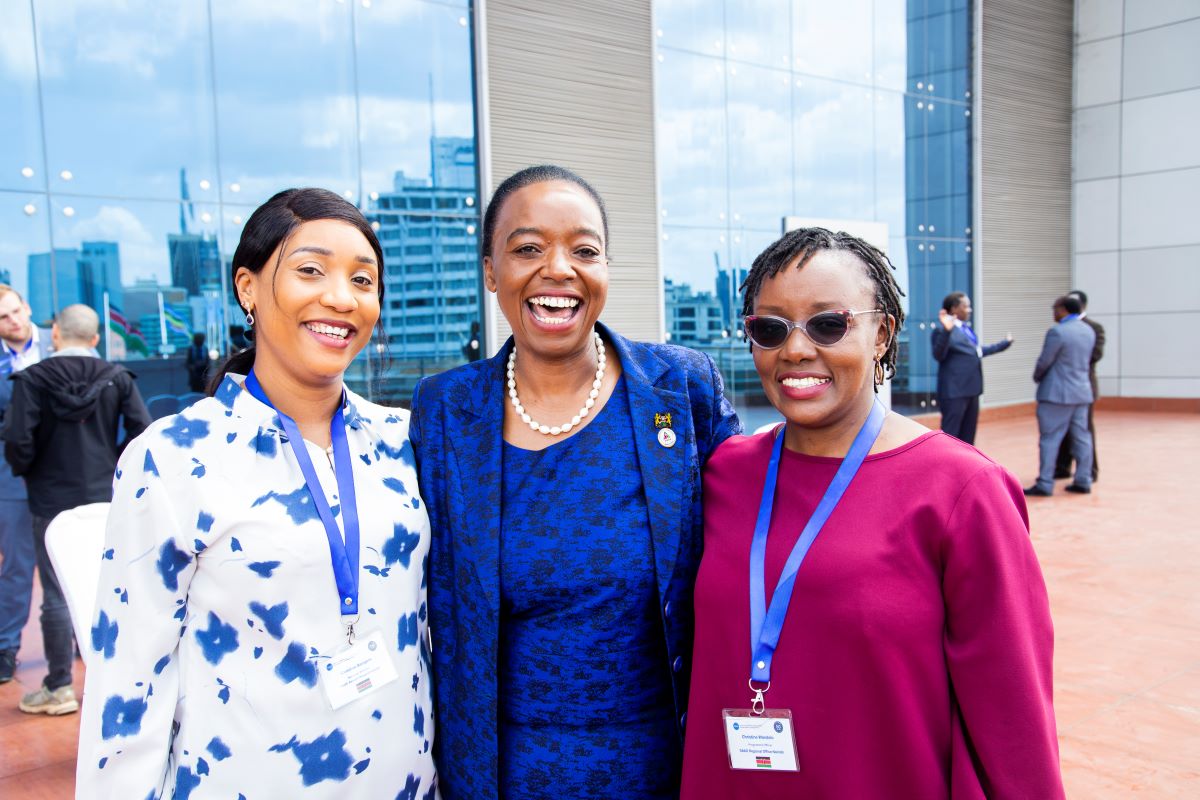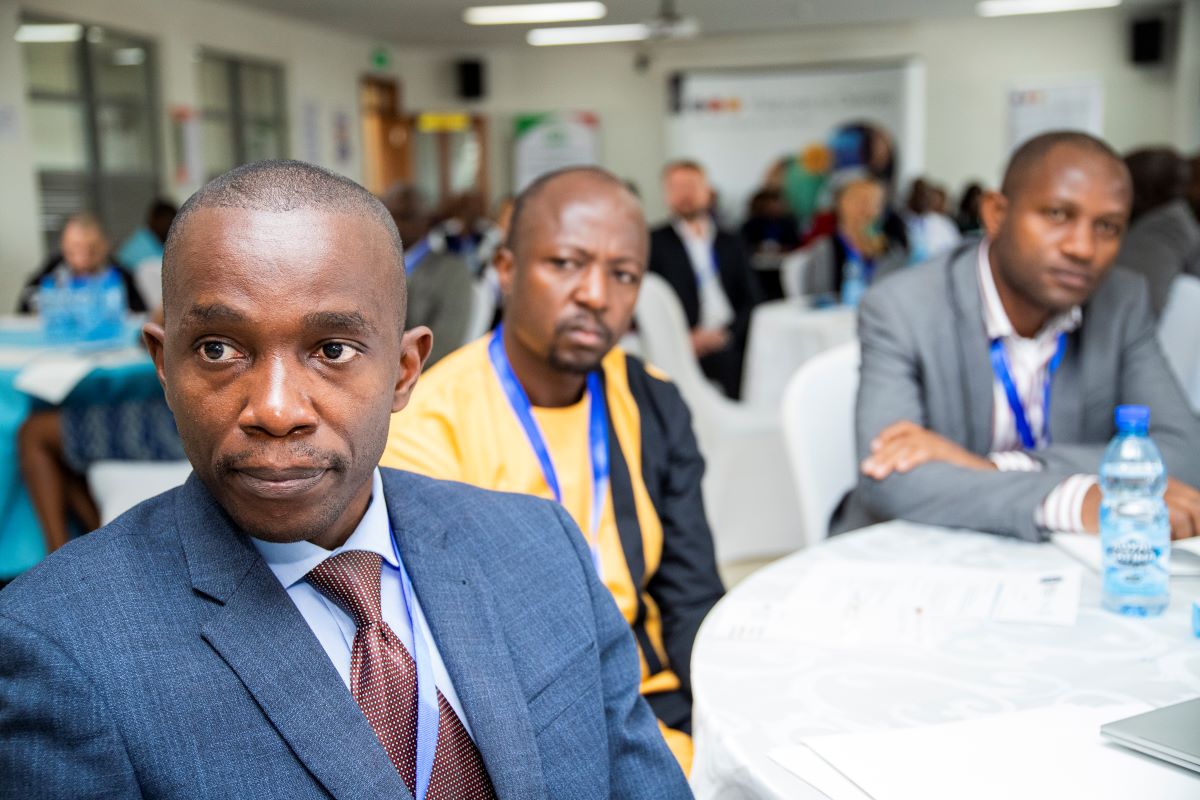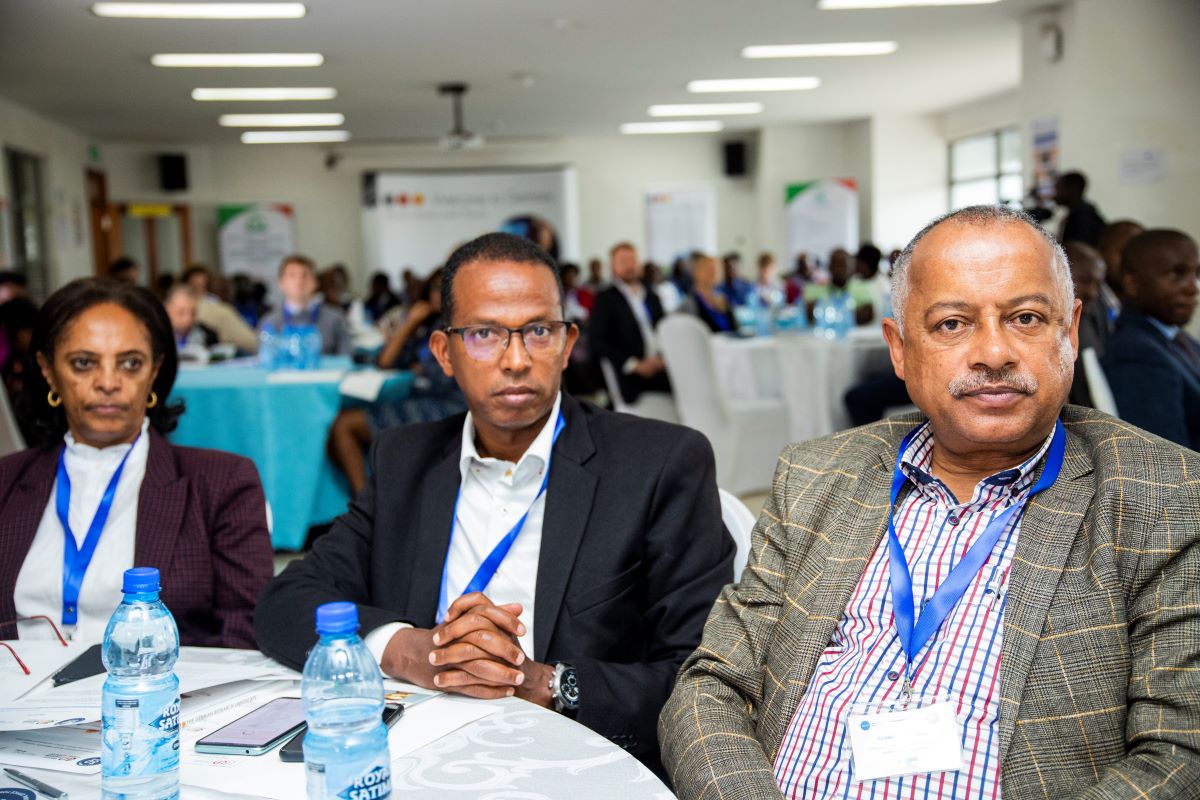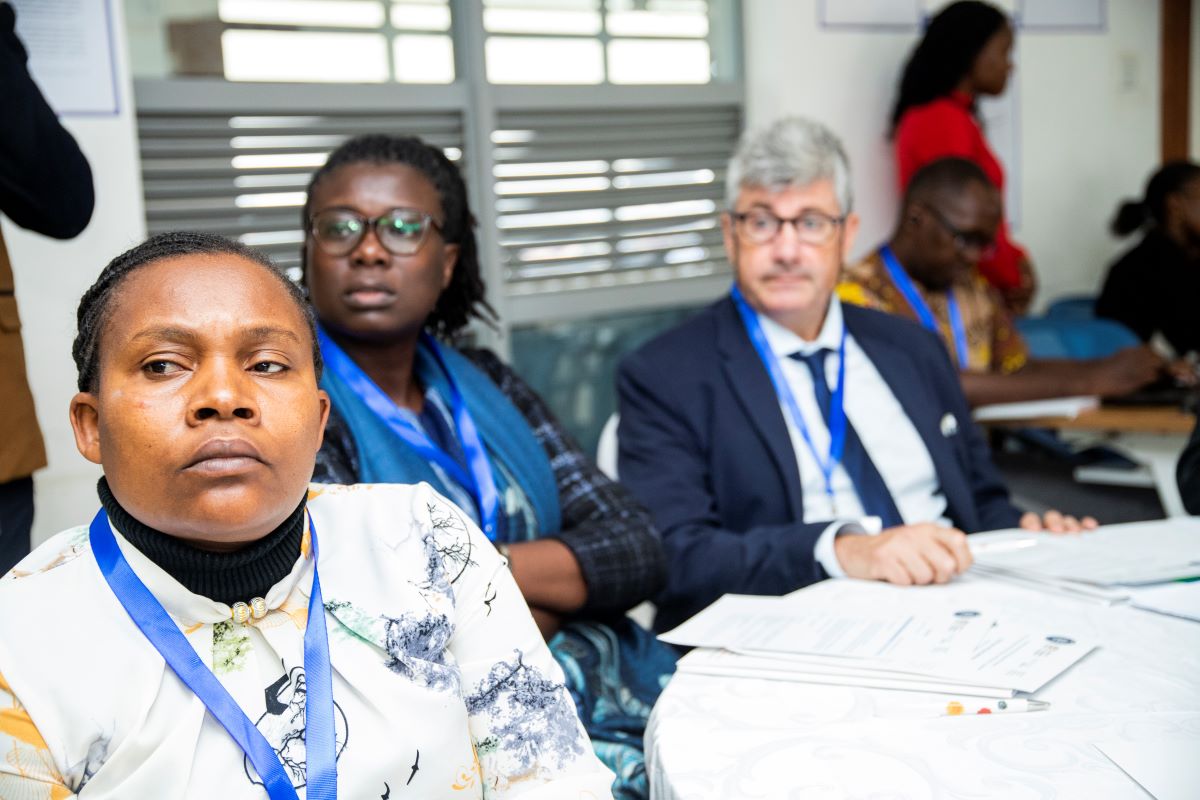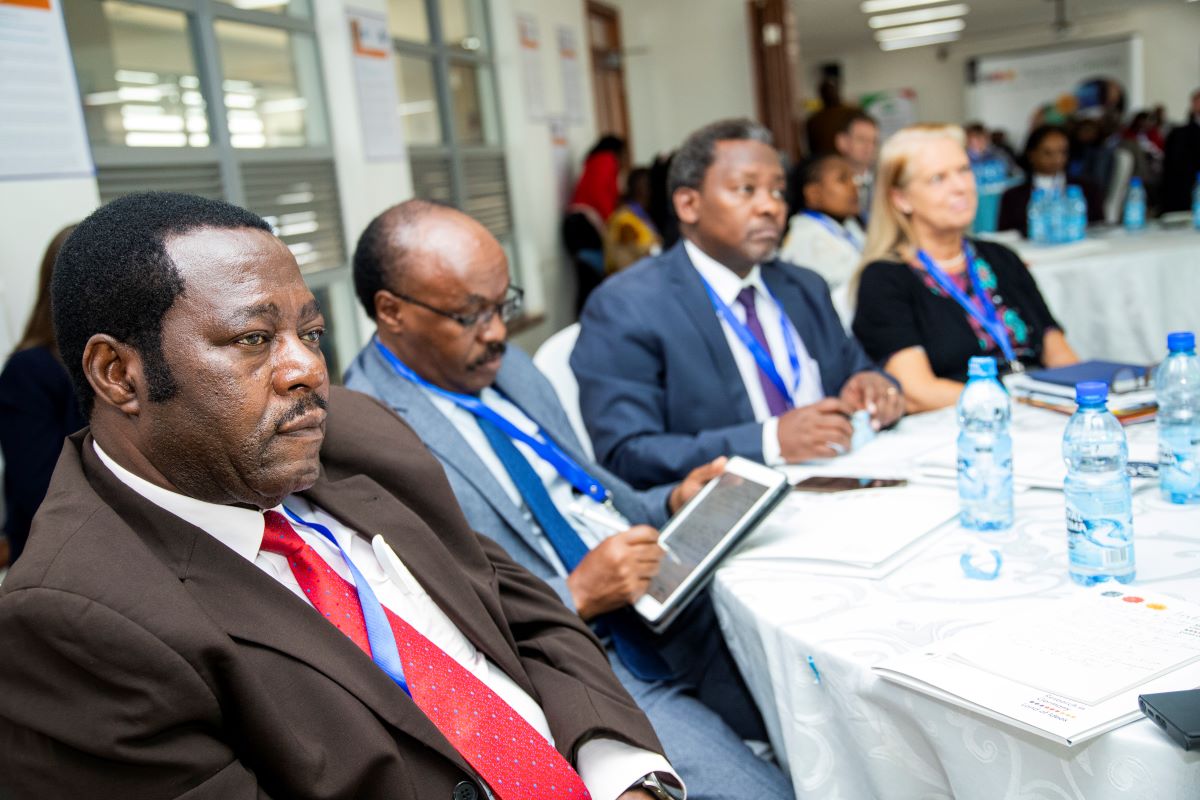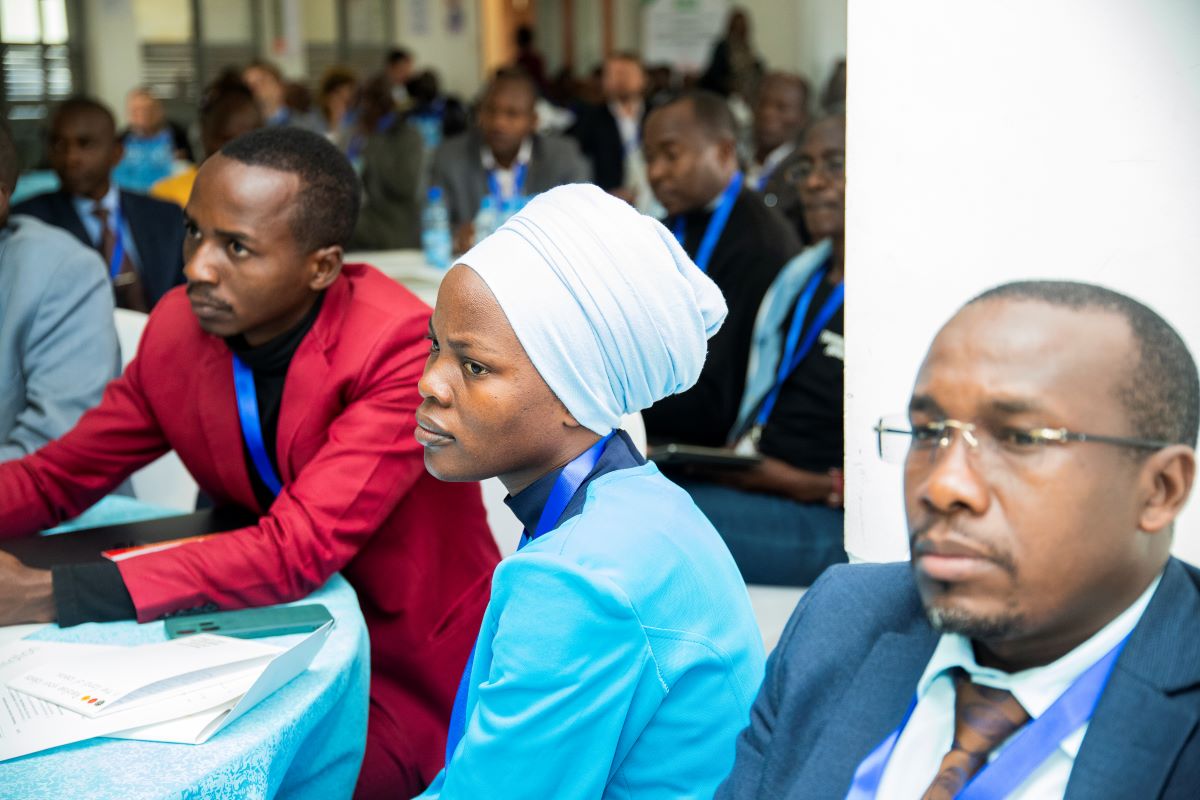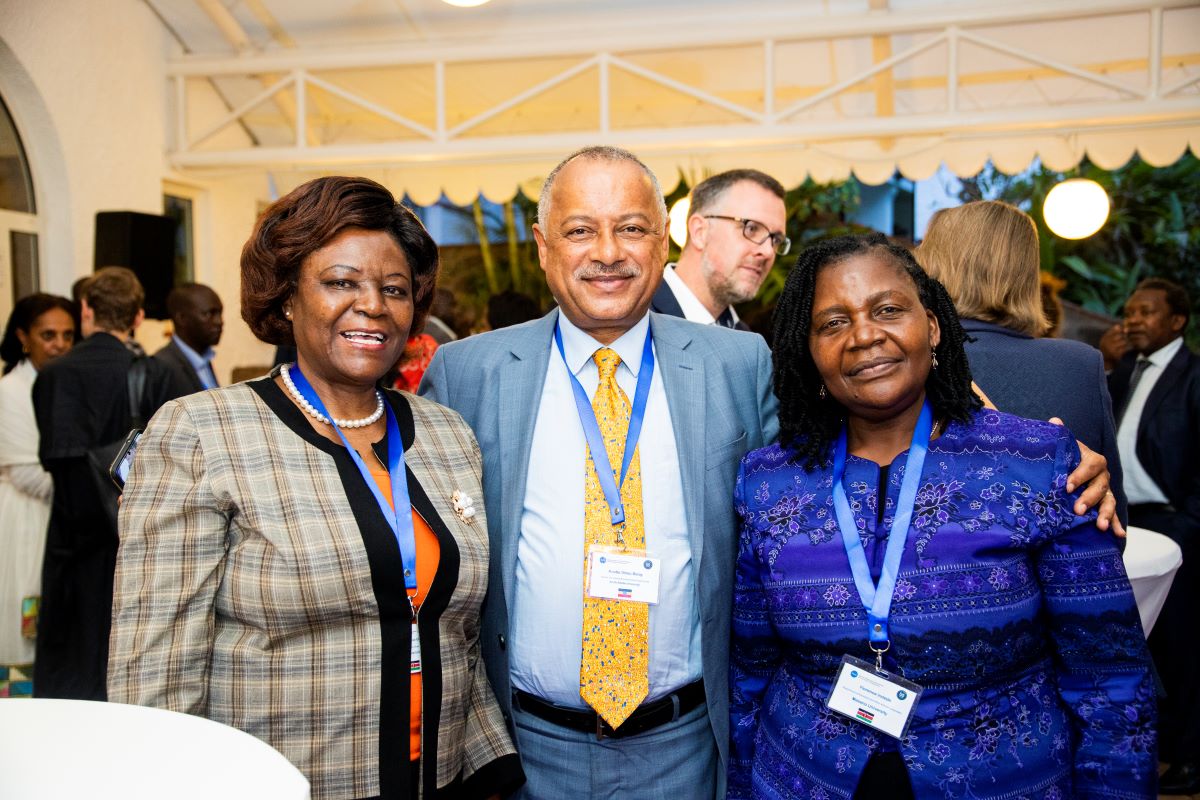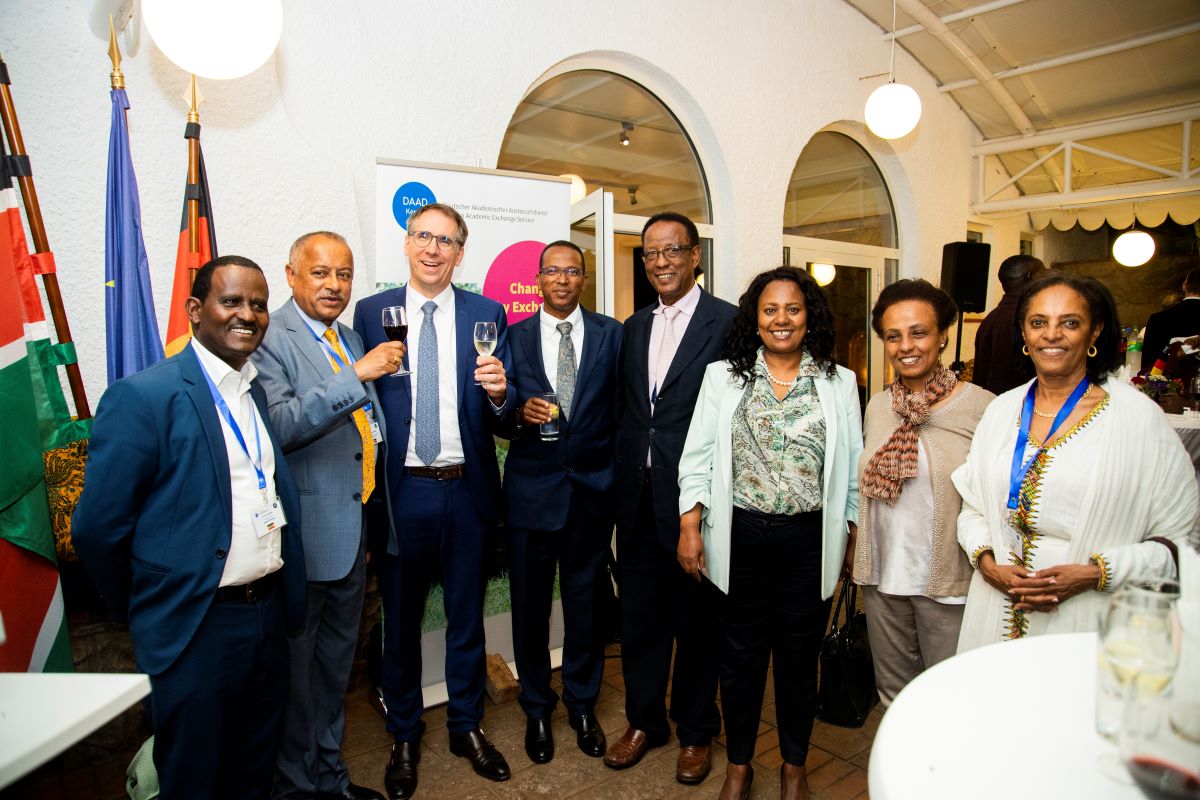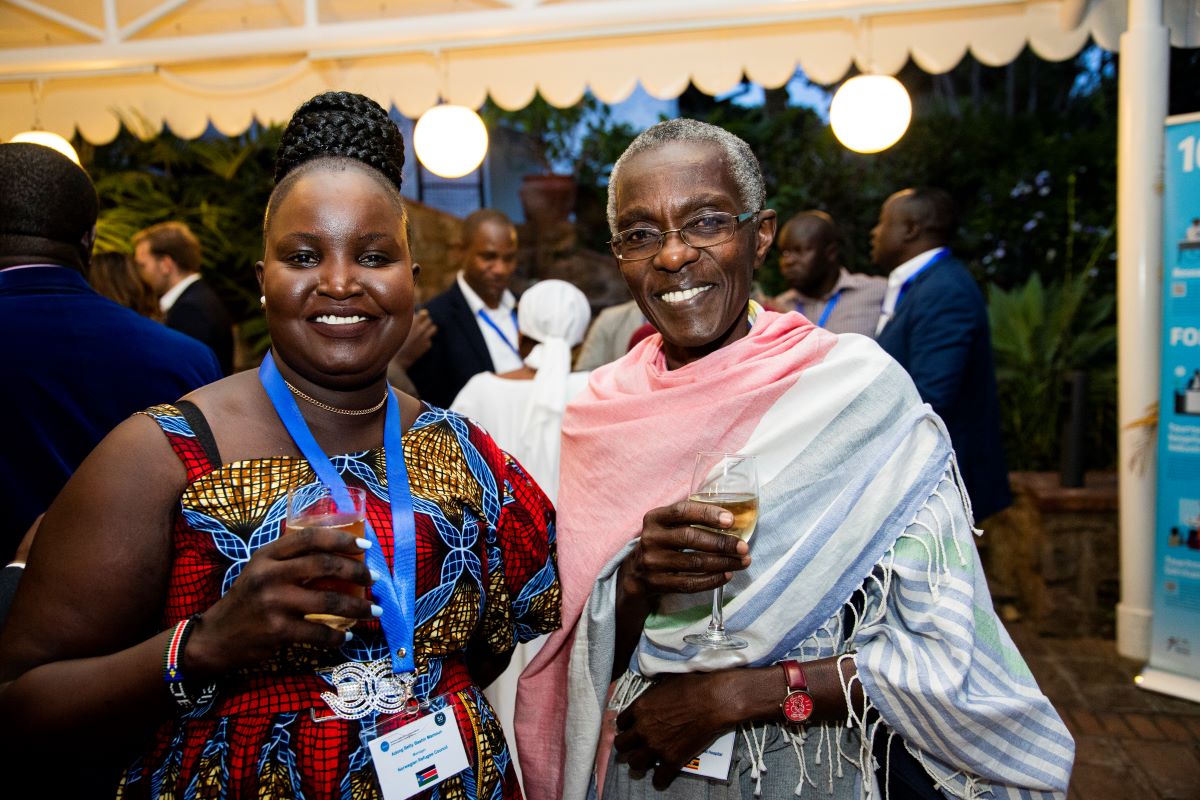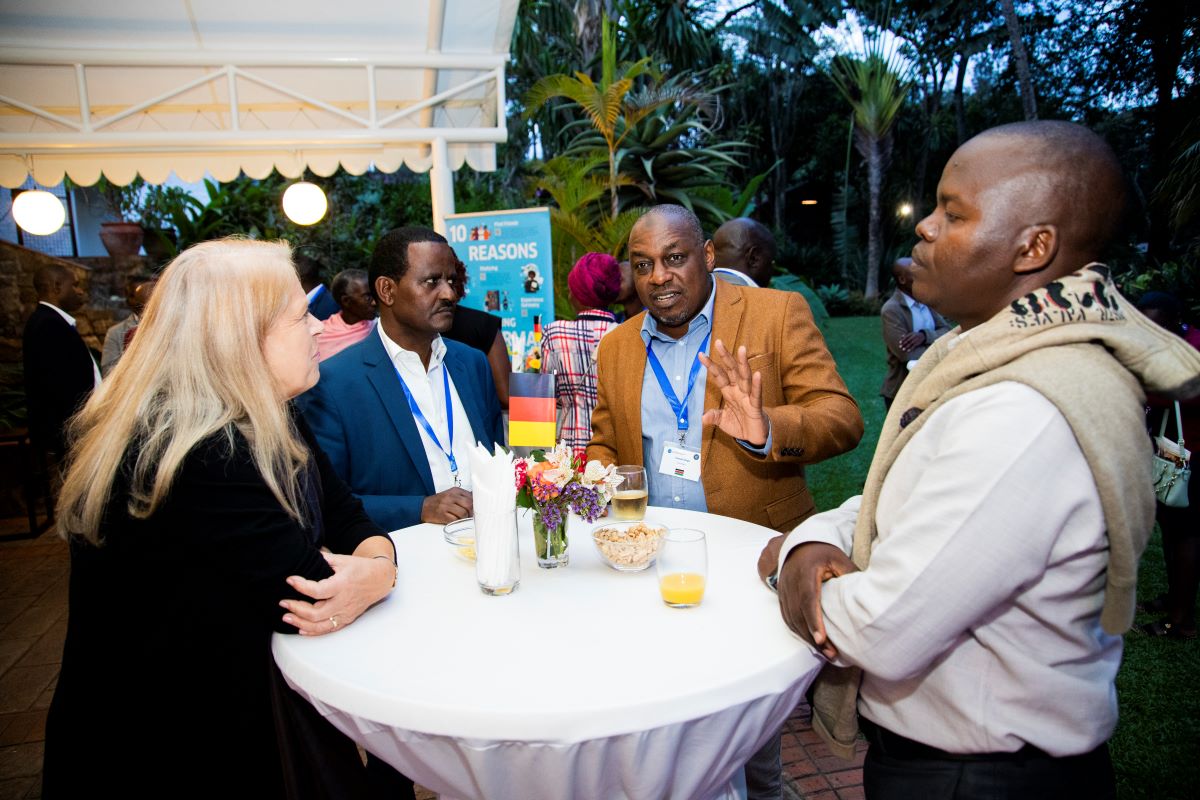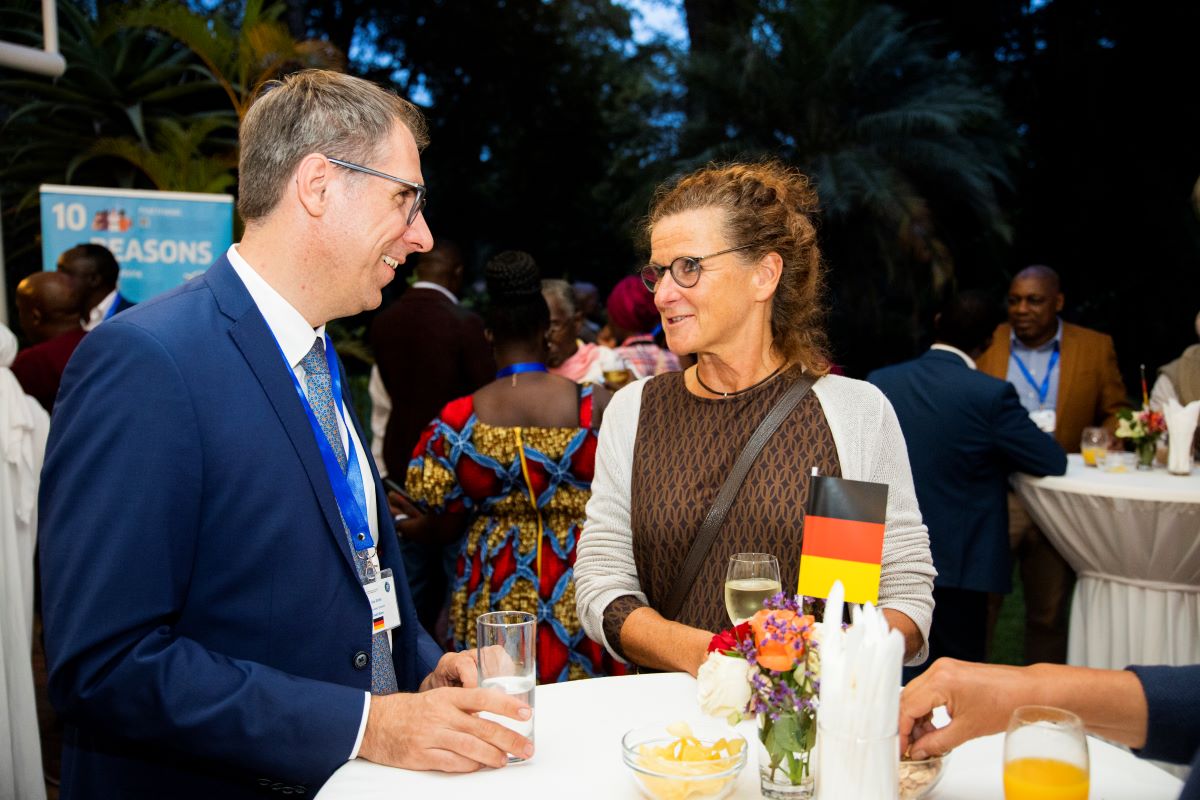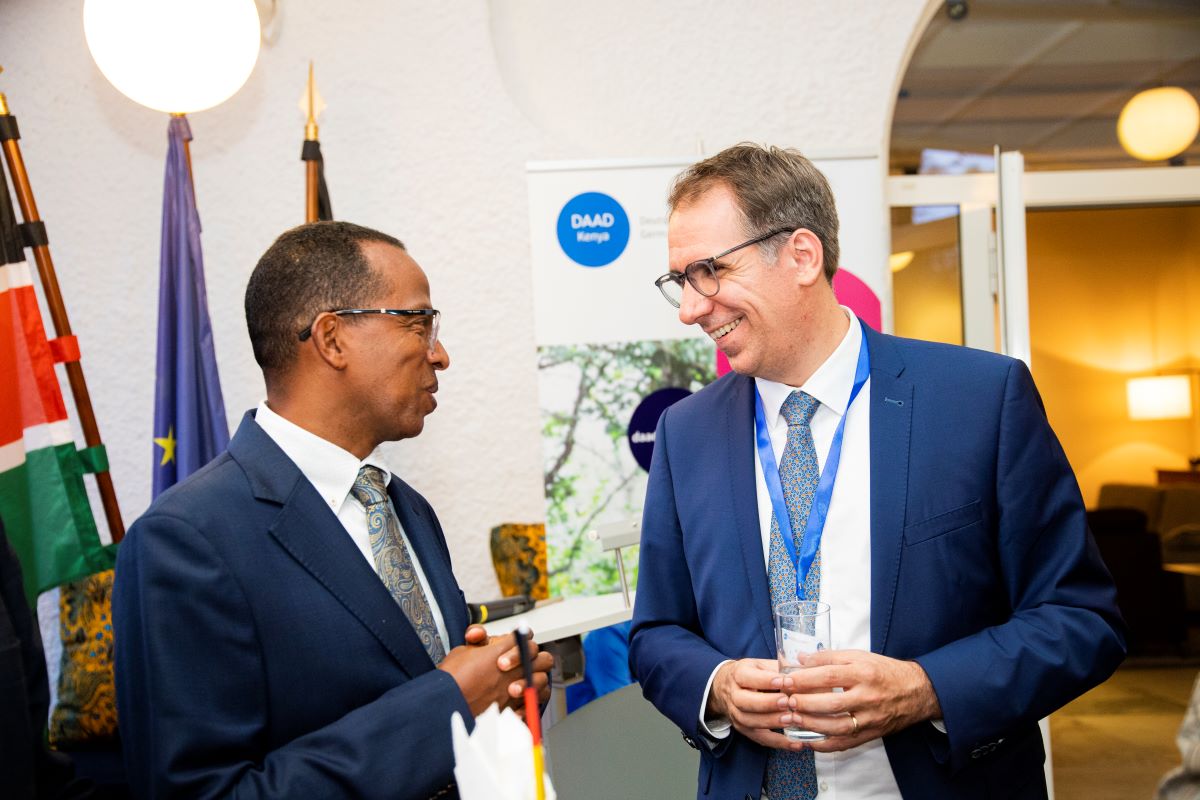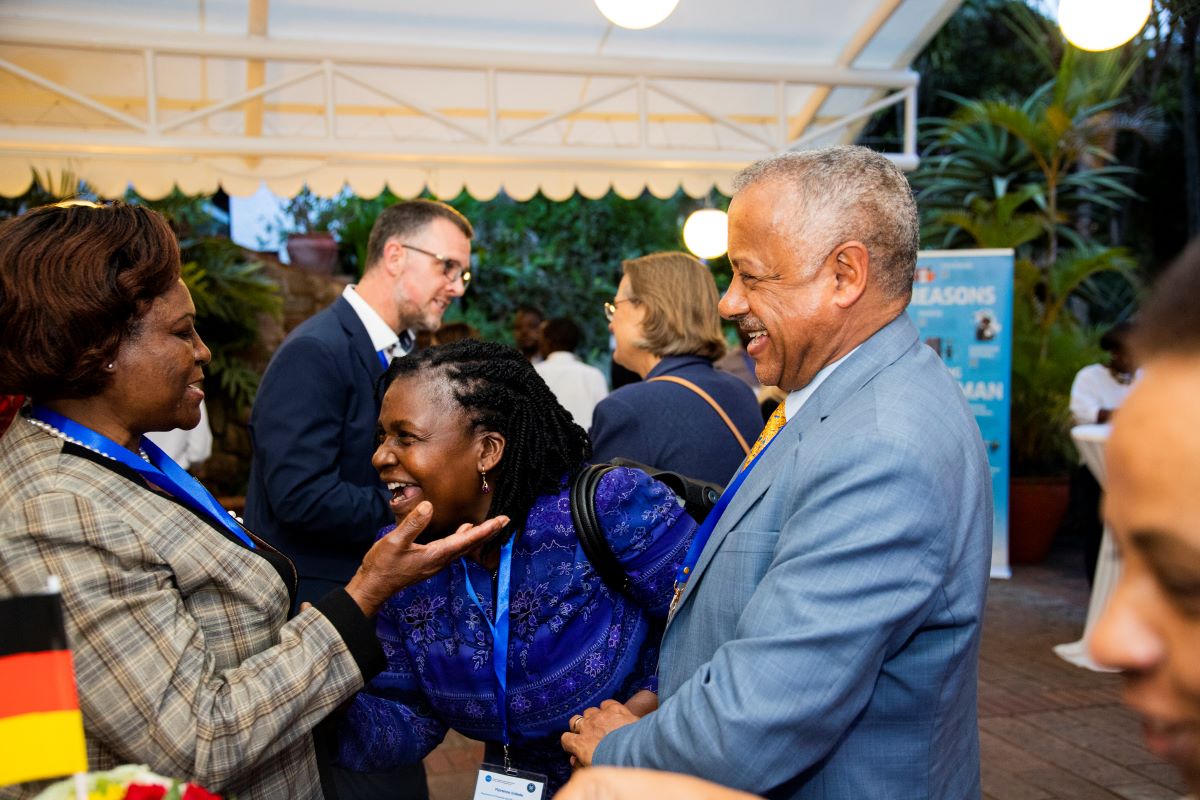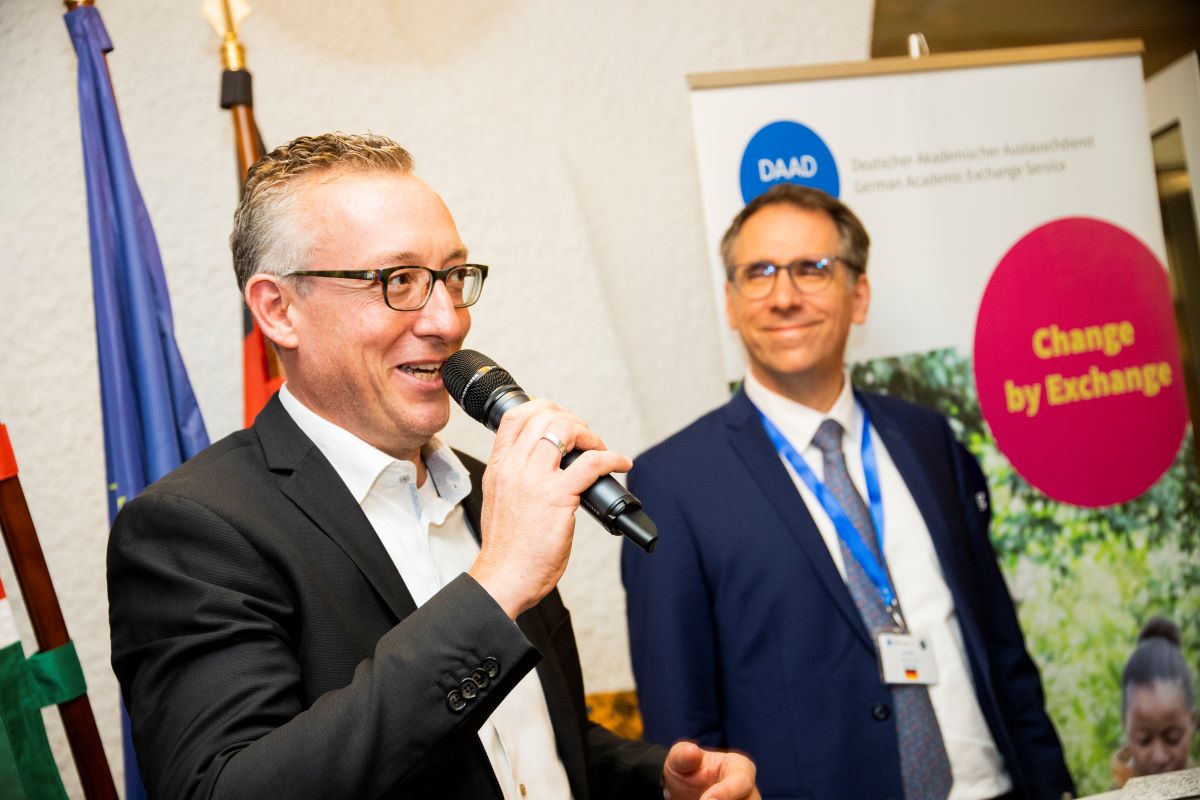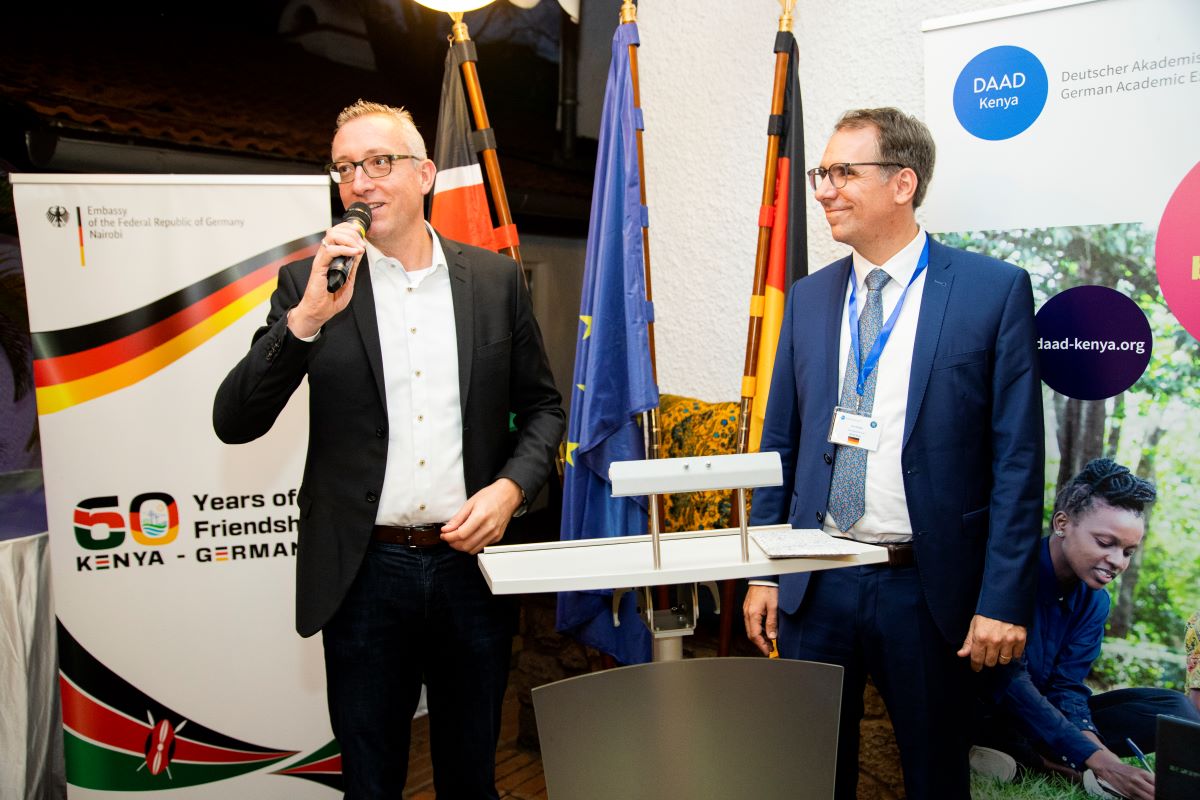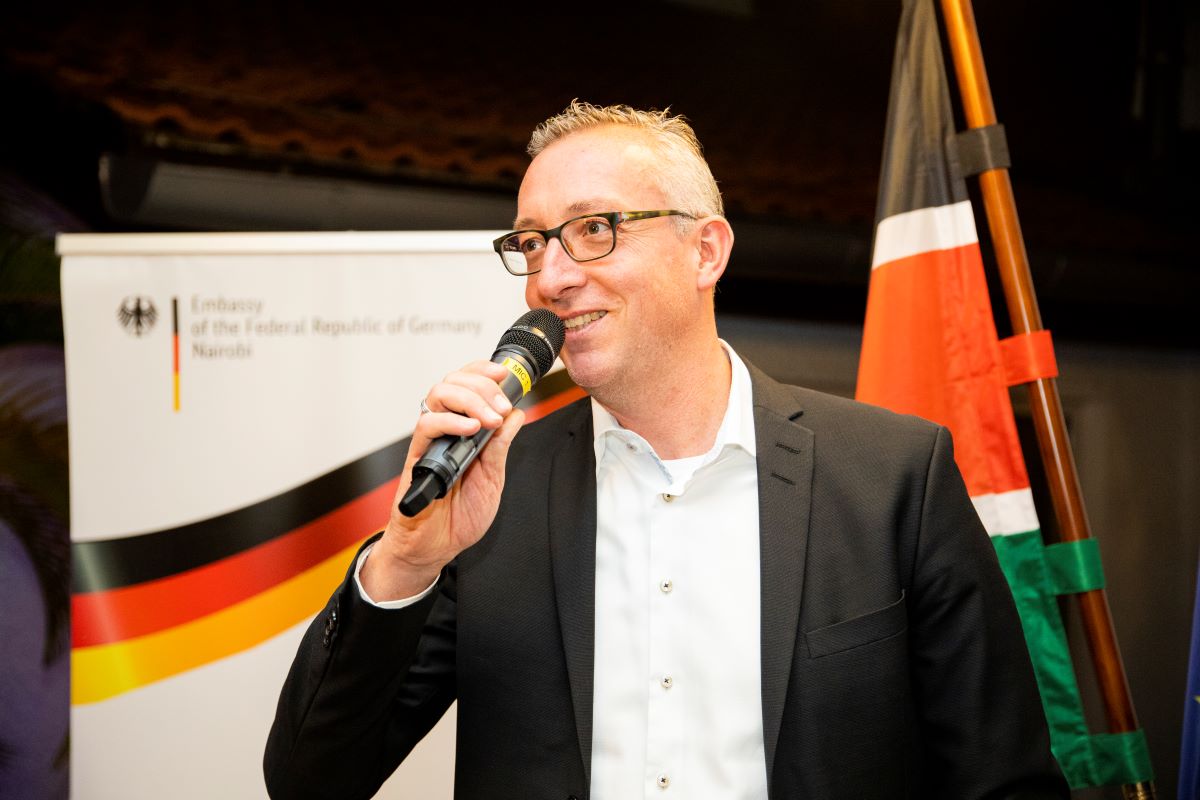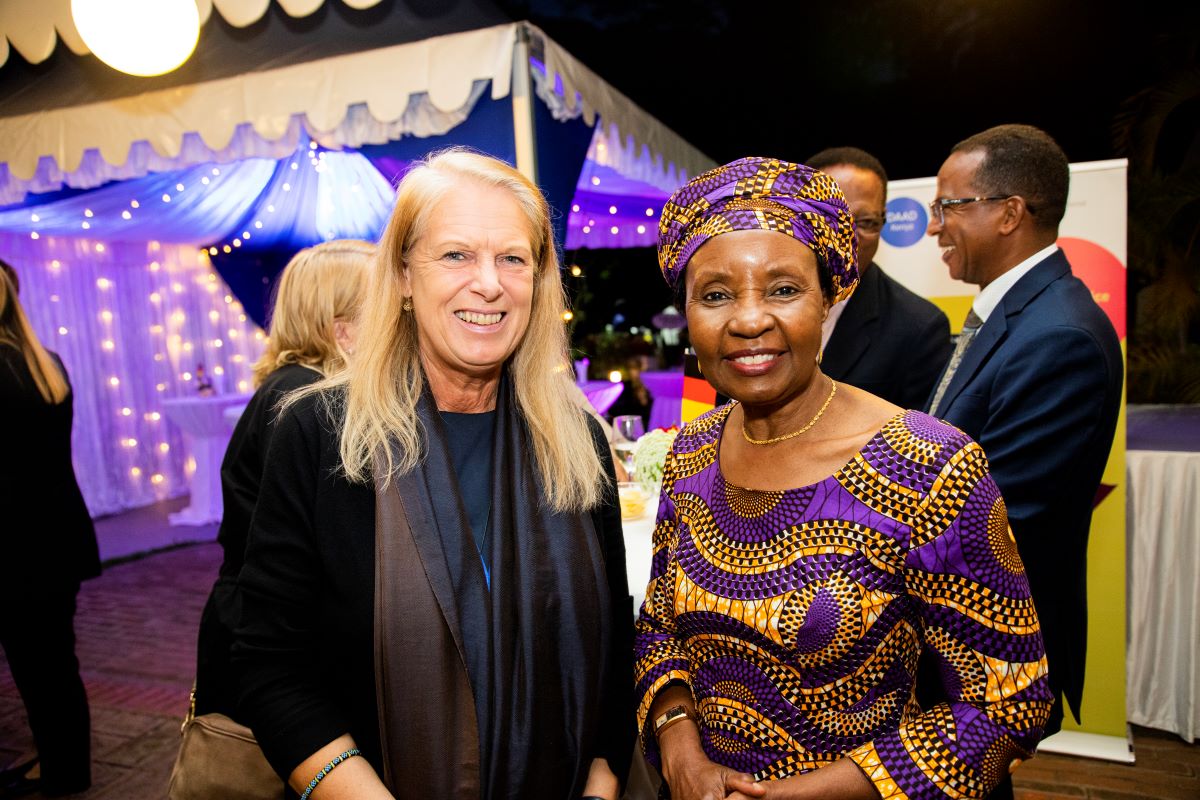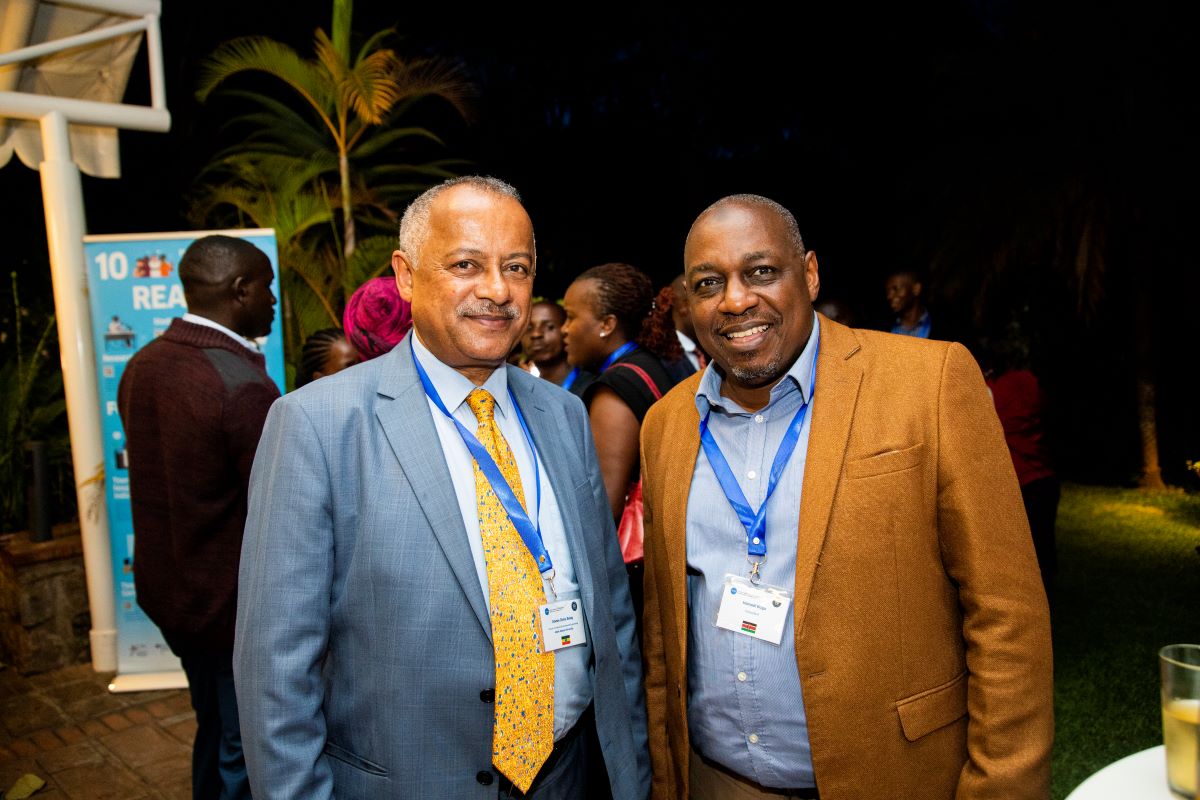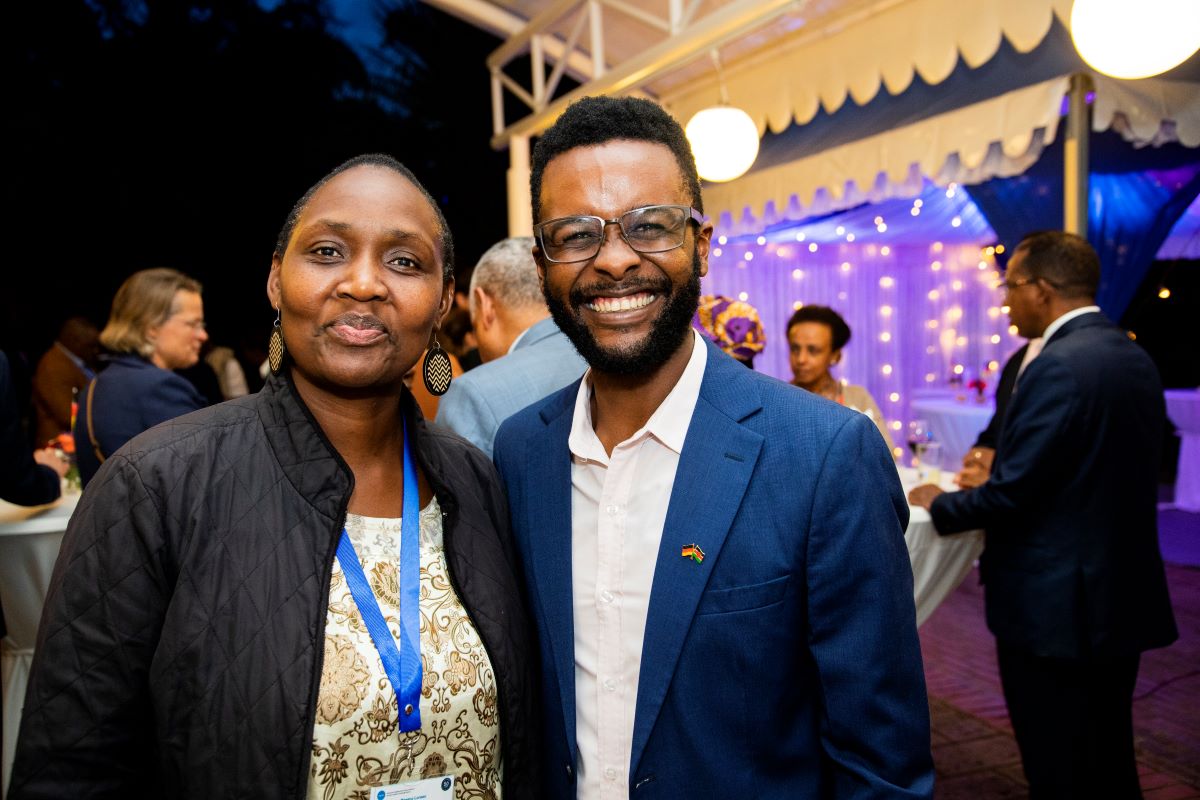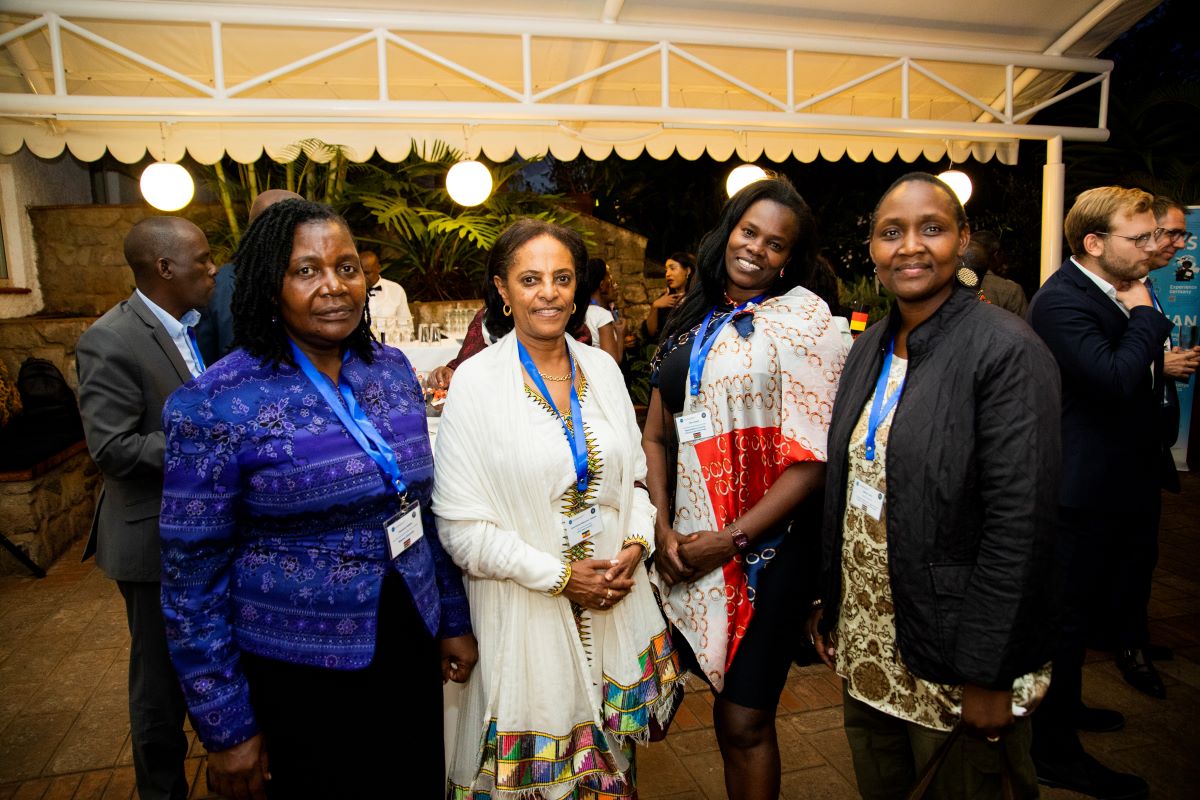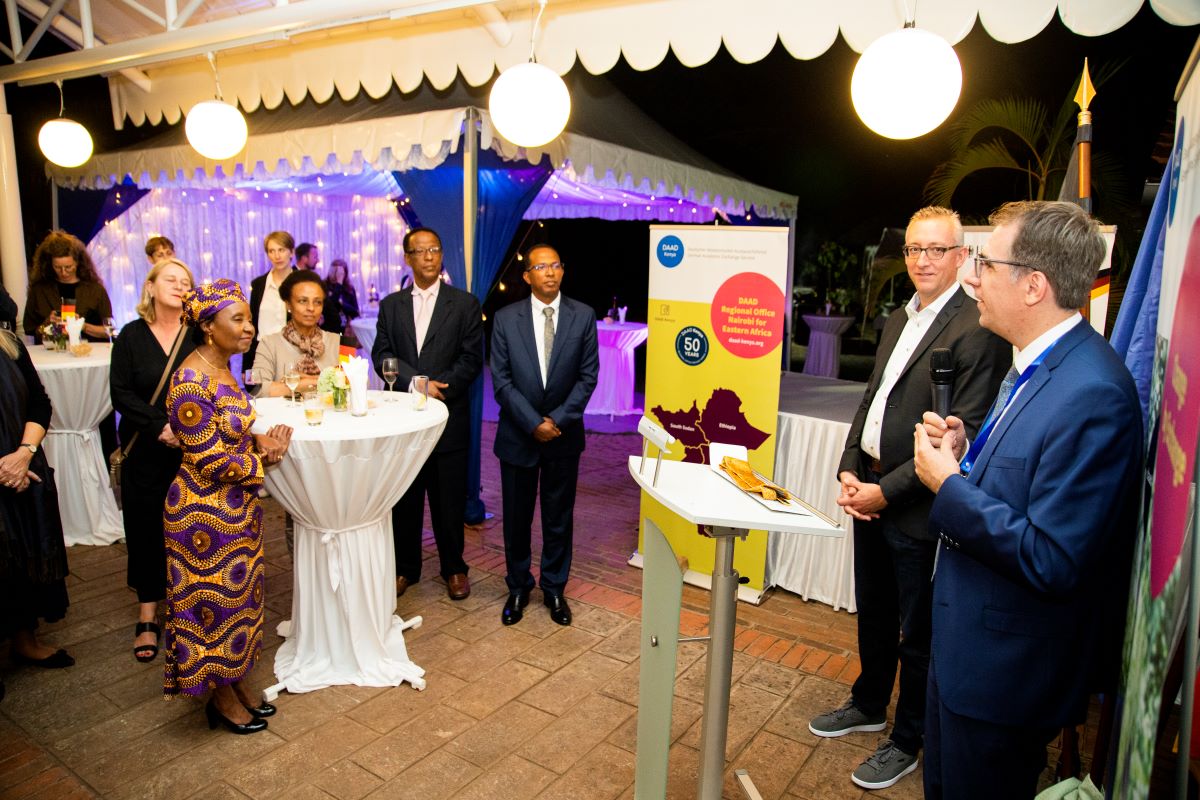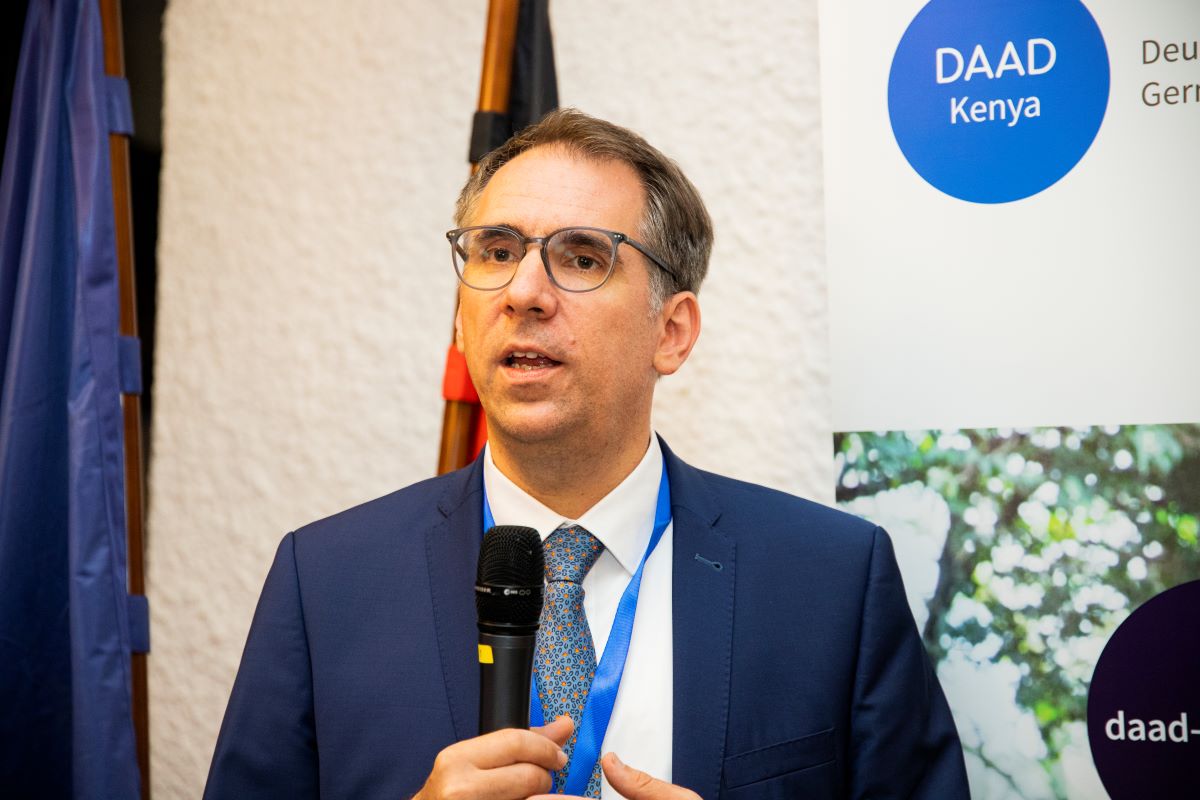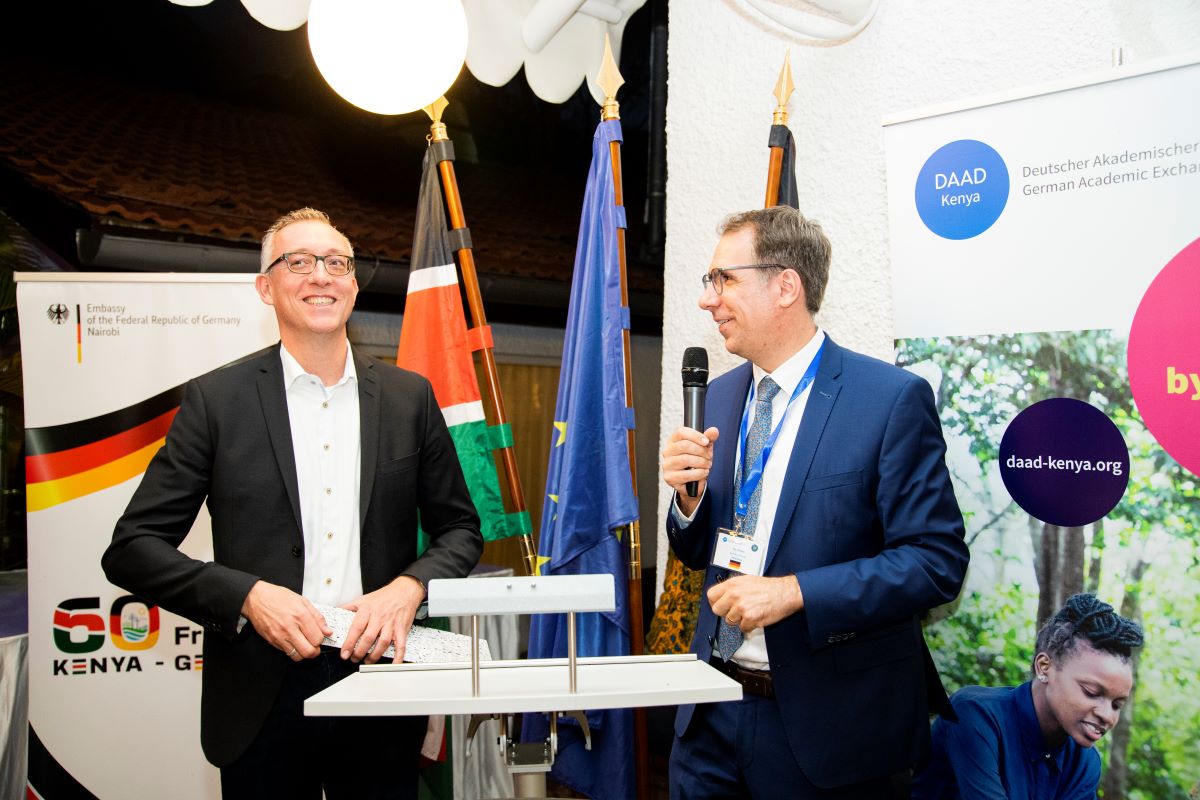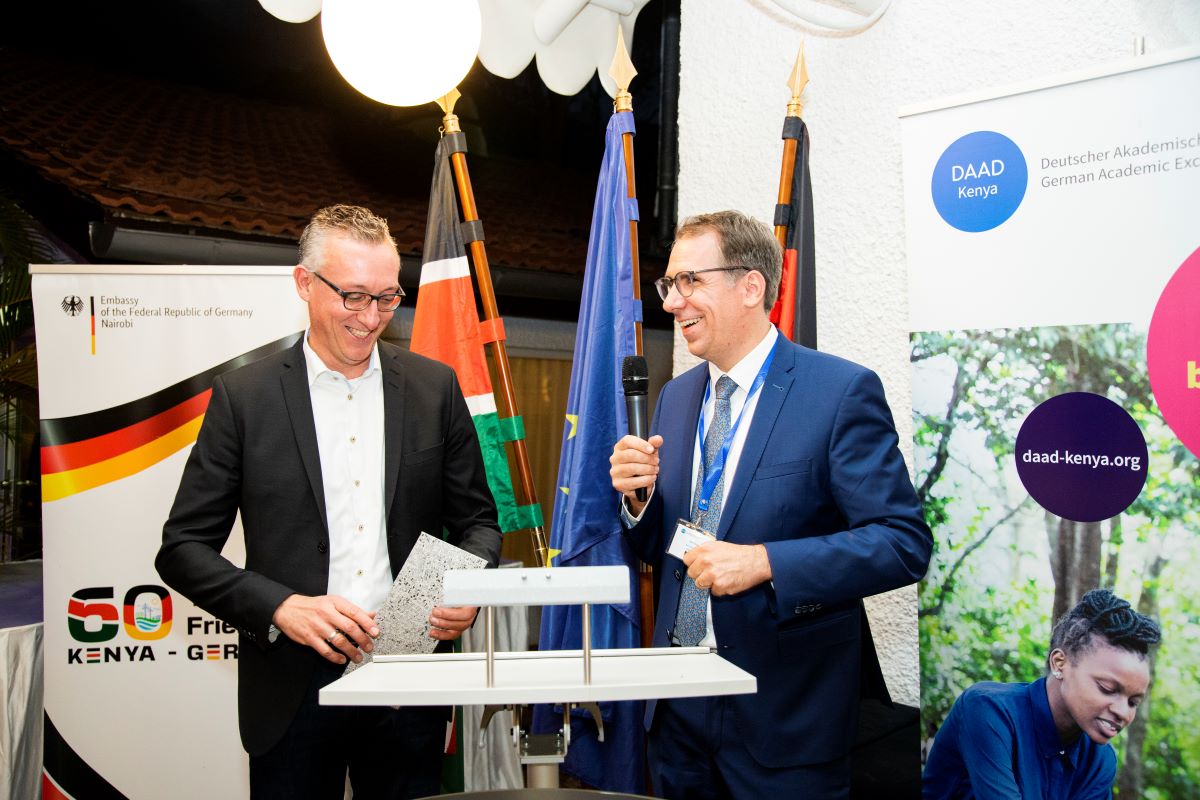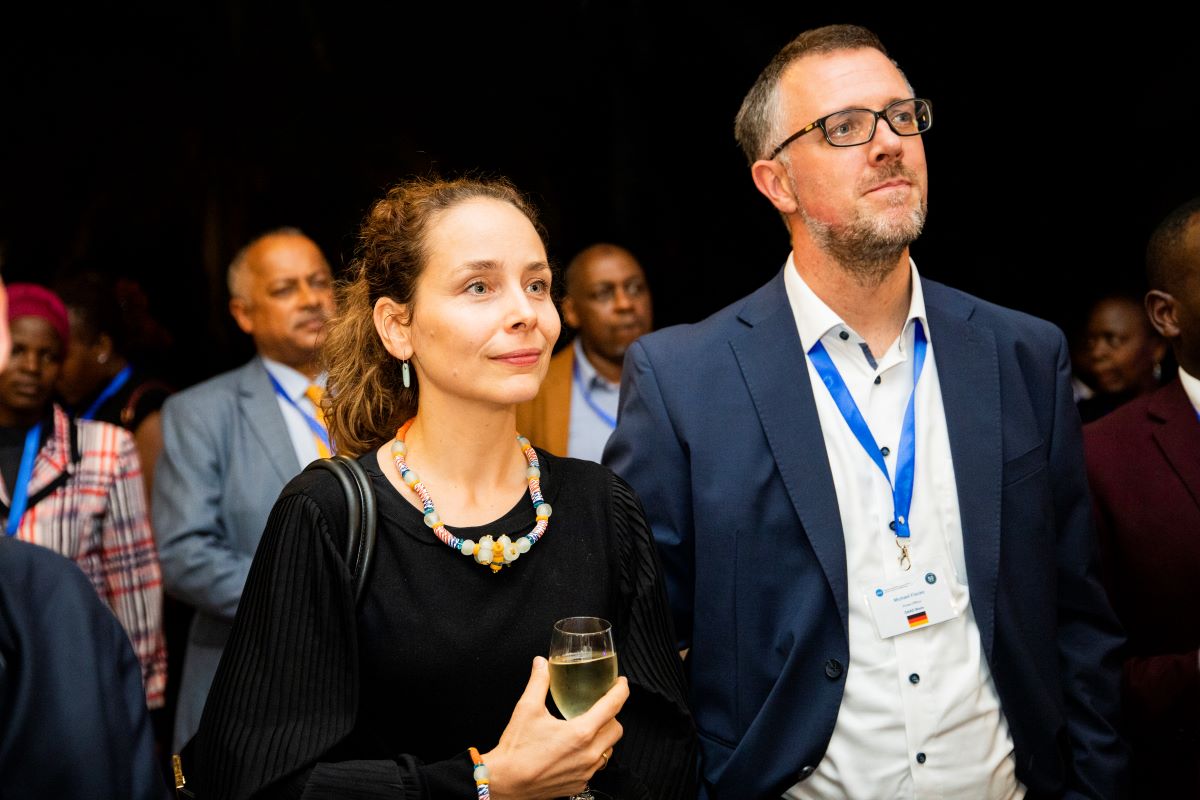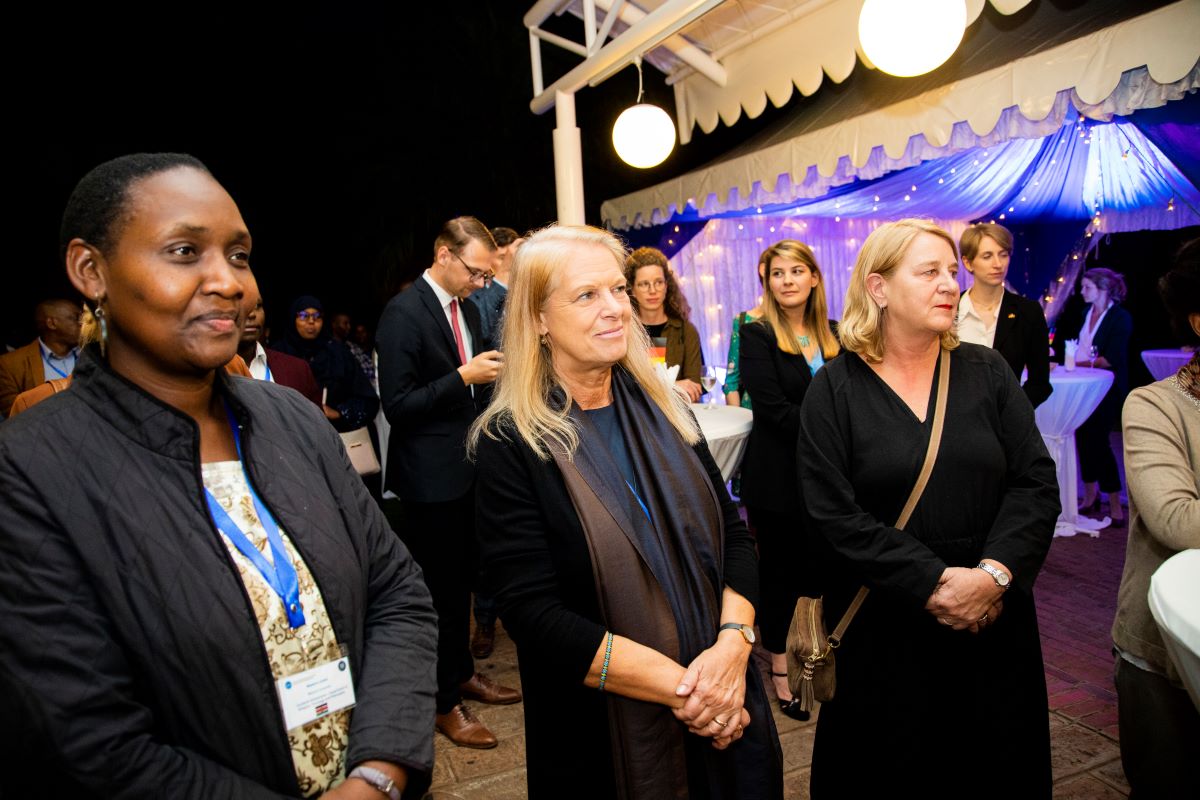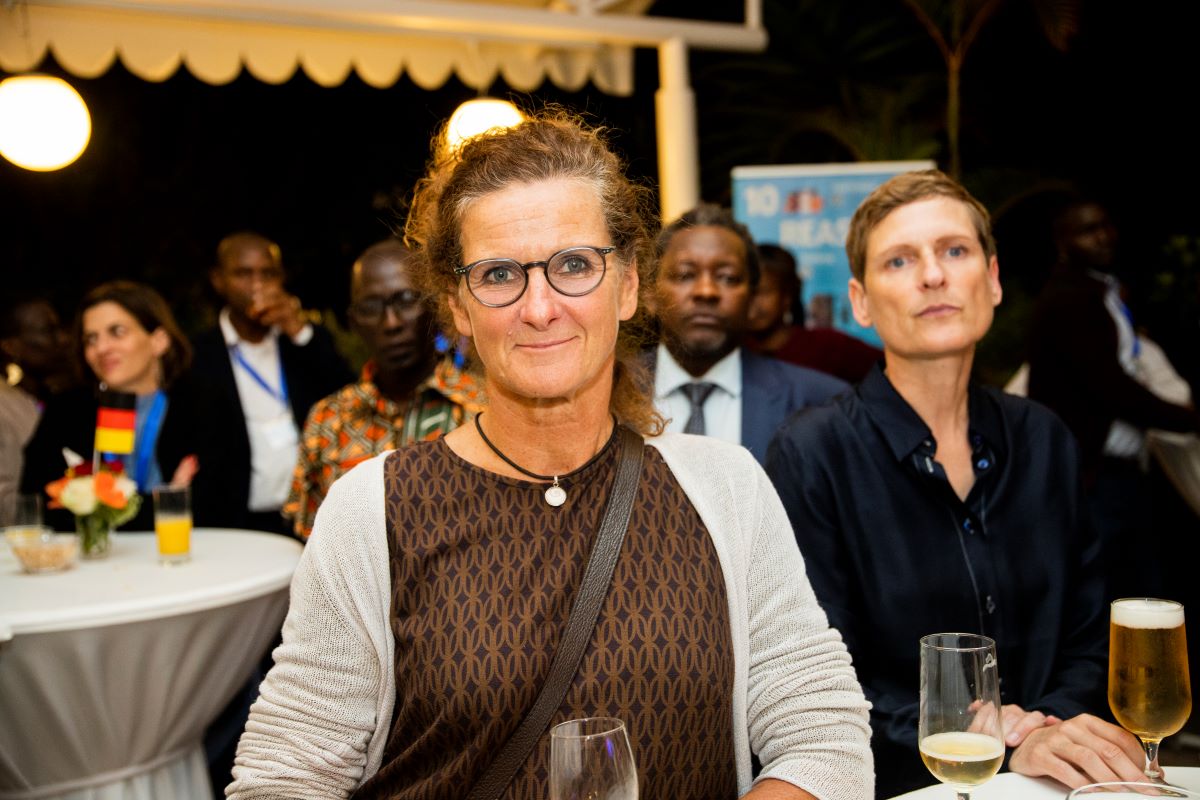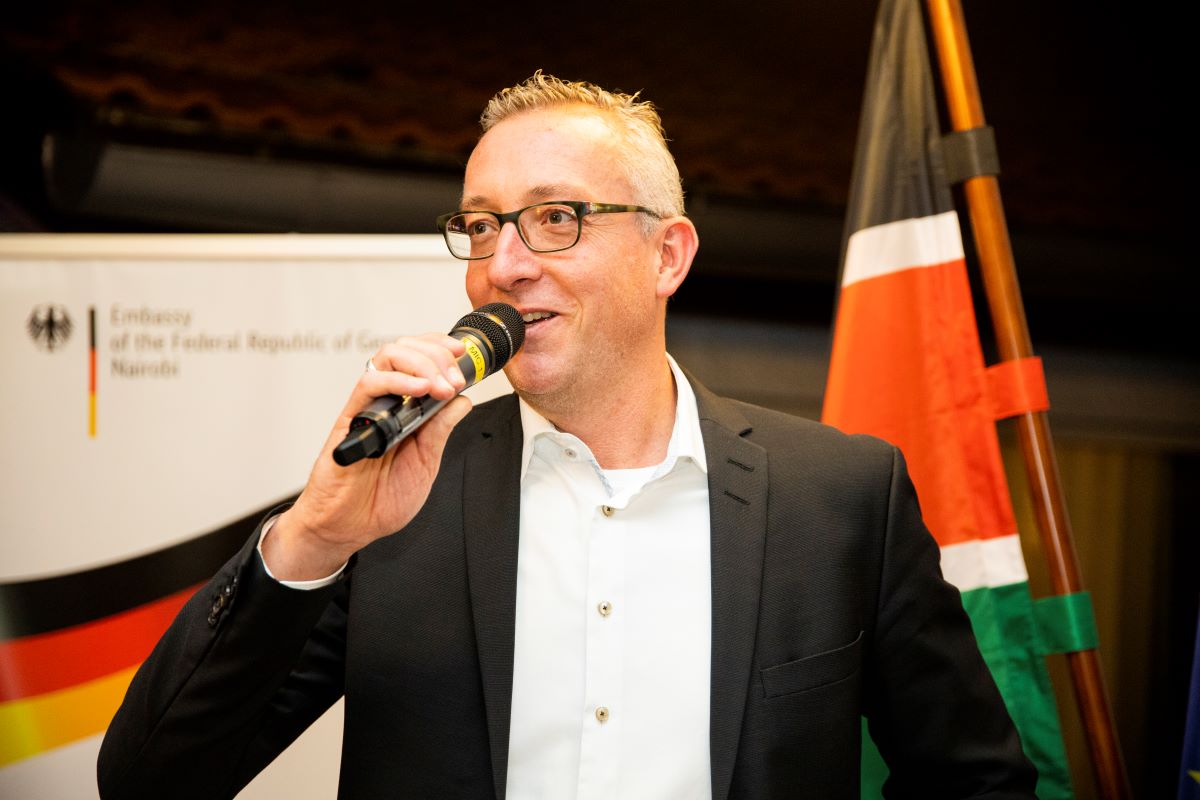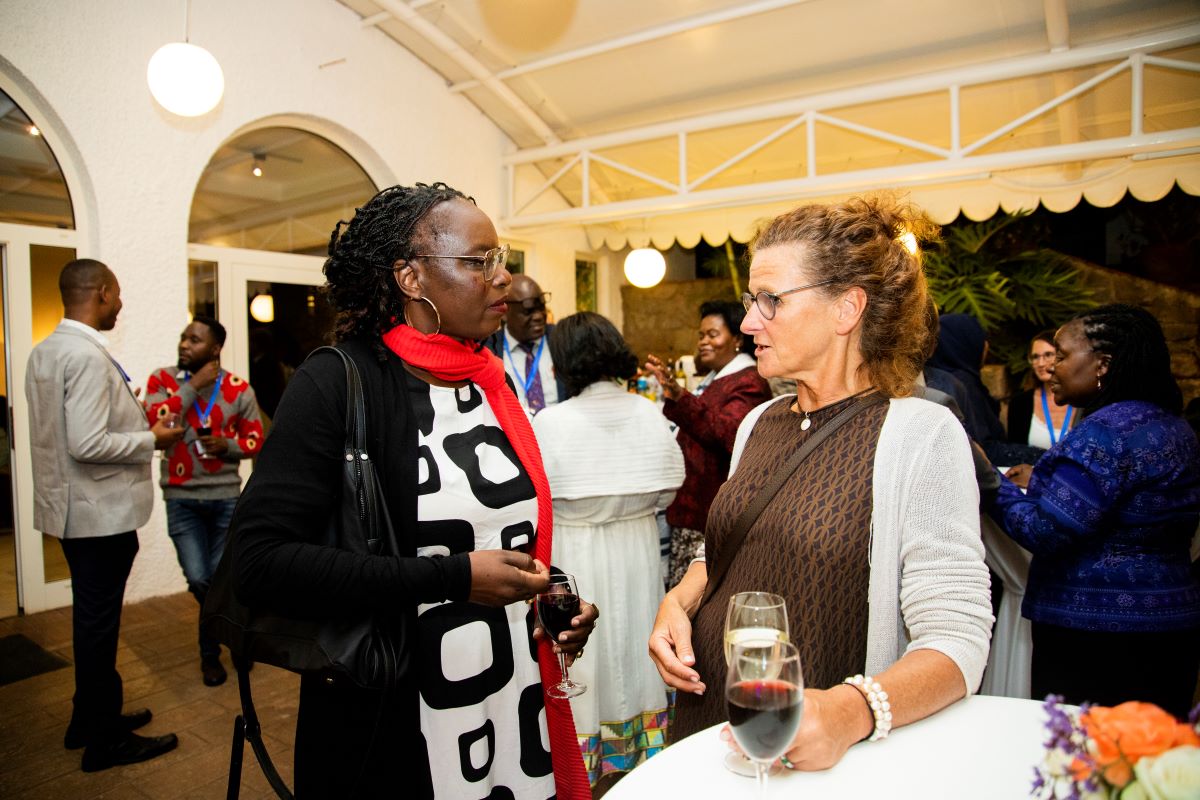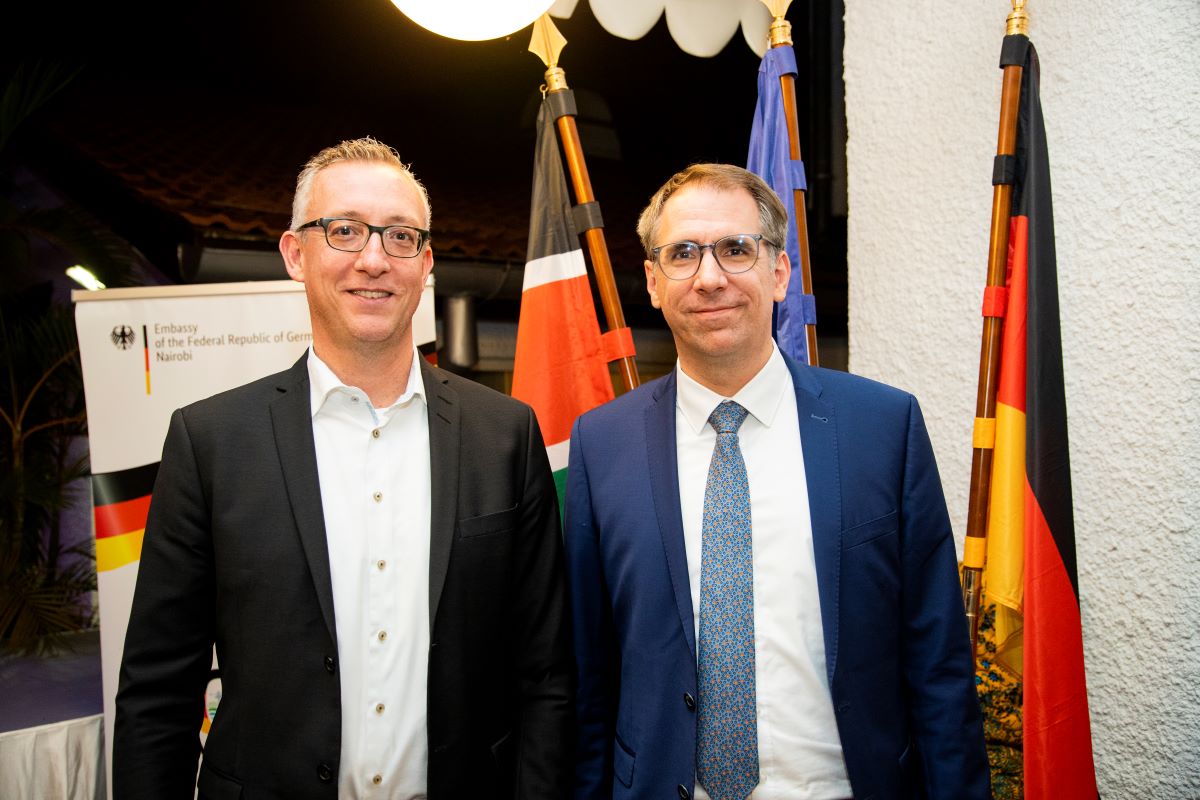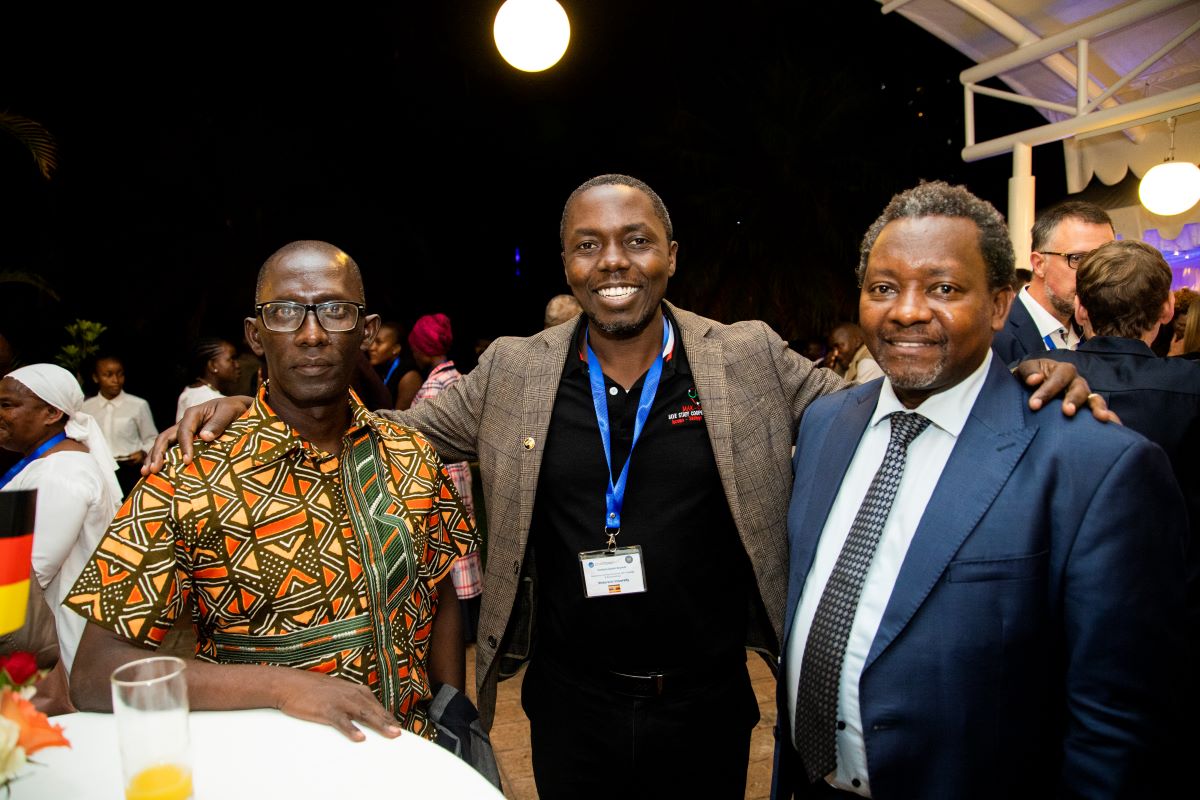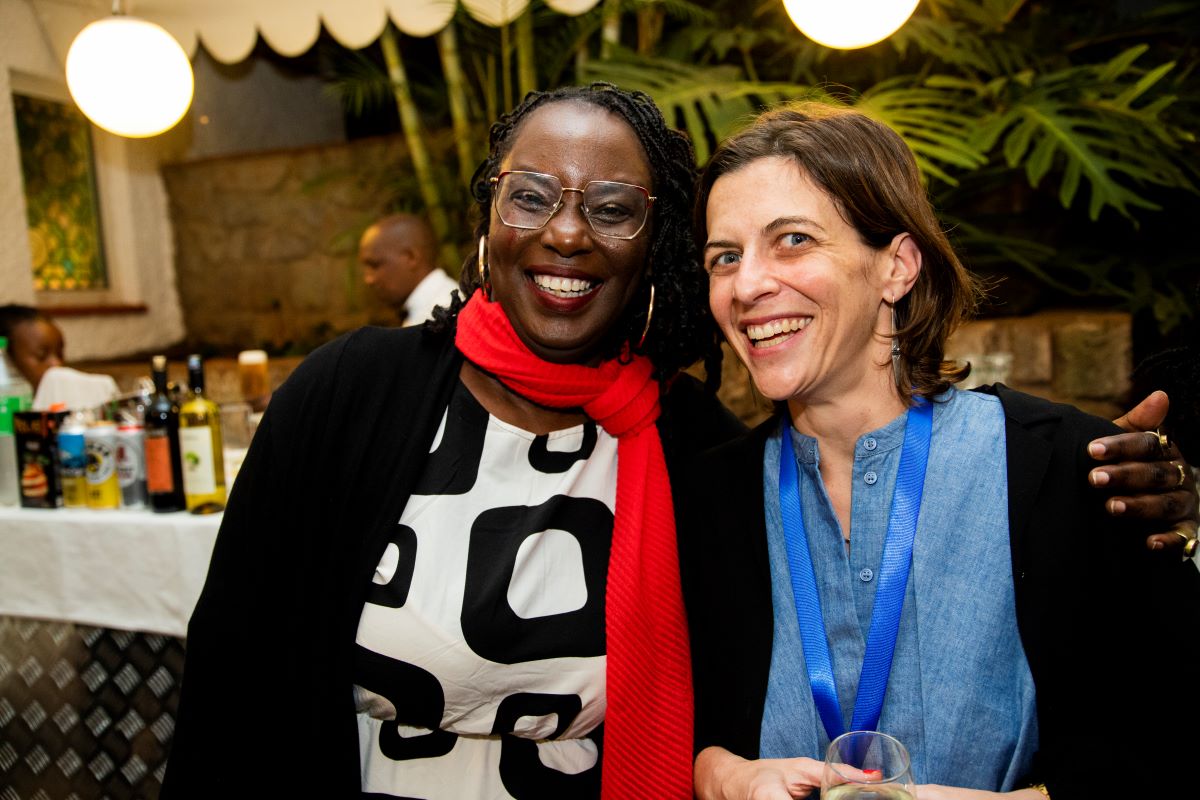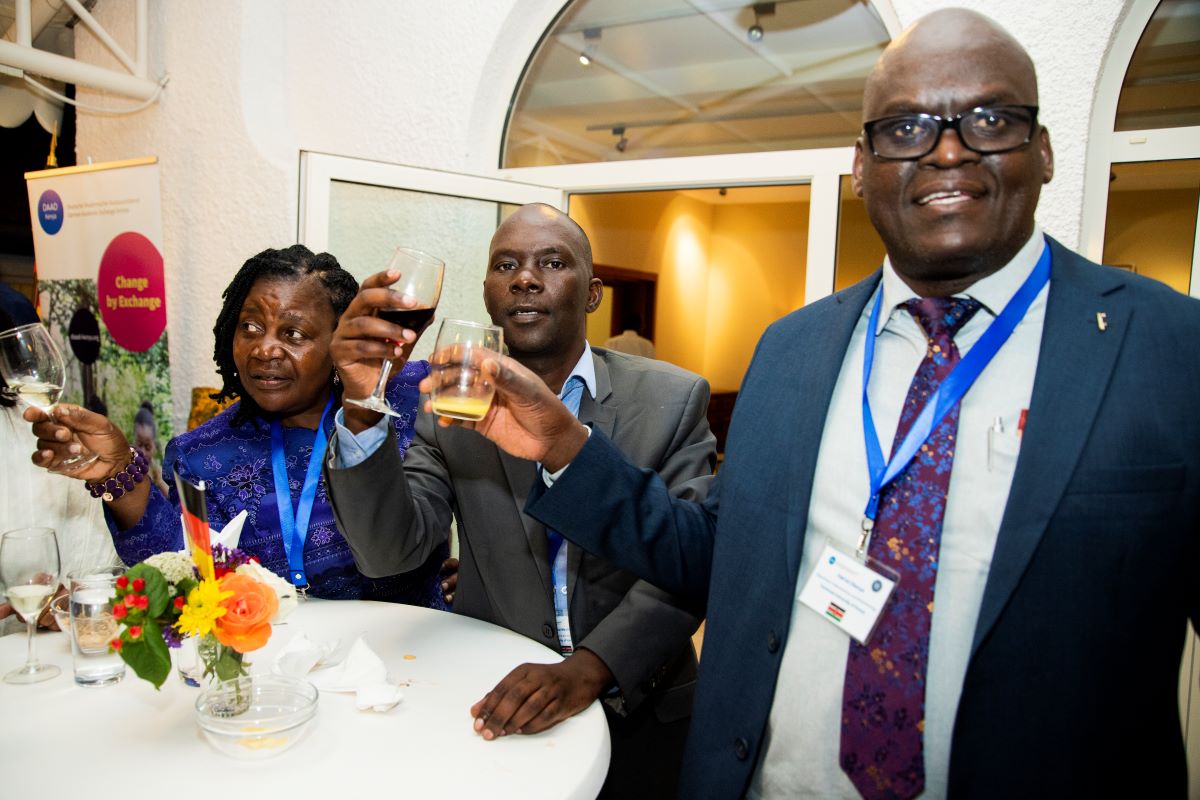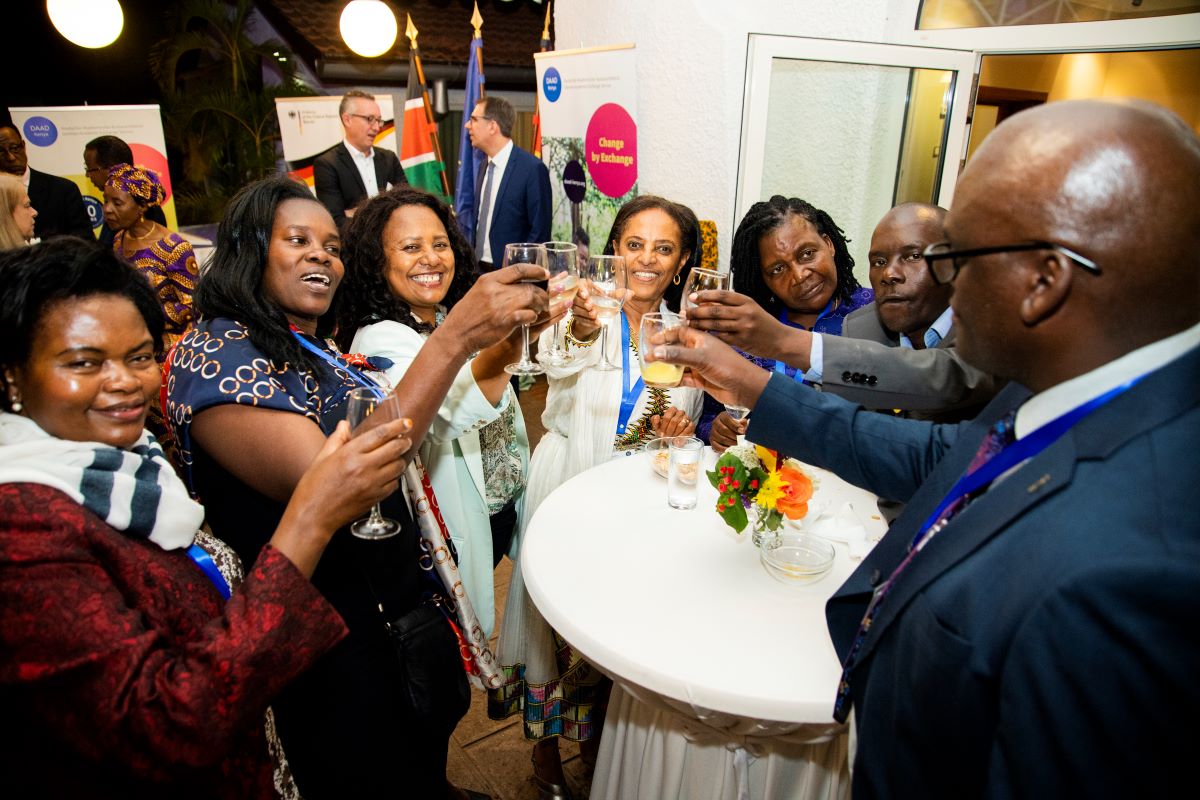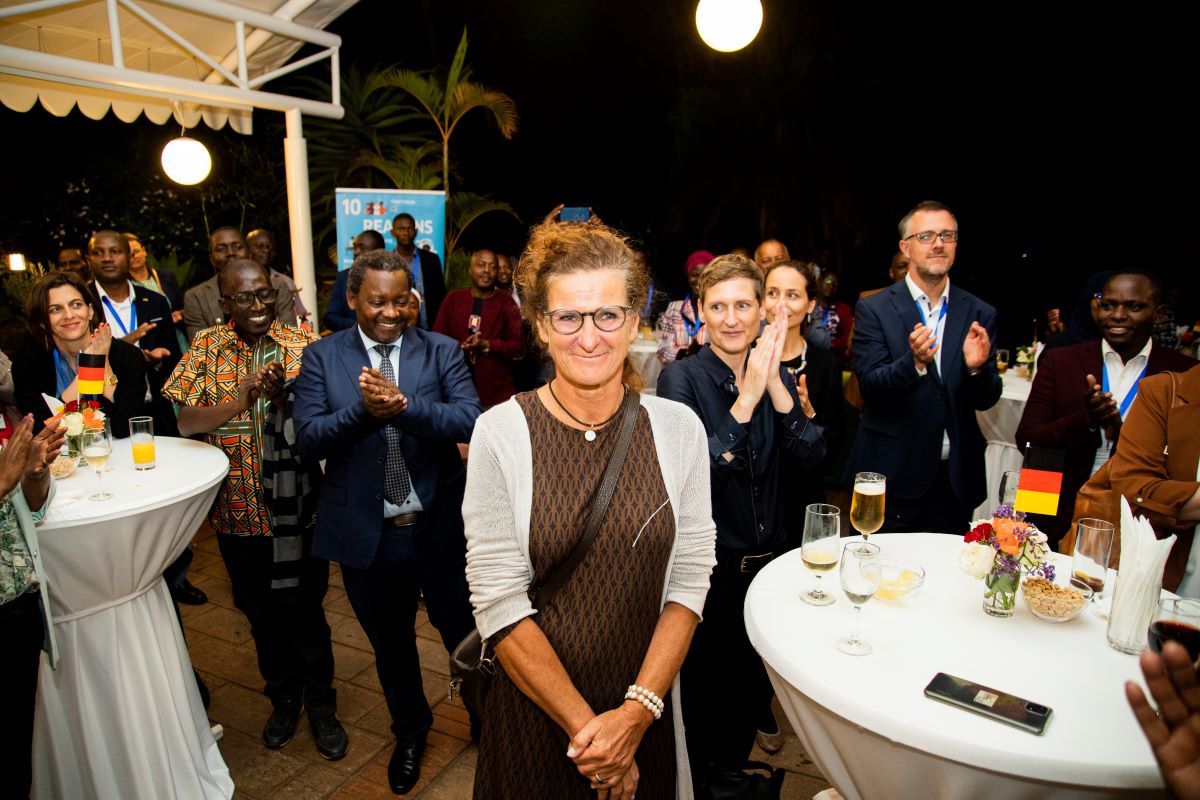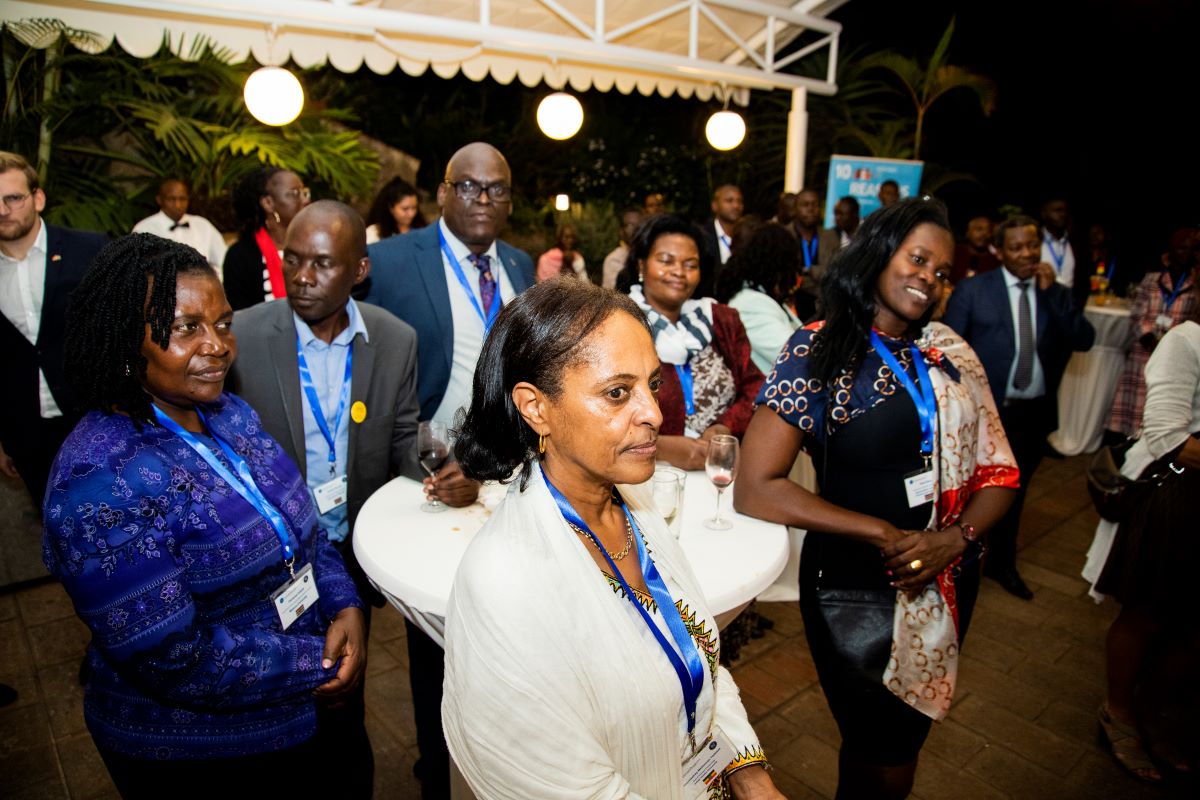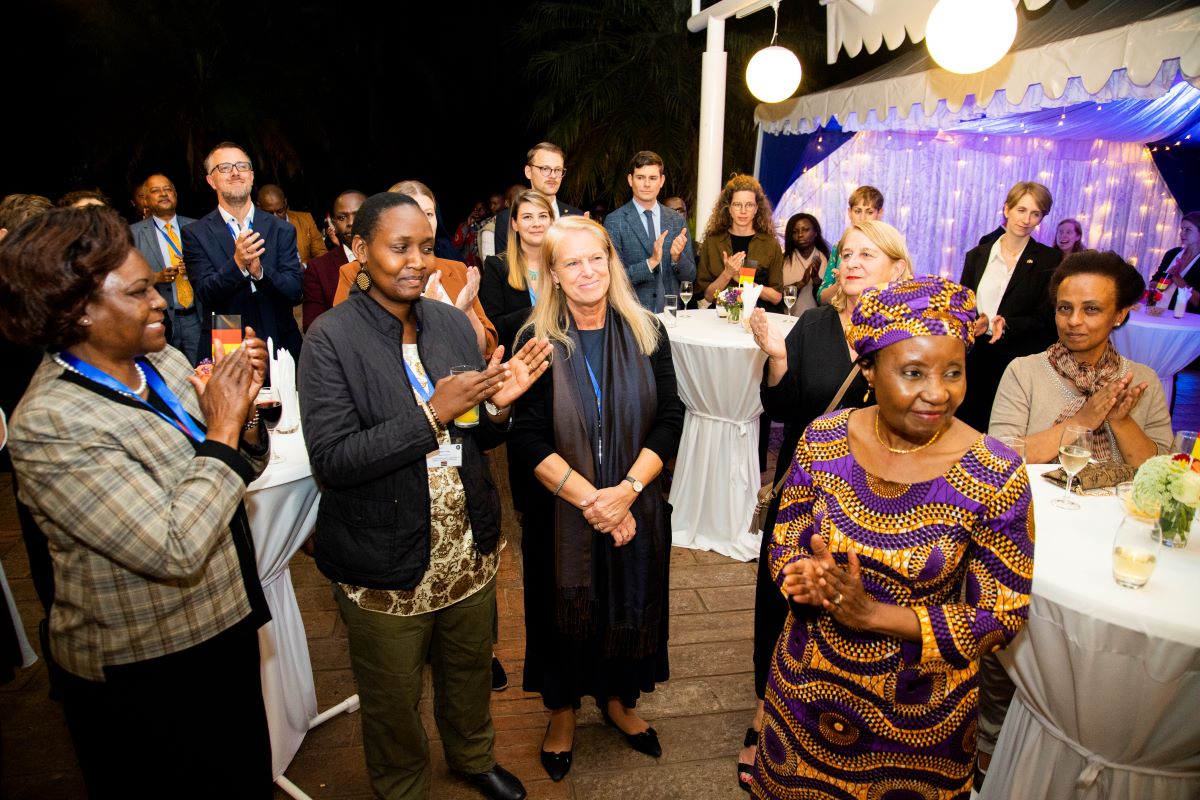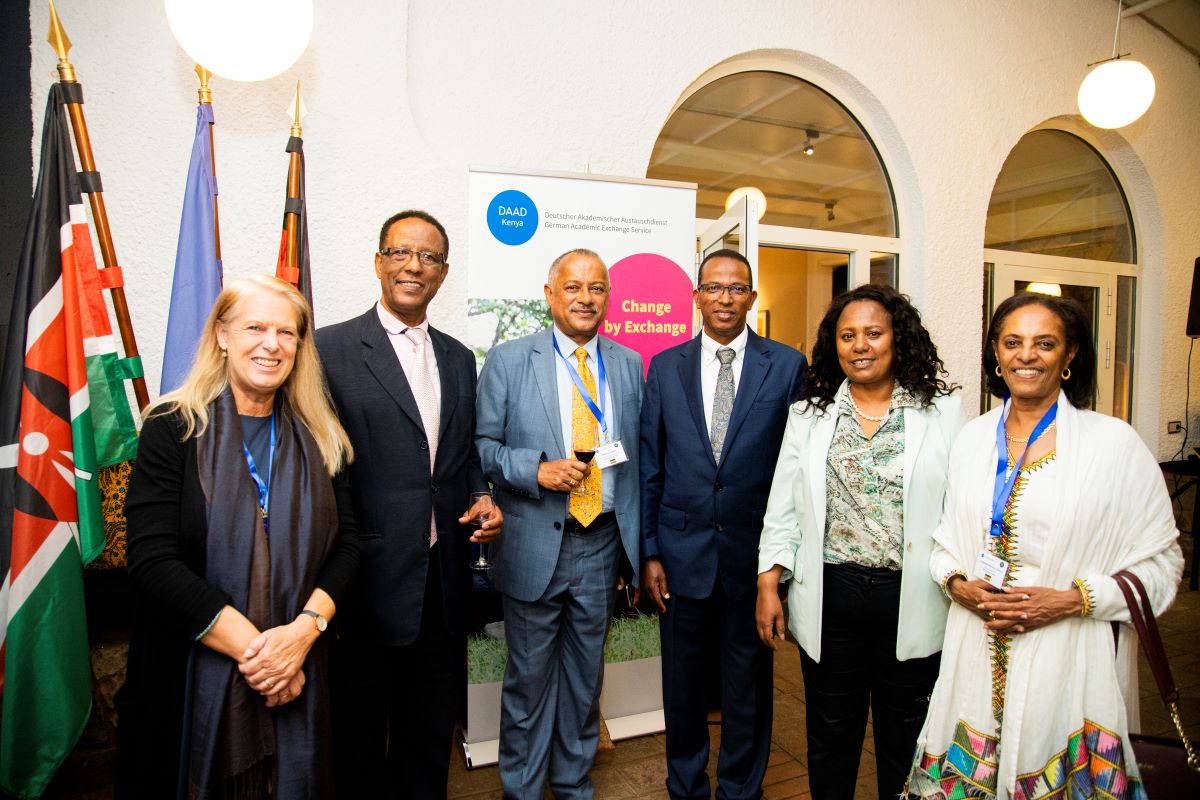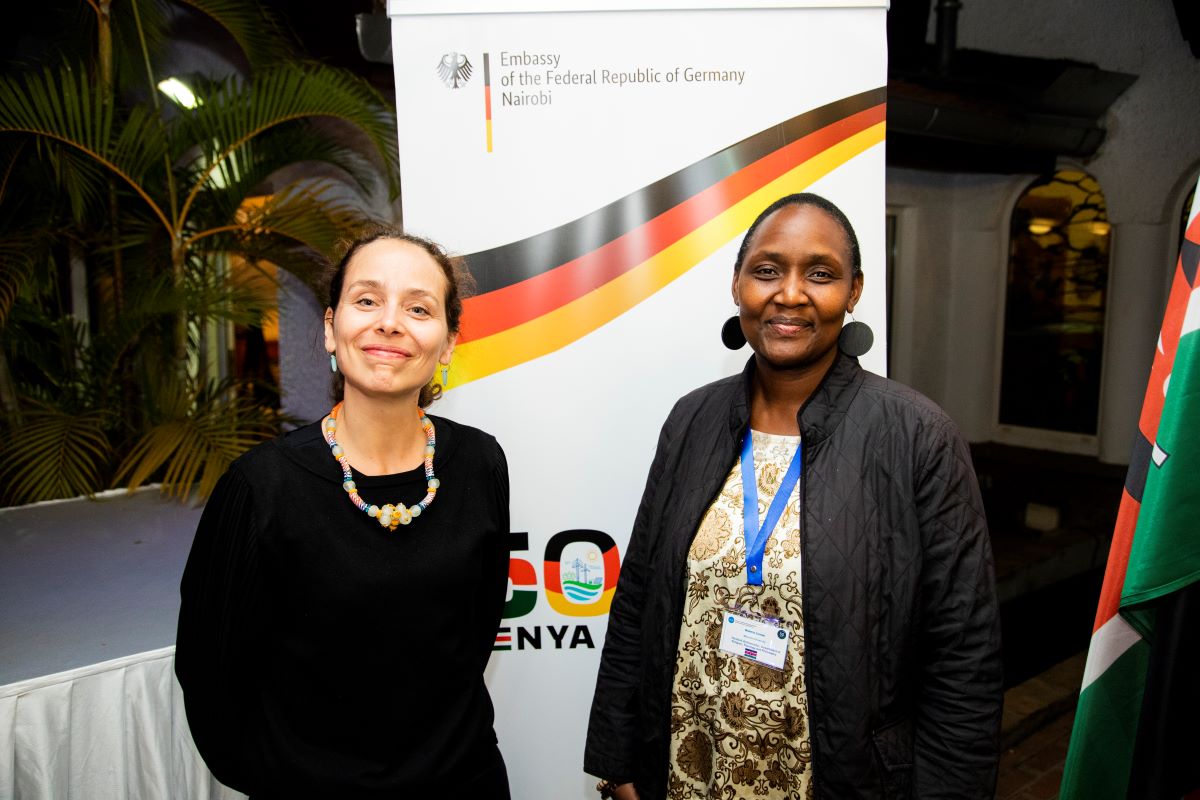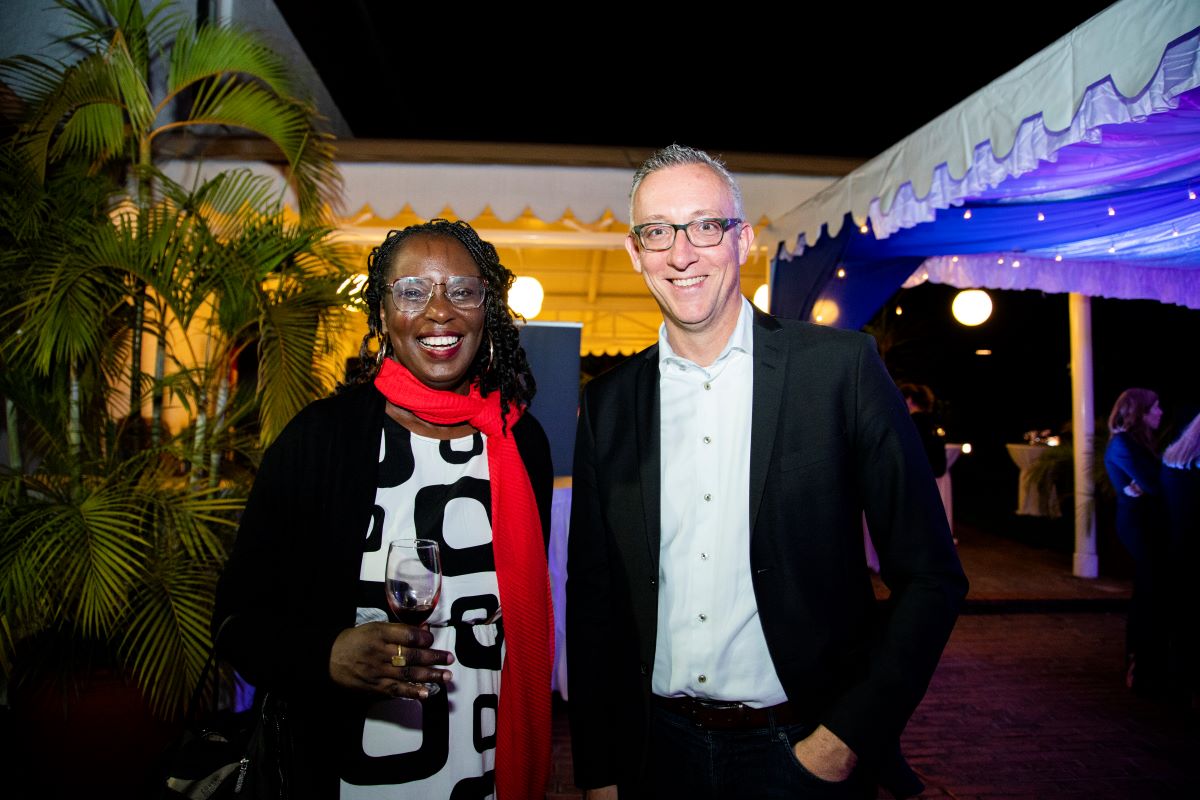- 50 Years DAAD in EA
- Welcome Address
- 1970s
- 1980s
- 1990s
- 2000s
- 2010s
- 2020s
- Directors
- Alumni Gallery
- Celebration Events
- Alumni Event Picture Gallery
- Science Forum Picture Gallery
- Reception Pictures
Welcome Address
For 50 years, the DAAD has been represented by a regional office for Africa in Nairobi, Kenya. For half a century, the DAAD, with its staff, lecturers, and large alumni network, has been providing information in eastern Africa about Germany as a location for study and research and advising on funding opportunities, scholarships, and university cooperation.
Germany enjoys a good reputation as a partner country for universities, business, and political relations. The German-African scientific relations, together with the diplomatic relations, which look back on 60 years in 2023, have shaped the biographies of many alumni and are visible in the regional diversity, in the diversity of cultures, disciplines, and scientific traditions.
We are pleased and proud to have fostered over 50 years of distinguished careers in East Africa, namely in Ethiopia, Burundi, Kenya, Rwanda, South Sudan, Tanzania, and Uganda: People with impressive experiences, encounters, and stories that have triggered and are triggering lasting developments and impact in their countries.
In our Alumni Gallery, we present 50 alumni from 50 years of DAAD work in East Africa. Read more about their professional careers and celebrate with us the many years of good German-academic relations with partners and alumni in East Africa.
Have fun reading!
1970s
… From humble beginnings to a regional office
Political change and a new development paradigm
In 1973, the two German states – West Germany and East Germany – had just ratified the so-called Basic Treaty, or basic treaty, which assured each country’s sovereignty. Both countries became new members of the United Nations (UN) and, in the 1970s, East and West Germany took the lead in shifting foreign aid priorities and emphasising education as a key to economic development.
In the same year, Kenya was preparing to celebrate ten years of independence. The general public felt that certain elites had profited from independence, that economic growth and its benefits were unevenly distributed, and that little progress had been made in poverty reduction. This even led to violent strikes, the expulsion of students from the University of Nairobi (the only university in the country at that time) and the subsequent closure of the university. In this context, J.M. Kariuki, a Kenya African National Union (KANU) politician and a close aide to President Jomo Kenyatta, coined the famous phrase: “Kenya has become a nation of 10 millionaires and 10 million beggars.”
Education plays a leading role
As part of the policy shift, the West German Federal Ministry for Economic Development and Cooperation (BMZ) directed its funding according to the motto “help people help themselves”. Education was considered the key to success. The BMZ provided initial funding to enhance DAAD programmes within Africa and strengthen In-Country and In-Region programmes, with the goal of stopping the brain drain from African countries and universities. This included funding German lecturers at African universities as a way of supporting postgraduate programmes and capacity- building of future lecturers.
The president of the World Bank at the time, Robert McNamara, delivered a land-mark speech in September 1973 in Nairobi. As a result, the focus of aid efforts was shifted to basic human needs, including food security, housing availability, health care, education and political participation.
After the DAAD branch office in Nairobi was established in 1973 the focus during the first years was mainly liaising with stakeholders and analysing the systems of higher education in the different countries and, starting in 1975, the DAAD Nairobi office concentrated on the funding of postgraduate studies. When the political situation in Uganda forced Ugandan students to flee to Kenya, the DAAD started a special refugee scholarship programme. In addition, the DAAD helped establish a partnership between the universities of Munich and Nairobi in 1978 to train ophthalmologists in Nairobi.
The Nairobi office was later upgraded to the DAAD Regional Office for Africa in 1979.
1980s
… Rethinking partnership
Making history
In 1982 Kenya became a de jure one-party state through a decision in parliament, which basically outlawed all official opposition. At the end of the 1980s, the winds of change swept through Eastern Europe, starting with Perestroika and Glasnost in the Soviet Union and culminating with the fall of the Berlin Wall in November 1989. The end of the bipolar world also had repercussions for Africa, as Western pressure on President Daniel Arap Moi began to mount. The crumbling of the Apartheid regime in South Africa could also be attributed to the new world order.
Tight budgets lead to new approaches
For the DAAD Regional Office for Africa, the new decade did not get off to a good start. Budget constraints forced a review of the In-Country programmes, which led to a drastic reduction of scholarships. The tight budget situation in 1982 even put the existence of the regional office at risk, but fortunately, last-minute allocation of funds secured its continuation. When the attempted coup forced the University of Nairobi to close for 14 months in 1982/1983, this was yet another disruption for the DAAD and its work. DAAD’s work in Nairobi was also influenced by a new approach to the relationship between donor and developing countries. The so-called “Brandt Report”, which summarised the findings of an independent commission at the beginning of 1980, made it clear that the goals set by McNamara’s speech in 1973 had not been achieved on a broad scale and that only a new economic world order could achieve these goals. The early 1980’s saw a shift from a biased North-South relationship to an equal partnership. The basic idea was to help developing countries to help themselves.
The BMZ provided funding to enhance the In-Country and In-Region (ICIR) programmes within Africa with the goal of stopping the brain drain from African countries and universities. The ICIR programme helped address the problem of staff shortages at Kenyan universities, with 75% of DAAD scholars finding their way into lecturer positions.
Innovative ways to build educational capacity
A wide range of other DAAD instruments were introduced in the 1980s to promote staff and capacity building at African universities. These made major contributions to the domestic education systems, which was more important than ever, since three additional universities were established in Kenya in the 1980s: Moi University in Eldoret (1984), Kenyatta University in Nairobi (1985), and Egerton University in Njoro (1987). This was an especially important milestone, since the growing number of primary and secondary school graduates meant that Kenya and other African countries had become increasingly unable to offer enough tertiary education facilities. In 1986, 10,000 students were enrolled in the three Kenyan universities while another 10,000 Kenyans were studying abroad.
1990s
… Winds of change
End of the Cold War – German reunification
The dramatic political events in Europe – the end of the East German state (GDR) in 1990 and the collapse of the Soviet Union in 1991 – were mirrored by political reforms in Kenya. The end of the Cold War had direct implications for the relationship between the international donor community. For Kenya, who enjoyed support of the West since independence, the end of the Cold War also meant the loss of unconditional support and thus a massive reduction in aid. With the advent of the 1990s, however, came a shift in discourse, which placed democracy, good governance and human rights on the agenda as touchstones for recipient countries. The struggle for a democratic Kenya, led by civil society leaders like Wangari Maathai and Chief Justice Willy Mutunga, thus continued.
For the DAAD, German reunification meant incorporating East German universities and scholarships into its own structures. Right away, the DAAD took over responsibility for some 8,000 foreign scholars studying in the former GDR and some 1,600 East German students studying abroad. Despite Berlin becoming the “new” capital of a united Germany in 1992, the DAAD’s office in Bonn was kept as the organisation’s headquarters.
Crisis in Eastern African
Events closer to Nairobi also had an impact on the work of the DAAD office: The genocide in Rwanda in 1994, Kabila’s seizure of power in Congo-Kinshasa in 1997, the Ethiopian-Eritrean war of 1999/2000 as well as the disastrous conditions in Somalia and South Sudan. These events led to an increased influx of refugees to Kenya, among them qualified graduates and postgraduates. These upheavals led to the enhanced support of refugee post-graduates from Somalia, Sudan, Ethiopia, Rwanda and Burundi through the In-Country and In-Region scholarship programmes.
“For Eastern African universities, the 1990s was a time of unrest, rife with strikes and subsequent closures, accompanied by political unrest and crises.”
Stemming the brain drain
One of the biggest challenges at the universities remained staff shortages. The DAAD’s In-Country scholarship programme played an important role in addressing these problems. Great progress was also made in connecting German and Kenyan universities through so-called sandwich scholarships. Another priority for the DAAD Nairobi office was to keep in touch with and support DAAD and former East German alumni from the various regions. This work was facilitated by the Nairobi Circular, a newsletter for DAAD alumni in Kenya and Eastern Africa.
2000s
… Changing challenges
The new millenium brings more attention to higher education
The new millennium also saw the launch of the New Partnership for Africa’s Development (NEPAD), which was adopted by the Organisation of African Unity summit in June 2001. One of NEPAD’s goals was to “promote networks of specialised research and higher education institutions.” To achieve this, the G8 and World Bank funding was increased for higher education, marking a policy shift away from an exclusive focus on primary education. For the DAAD regional office, these policy developments were encouraging – after all, the new policy goals had been its own focus for many years.
“Supporting alumni networks and networking in general, and cooperating with universities, international organisations and associations for the development of education in Africa remained high on the agenda.”
Focus on quality assurance and university management
One project involved collaborating with the Inter-University Council for East Africa (IUCEA) to establish a regional quality assurance system for higher education institutions (HEIs) in Kenya, Tanzania, and Uganda. A quality assurance manual was developed with local experts, and future quality assurance officers were trained at German and African universities. Pilot evaluations and peer reviews were also carried out.
The DAAD also expanded its university management activities in Eastern Africa with its programme Dialogue on Innovative Higher Education Strategies (DIES). The first co-financed grant programme in Sub-Saharan Africa was also launched. Another important DAAD initiative started in this decade was the Higher Education Excellence in Development Cooperation (EXCEED) programme, which provides support to institutions addressing the UN Millennium Development Goals and other development cooperation policy goals in an innovative way. This programme acknowledges that higher education cooperation is a key factor for sustainable development, and universities participating in the programme from the region include Egerton in Kenya, Sokoine in Tanzania and Jimma in Ethiopia.
Alumni affairs: Work that matters
Another activity close to the heart of the DAAD regional office was its alumni work. The Kenyan DAAD Scholars’ Association already had a viable network of 300 active members. DAAD alumni from Tanzania followed suit in 2008/2009, basing their organisation on the Kenyan model. A DAAD Scholars’ Association was also formed in Burundi in 2009. The alumni associations helped organize several conferences and training courses during this time, and in 2011 a new postdoc programme for African alumni was launched. As a result, other organisations now look upon DAAD alumni support as a best practice model − incentive enough to continue with the great work.
2010s
… Joining Hands
Joint scholarship programme
The DAAD Regional Office in Nairobi has evolved from a project office for scholarships to a network centre that promotes scientific cooperation between Eastern Africa and Germany at various levels – from individual scholarships and university partnerships to the advancement of university systems. Having been established in the 2000s, African-German Centres of Excellence continue to combine all these elements.
During this decade, the DAAD’s work focused on initiating and fostering joint efforts. Over 25 PhD candidates left Kenya for Germany each year to start their studies, three times more than before the launch of the Kenya-German Postgraduate Training Programme in 2010. And in 2014, the first group of freshly- minted PhDs from Tanzania – also products of a joint scholarship programme – returned home, where they were dearly awaited as university lecturers. In 2011, DAAD moved its coordination of the joint Quality Assurance Initiative with the Inter-University Council for East Africa (IUCEA) and the German Rectors’ Conference (HRK) to the Nairobi Office. Since then, the IUCEA has gradually taken over the leading role as well as half of the financing.
“DAAD is working to bring people together – and putting people first.”
The 2030 Agenda and the Sustainable Development Goals (SDG)
The 2030 Agenda for Sustainable Development was adopted in September 2015 with a historic consensus between the 193 member states of the United Nations (UN). It applies a holistic approach in order to work towards the transformation of the world for the benefit of global sustainable development. For the first time it covers all three dimensions of sustainability: the social, economic and environmental. The Agenda makes all the countries of the world responsible, the developing and emerging states just as much as the industrialised nations.
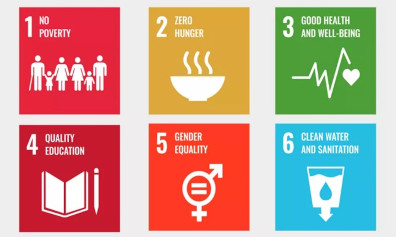
© SDGs
With funding from the Federal Ministry for Economic Cooperation and Development (BMZ), DAAD continued promoting higher education partnerships in areas that are relevant and contribute to the Sustainable Development Goals (SDG) in line with establishing high-performing cosmopolitan higher education institutions in the partner countries and in Germany.
The DAAD Regional Office celebrated its 40-year existence with numerous events in 2013.
2020s
… Transformation and Sustainability
Global challenges
The new decade started with a global challenge: the COVID 19 pandemic, which shut down public life worldwide, including schools and universities, and left people in uncertainty. But it also started the decade of digitalisation: online teaching, virtual meetings and conferences began booming and were the only possibility of continuation for academic exchange. The Corona pandemic also challenged the DAAD, as an internationally active science and scholarship organisation, to be more flexible and to manage the crises. The pandemic made it clear that global challenges can only be mastered through international science and research cooperation and networking.
With the growing global consensus on increasing climate responsibility, the DAAD stepped up its commitment to actively promoting climate protection and green transformation while at the same time further reducing the ecological footprint of its own actions. With the climapAfrica postdoctoral fellowship programme, the DAAD is making an important contribution in terms of a correspondingly multi-perspective approach. The programme is aimed at future leaders in the field of climate research and climate protection in Africa.
Strengthening international exchange while acting sustainably with a view to the challenges posed by the climate crisis means rethinking the way we deal with mobility: through new formats of virtual mobility and digital exchange, climate-friendly business trips, anchoring sustainability topics in the DAAD’s programme portfolio, and demand-oriented funding offers to achieve Agenda 2030 for the Sustainable Development Goals (SDGs).
“Open access to higher education is an essential contribution to equal opportunities.”
Diversity and Equal Opportunities
Creating equal opportunities for all people, regardless of their gender identity, social origin or living situation is one of the central goals of foreign and development policy. As the world’s largest funding organisation for the international exchange of students and researchers, the DAAD is expressly committed to diversity in its funding activities and in its organisational culture and to further increase diversity, equal opportunities and inclusion. On the African continent the DAAD makes an important contribution to this with its programmes, for example the “Leadership for Africa” aims to enable young talents from African countries with high refugee numbers to study for a Master’s degree in Germany.
Working through the past together
The DAAD is contributing to assuming historical and moral responsibility for the suffering that has arisen for people in many countries in Africa and Asia and is laying the foundations for future international academic cooperation in colonial research. The funding programme “German Colonial Rule” for young academics from Africa, Asia and the Pacific aims at the decolonisation debate and supports research into Germany’s colonial past.
Directors
1973 – 1975: Dr. Wolfgang Armbruster
1975 – 1979: Dr. Hans-Joachim Diesel
1979 – 1985: Hartmut Glimm
1985 – 1994: Hans M. Helfer
1994 – 2001: Richard Jacob
2001 – 2005: Cay Etzold
2005 – 2010: Gabriele von Fircks
2010 – 2014: Christoph Hansert
2014 – 2019: Dr. Helmut Blumbach
2019 – 2023: Beate Schindler-Kovats
Alumni Gallery
Abate Aggrey Lemi, South Sudan
Department of Animal Production
Former Vice Chancellor, University of Juba, South Sudan
DAAD Doctoral Scholarship from 1980 to 1984
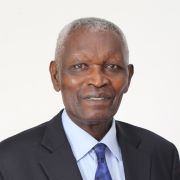
© Private
Prof. Dr. Aggrey Lemi Abate is a specialist in animal nutrition and the broader areas of food security and poverty reduction. He served as Vice Chancellor at the University of Juba, South Sudan. He had previously held the position of Dean of the College of Natural Resources and Environmental Studies at the University of Juba and was the Founding Head of the Department of Animal Science at the University of Namibia. For a decade, he taught at the University of Nairobi in Kenya. He has also served on committees and task forces at all three universities.
Prof. Abate has published widely in peer reviewed journals and has edited chapters in books and articles in conference and workshop proceedings. He has also carried out many consultancies in line with his specialization. He has been a member of various scientific bodies in eastern and southern Africa.
Prof. Abate continuously shares his expertise in interactions with key relevant Ministries in South Sudan. He is a founding member of the South Sudan Nature Conservation Organization and has been a member of the National Council for Higher Education, the South Sudan Examinations Council and the Board of Directors of South Sudan Urban Water Corporation.
Prof. Abate has studied in Europe and East Africa and holds a PhD from the University of Bonn. Before coming to Germany, he was employed as a Teaching Assistant at the University of Juba while pursuing an MSc at the University of Nairobi, which was partly supported by the DAAD.
“My DAAD scholarship, which took me to Bonn, influenced my professional approach to things. Most of all, it enhanced my attention to detail and precision. It also prepared me well for the challenges I have met as an academic in the years since my return from Germany.”
Adong Betty Bashir Mamoun, South Sudan
Intercultural Conflict Management
DAAD Scholarship (2019-2021)
Funded by the Civil Society Leadership Award (CSLA)
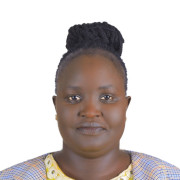
© Private
Her passion for humanitarian work started when she was in Acholi-Pii Refugee Camp in northern Uganda in the year 1998. She comes from a society where boys are given opportunities while girls are given less consideration. She has seen women and young girls denied opportunities even when they had the potential, all because of stereotypes. The low literacy rate of women and girls has motivated her to pursue higher levels of education.
“You cannot make it, this is competitive, a young woman like you needs to settle and take care of her home.”
Her first degree was in procurement and logistics management. In 2019, she was awarded a scholarship through the Open Society Foundation to study in Germany and pursue her Master’s Degree in Intercultural Conflict Management at Alice Salomon Hochschule-Berlin. She heard about the CSLA scholarship programme through a friend. The scholarship with an internship in Berlin and the course in intercultural conflict management enabled her to focus on a number of important issues, such as gender-responsive education, systems of oppression and multidisciplinary approaches to gender, especially in South Sudan. She wrote her master’s thesis on how to help girls bridge gender inequalities in school retention and educational attainment for young girls in South Sudan, given the high rate of early marriage.
Until today, she has aimed to strengthen mechanisms that help overcome the binary thinking that pervades most development interventions, especially in her home country of South Sudan. She has worked at various levels, both at the state and national levels, to promote girls’ education and the rehabilitation of former child soldiers in South Sudan.
Agure Erick, Kenya
Technical Officer-Research and Documentation (Consultant) at the World Health Organization
DAAD Scholarship: EPOS (2019 – 2021)
Carlo Schmid Fellow 2021–2022, UNAIDS in Johannesburg, South Africa
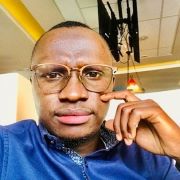
© Private
Erick Agure earned his Bachelor’s degree in Public Health from Kenyatta University in Kenya and was accepted to the Heidelberg Institute of Global Health to complete his MSc in International Health with a DAAD Scholarship. He worked as a Research Coordinator at the Heidelberg Institute of Global Health in Collaboration with the Kenya Medical Research Institute (KEMRI) and graduated with a PhD focused on Nutritional Epidemiology on an Implementation Project between Heidelberg University and KEMRI. His goal is to bridge the gap between science and practice; implementing proven scientific findings to improve the overall well-being of society.
He lived and studied in Germany and has seen and appreciated that girls have the same educational opportunities as boys: Girls in industrialized countries can mostly develop and decide for themselves what they want to do with their lives. Back in his home country, he is committed to ensuring that African girls also get these opportunities.
He is convinced that everyone can contribute to this change: by participating in political conversations and debates, mentoring girls, being a positive influence on parents, and being vigilant when girls are treated unfairly and unequally:
“We should all stand up for girls’ rights and fight for a fair world for all.”
Source: “Sorry African Girl”, Alumniportal Deutschland (alumniportal–deutschland.org)
Akia Brenda, Uganda
Lawyer
DAAD Scholarship (2011)
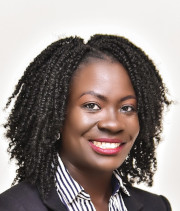
© Private
Brenda Akia is a Ugandan human rights lawyer passionate about using her legal and research skills and competence in international human rights, international law, humanitarian law, transitional justice, environmental law, and international criminal law to challenge discriminatory and abusive laws, promote accountability for rights violations, address impacts of climate change, and advance women and girls’ rights.
Brenda graduated in 2011 with an LL.M. in Transitional Justice of the African-German Research Network for Transnational Criminal Justice (AGRN), a Centre of African Excellence, supported by the DAAD based on a cooperation between Humboldt-University of Berlin and the University of the Western Cape (UWC).
She will be the first Ugandan woman to be elected to the United Nations Committee on the Elimination of Discrimination against Women (CEDAW) for the term 2023-2026, the first Ugandan to score this prestigious role.
She has documented rights violations against women and girls in countries such as Tanzania, Uganda, Malawi, Kenya, South Sudan and the 12 ICGLR Member States. She is also active to advance climate justice, including the need to address the impacts of climate change on migration.
She gained work experience at the international and national level, including the Women’s Rights Division at Human Rights Watch in New York, Chambers Appeals Division of the International Criminal Court (ICC), The Hague (The Netherlands), where she is listed as Assistant to Counsel, International Organization for Migration (IOM), the Uganda Association of Women Lawyers (FIDA Uganda), Kampala (Uganda) and the United Nations International Criminal Tribunal for Rwanda, Arusha (Tanzania) as a legal researcher.
In March 2023, she received the Diamond Jubilee Medal from the Government of Uganda for her exemplary role to the nation and is a Laureate of two human rights awards: the Franco-German Peace and Reconciliation Award from the French and German Embassies in Uganda; and the Women for Women Human Rights Award.
Anywar Godwin, Uganda
Ethnopharmacologist/Plant Scientist
DAAD Scholarship (2016 – 2019)
Funded by the DAAD In-Country/In-Region Scholarship Programme
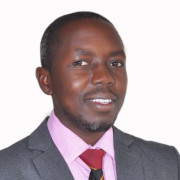
© Private
Dr. Anywar Godwin is a researcher, academician, entrepreneur and author. He completed his doctorate at Makerere University, Kampala, which included a research stay at the Fraunhofer Institute for Cell Therapy & Immunology in Leipzig, Germany and the University of Leipzig. He investigated medicinal plants used by herbalists /traditional medicine practitioners for treating people living with HIV/ AIDS in Uganda, trying to find out whether they show any activity against the virus, or whether they are toxic.
“Some plants are very toxic, others are able to stimulate the immune system against the virus”, he found out, “but they can only serve as complementary treatment, not a cure.”
He currently lectures at the Department of Plant Sciences, Microbiology & Biotechnology at Makerere University. He is interested in natural product development, the study of various properties of drugs especially medicinal plants as well as the traditional knowledge and customs of a people concerning plants and their medical, religious, and other uses (ethnobotany).
His research stay in Germany opened doors for him. “You read people’s work, but it is a different feeling when you get to meet the world leaders in your field in person – it opens your mind and it opens doors for collaboration.”
In 2023, he became a fellow of the Global Young Academy (GYA) where he met like-minded scholars eager to push barriers and to contribute and change the world in which they live. He already joined a working group that looks at new ways to measure how scientists make a difference to local communities. His passion though, a reflection of his nature, he says, is mentoring young scholars, especially those doing health related research.
Aloo-Obudho Peninah, Kenya
Fisheries Ecologist
DAAD Scholarship (1991 – 1996)
Funded by the DAAD In-Country/In-Region Scholarship Programme
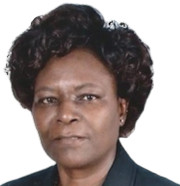
© Private
Peninah Aloo-Obudho is a professor in Fisheries Ecology. The DAAD funding to pursue her PhD at Kenyatta University enabled her rise from tutorial fellow to becoming a full professor in 2018 and currently serving as acting Vice-Chancellor of Maasai Mara University in Narok County, Kenya. She served as the National Chairperson of the Kenya DAAD Scholars’ Association (KDSA), the third chair and first woman in that position, from 2002 to 2006 and later founded the Mount Kenya chapter.
An eye opener and even a game changer in her career was the UNISTAFF training in Germany in 2007. The knowledge on leadership Aloo-Obudho gathered there has been vital: “I learnt to use ideas from people who are opposed to my views and not to push them aside. This lesson really touched my heart and has remained very useful to me.” In the spirit of bringing other people on board and localizing the training, she organized a team of DAAD Scholars that went for UNISTAFF training and International Deans Course (IDC) to develop a guide for training top university leaders. The training guide co-authored with Prof. Frank Ziegele of the University of Osnabruck was completed in 2018, accredited by the Commission for University Education (CUE) and approved by the Ministry of Education. A total of 25 Vice-Chancellors and Principals of University Colleges have been trained using the guide.
She has organized over 10 local and international conferences, seminars and training workshops both at Kenyatta University and Karatina University, most of them supported by DAAD. In 2017, she led a team of DAAD Scholars that won a National Multiplication Training project for Deans and Directors on Quality Leadership and Management in Higher Education.
“DAAD does not just give you a scholarship”, Aloo-Obudho points out. “DAAD helps you grow in your career when your scholarship has long ended. The organization is really interested in their alumni.”
Bartalam Deng Bulis, South Sudan
Public Health
DAAD Scholarship (2022 – 2023)
Funded by the DAAD In-Country/In-Region scholarship programme
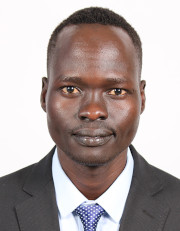
© Private
Deng is a South Sudanese refugee living in Sherkole camp in Ethiopia. He is currently pursuing, with DAAD funding, his Master’s degree in Public Health at Mount Kenya University, Kenya.
He attended primary school in Kurmuk, a county on the border of Sudan and Ethiopia, until September 2011, when clashes erupted between the Sudan government and the SPLA (Sudan People’s Liberation Army).
“Many houses were burned, and many people were killed. My brother and I rushed into the bush, where we hid before crossing the border to Ethiopia. In Sherkole, we got registered as refugees a month later and enrolled at the primary school. When another war arose in Ethiopia, almost all the services for refugees were suspended. We faced challenges getting our usual monthly ration on time.”
The first time I learned about DAAD was through a friend who was studying in Germany at the time. He sent me a link about the DAAD Leadership for Africa Scholarship Programme. I applied, but unfortunately got rejected. I did not give up there. Again, the DAAD launched another scholarship (In-Country /In-Region), where I applied and got accepted to pursue a master’s in public health at Mount Kenya University, Kenya. I was very excited when I got the acceptance letter. To me, it was a dream come true.
I would like to work for an international non-profit organisation, particularly on health-related projects. I also have a plan to pursue my doctorate in the future.
Bazivamo Christophe, Rwanda
Agricultural Economics
DAAD Scholarship (EPOS)

© EAC
Christophe Bazivamo is the Rwandan High Commissioner to Nigeria. He worked before as the Deputy Secretary General in charge of Productive and Social Sectors in the East African Community (EAC). Prior to his appointment as Deputy Secretary General, he was a Member of the East African Legislative Assembly (EALA). Between 2009 and 2011, he held various Ministerial positions in the Republic of Rwanda, including Minister for Lands, Environment, Forestry, Water and Mines, Minister of Local Government and Minister for Agriculture and Animal Resources among others.
He joined the National University of Rwanda in 1981 where he graduated with a Bachelor’s Degree in Agro-Engineering. Between 1988 and 1989, he worked as a teacher. He later on pursued his Masters’ Degree in Social-Economics from the University of Goettingen in Germany before working with NGOs.
Christophe Bazivamo is an Agricultural Engineer by profession and holds vast experience as a trainer. He worked with a number of NGOs before joining the Public Sector as a Governor and later on as the First Executive Secretary of the Rwandan National Electoral Commission (NEC) from where he was appointed a Minister.
His DAAD scholarship actually did not begin on a good note. He had to leave his home country earlier than planned because of the genocide in Rwanda in 1994. So his start in Germany was rather difficult, not so much because of the new situation in Germany, but because of the situation back home in Rwanda.
This made it all the more meaningful to him to receive such a warm welcome in Göttingen in his German course at the Goethe Institut. The DAAD scholarship made it possible for him to meet people from different cultures and backgrounds, which, to him, opened him up and gave him greater confidence when interacting with other people. The academic level he reached through his DAAD scholarship, combined with the time management and planning skills he was able to develop, has helped him tremendously in his efforts to build up his country in the various political positions he has held since 1999.
Having been affiliated with the German Technical Cooperation (GTZ) as a project leader, choosing the DAAD and Germany for his studies was the natural choice. In Rwanda he was part of the team that put together a network of DAAD alumni. In 2023 he was appointed the new Rwandan High Commissioner to Nigeria.
Boga Hamadi Iddi, Kenya
Microbiologist, Former Vice Chancellor, Former Principal Secretary
DAAD Scholarship In-Country Kenya (1992 – 1994) and PhD in Germany (1996 – 2000)
Funded by the DAAD Research Grants – Doctoral Programmes in Germany
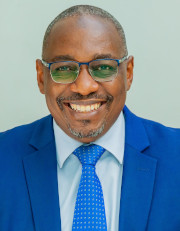
© Private
Not only did the DAAD scholarship enable him to become a leading Kenyan scientist in Microbiology, but it also provided him with a strong network and mentoring in administrative leadership:
Hamadi Iddi Boga, founder and from 2007 to 2017 Vice Chancellor of TaitaTaveta University and the Chairman of the National Council of Science and Technology Committee for Developing Bioscience Policy, has served in various academic capacities since his return from Germany after completing his PhD, including as a full professor in Microbiology at JKUAT.
As the head of the DAAD Alumni Association in Kenya for many years. Prof. Boga who is also a Humboldt Alumni, served as the Ambassador Scientist for the Alexander von Humboldt Foundation in Kenya (2010-2014). He is also a founding member of the African- German Network for Excellence in Science (AGNES), the Kenya Society for Microbiology and, as an Alumnus of the International Deans’ Course, was the Secretary of the Eastern African Network of DIES University Management Alumni (REAL).
Between 2018 and 2022, as Principal Secretary of the State Department for Crop Development and Agricultural Research in the Ministry of Agriculture, Livestock and Fisheries, he was in charge of driving agricultural transformation in Kenya – until running for governor of his home County of Kwale during the 2022 general elections. Since then, he works as a consultant for national and international organizations.
“I learned to understand and appreciate other cultures while being comfortable in my own. Germans and Kenyans have a lot in common – they enjoy football, are preoccupied with politics and work hard.”
Borgemeister Christian, Germany
Entomologist, Professor for Ecology and Natural Resources Management
Project funding for: ICIPE (ARPPIS Programme), University of Bonn (ZEF – EPOS Programme), African Climate and Environment Center – Future African Savannas (AFAS) (DAAD Global Climate and Environment Center)
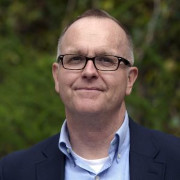
© ZEF
Christian Borgemeister is a Director of the Center for Development Research (ZEF) and Professor for Ecology and Natural Resources Management at the University of Bonn. He was appointed in 2013 at ZEF and from 2014 to 2022 also served as Managing Director of the Center. Previously, he was the Director General of the International Centre of Insect Physiology (icipe), a Nairobi, Kenya headquartered pan-African R&D Centre.
Christian Borgemeister is a trained entomologist and has worked for more than 20 years in West and East Africa, South East Asia and Latin America. He is a Fellow of the African Academy of Sciences, the Royal Entomological Society, the Entomological Society of America (ESA), Member of the Council of the International Congress of Entomology and from 2020-2023 was the Chairman of the Board of the International Institute of Tropical Agriculture (IITA – www.iita.org). He has been the recipient of the 2011 International Plant Protection Award of Distinction of the International Association for the Plant Protection Sciences (IAPPS), and the 2015 Distinguished Scientist Award of ESA’s International Branch.
His first encounter with DAAD was a partial travel grant he received as a student in the early 1980s for a 6 months’ study leave in New Zealand. There, he had planned to work on a sheep farm, but to receive the DAAD grant, he included a small research project on deer hunting and deer farming in his application.
During his time at icipe, DAAD was the principal donor of the Centre’s flagship capacity building programme, the African Regional Postgraduate Programme in Insect Science (ARPPIS). DAAD’s support assured a constant influx of highly motivated young African scholars conducting researching at icipe and its partners. After moving to ZEF in Bonn, he realized how crucial the DAAD support, in the form of a long-standing DAAD EPOS grant, was for the Centre’s PhD program. For the last 2.5 years, ZEF has been proudly coordinating, together with partners from Abidjan, Nairobi and Cologne, the African Climate and Environment Center – Future African Savannas (AFAS), one of the four new DAAD Global Climate and Environment Centers.
Only recently did Christian Borgemeister learn that DAAD is the world’s largest academic stipend provider. It is typical for Germany, he ponders, that nobody, especially in the political sphere, highlights this. “Yet, what a tremendous soft power capacity is encapsulated here. Who can mobilize an influential and sizeable alumni network around the globe like DAAD?”
Dinku Abebe, Ethiopia
Civil engineer
Vice-President for Institutional Development of Addis Ababa University
DAAD Doctoral Scholarship 1991-1996
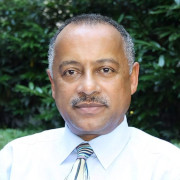
© Private
Professor Dr.-Ing. Abebe Dinku is the Vice-President for Institutional Development of Addis Ababa University and Chairholder of Construction Materials and Management at the School of Civil and Environmental Engineering, AAiT (Addis Ababa Institute of Technology), Addis Ababa University, Ethiopia. He is a civil engineer by profession who studied for his BSc degree at Addis Ababa University (1982); obtained MSc and MPhil degrees from the University of Leed (1987, 1991) and his Dr.-Ing. from the University of Stuttgart, Germany (1996).
Abebe Dinku is an experienced Civil Engineer with a demonstrated history of working in the research industry. He is active in teaching and practical research activities and provides consultancy services, both to local and international organizations. He is a Founding member and Fellow of the Ethiopian Academy of Sciences and Editor in Chief of ZEDE, Journal of Ethiopian Engineers and Architects. He has been a regional trainer for the DIES-IDC (International Deans’ Course) since 2007.
He has accompanied the DAAD for years with reviewer activities for selections and in university management programmes.
Since July 2023 he is the Chairperson of the Association of Ethiopians Educated in Germany.
Farah Ibrahim, Somalia
Political Scientist, International Relations expert
DAAD Scholarship: Refugee programme in Kenya (Master: 1998-2001, PhD: 2001-2005)
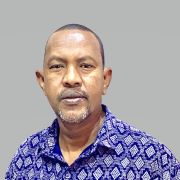
© Private
“In 1998, I was a refugee who was supposed to be in a camp. Today I am a distinguished professor who has taught all over the world.” Ibrahim Farah’s academic journey is nothing short of remarkable. With a Bachelor’s degree in Political Science from his home country Somalia, he arrived in Kenya’s capital Nairobi, determined to pursue higher education. “I fought hard to get my refugee status document from the UN Refugee Agency”, he remembers. “Because with this small piece of paper, I was able to apply for the DAAD scholarship and stay in Nairobi to study.”
After earning both his Master’s and PhD degrees from the University of Nairobi with support from DAAD, Ibrahim Farah returned to Somalia in 2020 where he is distinguished professor of International Relations at the University of Southern Somalia in Baidoa. He also teaches international relations, public and foreign policy at SIMAD University, City University and Jazeera University, all based in Mogadishu.
Ibrahim Farah is the founder of the Mogadishu-based Justice and Peace Network, a political movement bringing together people of good will, such as academics, youth, activists and the diaspora to push for political dialogue, lasting peace, honest state institutions, job creation and quality education in Somalia. Service to the community is at the center of Ibrahim Farah’s activities.
„The DAAD scholarship opened my scope of thinking – from being an African from the Horn of Africa, I turned into a globalist, an internationalist who believes in education as a tool of human capital development.” The full scholarship that guaranteed that rent was paid and the family taken care of, that he could buy books and carry out his research still humbles the traumatized refugee that Ibrahim Farah was. “Generosity, kindness and most of all humanity is what the German government showed me”, he says. “In return, I am working to give back to my community – exactly what the DAAD wanted.”
Göckel Sophie, Germany
Funded by DAAD “Lehramt International” at the German School Nairobi 2022
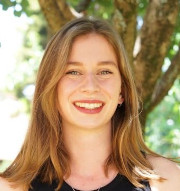
© Private
Sophie Göckel is a 26-year-old trainee teacher at two schools in Hesse. Previously, she was a student teacher at Philipps-Universität Marburg with the extension subject Geography. She passed her First State Examination in Biology and Ethics in spring 2021. In 2022 she was doing an internship at the German School Nairobi (DSN) as a scholarship holder in the program Lehramt.International of the German Academic Exchange Service.
Already during her school years she spent a school year in Cape Town, South Africa and thus had the opportunity to get to know foreign cultures and languages very early. The experiences she had then – and more recently during her Erasmus semester in Perpignan, France – had a significant influence on her attitudes and broadened her horizons a lot. In her opinion, the teaching profession also involves intercultural competencies. Through her time in South Africa and visits afterwards, her interest in getting to know the African continent better grew.
“The internship abroad promotes a change of perspective and multi-perspectivity. Cultural influences change the way we look at the world and thus the way we view the subjects we learn as well as our encounters with other people.”
After the internship, she completed her studies in geography and started her traineeship in Hessen in the fall of 2022, which she will finish with the Second State Examination in spring 2024. She is really looking forward to the time afterwards and to the full start of her professional career, and she will see whether she will be able to work as a fully qualified teacher at a German school abroad again afterwards.
Habinshuti Japheth Ndora, Rwanda
Consultant at the Global Covenent of Mayors for Climate and Energy, Africa Region
DAAD Master Scholarship „ SPRING “2014-2016
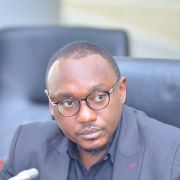
© Private
Japheth Habinshuti is an Urban development policy and resilience expert who received a DAAD scholarship to study International Joint Master of Science SPRING – Regional Development Planning and Management in 2014. The program improved his intercultural skills. He loved the intensive practical “planning workshops” that taught him program/project planning, administration, and group facilitation.
After graduating in July 2016, Japheth received the Carlo Schmidt Scholarship for developing leaders. This opportunity led to his life-changing internship in UNESCO’s Kinshasa headquarters in the Democratic Republic of Congo. In this role, he contributed to UNESCO’s Man and the Biosphere (MAB) and International Hydrological Programs (IHP), helped write the National Policy on Scientific Research and Technological Development, and led science-driven disaster risk reduction initiatives in Kivu, DRC. He then worked as a consultant for UNESCO, helping shape its DRC strategy for 2018–2021. Japheth was also skilled at funding climate-resilient livelihoods and improving governance.
He then became Kigali’s Chief Resilience Officer (CRO) in 2019 after consulting for Rwandan private enterprises and NGOs. Japheth led global climate change, catastrophe risk reduction, and social inclusion projects in Kigali as a CRO, representing African CROs on the Resilient Cities Network’s steering committee. His greatest achievements include creating Kigali’s first Resilience Strategy, winning the 2021 Bloomberg Global Mayor’s Challenge for his city, and mobilizing City Climate Finance Gap Fund resources for nature-based flood risk mitigation.
Japheth became Regional Technical Support Consultant for Africa at the Global Covenant of Mayors for Climate & Energy (GCoM) in May 2023 due to his dedication. He empowers African cities and local governments to use Gap Fund financing to turn their resilient low-carbon ideas into plans and finance-ready projects.
Japheth has inspired young minds at events like the Crystal Horizons Youth Centre’s 2016 regional boot camp in Johannesburg and the 2020 Third Africa Youth Sustainable Development Goals Summit in Ghana, where he expertly guided sessions on the integral role of youth in realizing the Sustainable Development Goals.
Ikobwa James Meja, Kenya
Lecturer and Subject Head (German) University of Pretoria
DAAD Postgraduate, Postdoctoral and Research Scholarships:
2003-2005: In-Country, University of Nairobi , 2003: Humboldt-Universität zu Berlin
2007-2008: Eberhard Karls Universität Tübingen, 2010 and 2017: Universität Leipzig
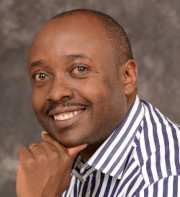
© Private
James Meja Ikobwa serves as a Lecturer and Subject Head (German Studies) at the University of Pretoria in South Africa. He attained his PhD in 2013 from the University of Stellenbosch, focusing on the theme of “Remembrance and Genocide in the Contemporary German Historical Africa-Novel”.
From 2007 to 2019, Dr. Ikobwa was engaged in scholarly activities, acting as a Lecturer at the University of Nairobi while also dedicating a portion of his academic commitment to Strathmore University. In recognition of his scholarly contributions, he received the DAAD Jacob- und Wilhelm-Grimm Incentive Prize in 2005, becoming the first African to achieve this international distinction.
Between 2009 and 2012, Dr. Ikobwa assumed the role of Regional Coordinator for East and Central Africa within the German African Network of Alumni and Alumnae (GANAA). GANAA focused on multilingualism and language policies across African and European contexts.
From 2015 to 2019, Dr. Ikobwa served as the Founding President of the Association for German Studies in East and Central Africa (GOZA). His leadership facilitated the publication of “Das Zentrum bewegt sich: Aufsätze zur (ost-) afrikanischen Germanistik” (2018), which he co-edited. He is actively involved with the Association for German Studies in Southern Africa (SAGV).
Dr. Ikobwa contributes as an occasional Peer Reviewer for the Journal ACTA Germanica – Jahrbuch des Germanistenverbandes im Südlichen Afrika. He is also a member of the Editorial Board of eDUSA, a publication focused on teaching German within the context of southern Africa. His academic pursuits led him to undertake postgraduate and postdoctoral research at German universities, facilitated through DAAD sponsorships.
Central to his pedagogical approach is the cultivation of critical and self-reflective engagement with the target language. He seeks to comprehend foreign language acquisition intricacies, particularly in multilingual contexts, while fostering heightened language consciousness. His approach also encourages profound introspection into one’s native language, often overlooked despite its foundational significance.
Kaale Eliangiringa, Tanzania
Pharmacy
Muhimbili University College of Health Sciences
Alexander von Humboldt Foundation: Georg Forster Research Fellowship Programme for experienced researchers in 2012.
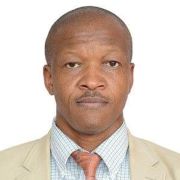
© Private
Prof. Dr Kaale is Professor of Quality Assurance and Regulatory Affairs in Medicine at MUHAS and has over 16 years of professional experience in the health and drug regulatory systems in Tanzania, Rwanda, Botswana, Afghanistan, Zambia, Eritrea and Ethiopia.
His research work was on analytical method development and validation, inter-laboratory cross-validation studies and now solid dosage form development with a focus on HIV and AIDS to support the local pharmaceutical industry in technology transfer. He worked on a collaborative project to develop a prototype smartphone app for on-site drug quality assessment in remote areas.
He is the EAC coordinator for external quality assurance (PT) of drug testing laboratories, a programme involving more than 20 laboratories organised under the EAC PTB project “Building a Quality Infrastructure for the Pharmaceutical Sector”.
He chairs the National Technical Committee for Registration of Medicines for Human Use and TFDA and the National Technical Committee for Pharmaceutical Standards at the Tanzania Bureau of Standards.
Dr Kaale is the coordinator of a designated Regional Centres of Regulatory Excellence (RCOREs), a consortium between the MUHAS and TFDA, and applied for NEPAD designation.
The Alexander von Humboldt Foundation awarded him a Georg Forster Research Fellowship Programme for experienced researchers in 2012. He has received several awards, including 2019: Muhimbili-Bergen University Partnership to Enhance Pharmacy Education and Research (PEPER), 2018: Award for Outstanding contribution to the standards from Expert Panel for the United States Pharmacopeial Convention (USP).
Dr Kaale was appointed by WHO as a member of the Expert Advisory Panel on International Pharmacopoeia and Pharmaceutical Preparations.
Source: Alumniportal Deutschland (alumniportal-deutschland.org)
Kabeza Claudine Balahali, Rwanda
Public Health specialist
DAAD Scholarship: Rwandan-German scholarship programme (2017 – 2021)
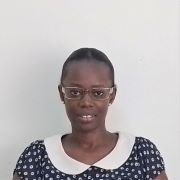
© Private
Claudine Balahali Kabeza completed her undergraduate degree in the Faculty of Nursing at Kigali Health Institute (Current University of Rwanda) in Rwanda. She completed her Master of Public Health at Manchester Metropolitan University in the United Kingdom and her Doctorate of Philosophy (Public Health) in the Faculty of Medicine Carl Gustav Carus at the Technical University of Dresden.
She has a background in General Nursing, Nursing Education and Public Health, practicing for 3 years as a clinical nurse and for more than 10 years as Nurse Lecturer in the School of Nursing and Midwifery at the University of Rwanda. She is currently the Coordinator of the Postgraduate Program of the School of Nursing and Midwifery, College of Medicine and Health Sciences at the University of Rwanda.
Her long-term research focus is on diabetes education. She has been instrumental in developing the content of Kir’App, the first Rwandan Diabetes self-management smartphone application which was the topic of her PhD dissertation. In partnership with the Rwanda Diabetes Association and the Rwanda Biomedical Centre she developed a manual for a Diabetes Educational Camp Program for Type 1 Diabetic Youth “DECamP for T1 Youth’. “The exposure to innovative research methodologies and practices in Germany laid a solid foundation for my future career as a diabetes educator and specialist“, Dr. Kabeza says. “The DAAD funding not only facilitated my academic growth but also provided a platform to make a significant impact on my society.“
During her PhD studies in Germany, she enjoyed learning German, exploring the country and immersing herself in Germany’s culture. The pinnacle of her DAAD scholarship experience in Germany though was the opportunity to work with a renowned supervisor in a prestigious diabetes research center.
Katikiro Robert, Tanzania
Marine Ecologist
DAAD Scholarship EPOS (ISATEC Bremen 2007 – 2009)
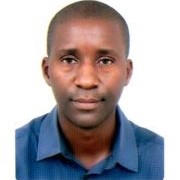
© Private
When Robert Katikiro discovered the art of making presentations from his fellow Master students at the University of Bremen, he knew he was in for a life-changing experience. “In 2007, I had left Tanzania for the first time”, he remembers. “In my Master course, I met students from South America, from Asia and other regions, and associating with them taught me so much. Had I stayed in Tanzania, as a marine biologist, I would have only known about the Indian Ocean. Now I had the chance to meet people working on the Atlantic Ocean, the Baltic Sea – it was a real exposure to the world where we shared our cultures and perspectives.”
Robert Katikiro received his BSc degree in Environmental Sciences and Management from Sokoine University of Agriculture in Tanzania in 2003, and his MSc (Aquatic Ecology) and PhD (Marine Economics and Social Science) from the University of Bremen in 2009 and 2014 respectively. Both his children were born in Germany. Currently, he is Senior Lecturer with the Department of Agricultural Economics and Business of the University of Dar es Salaam. Based on his broad and vast experience in ocean and coastal management, he supports non-state actors and the state in the implementation of community based natural resource management through policy advisory roles, consultancies and research, but also in marine spatial planning. To him, collaborations with interdisciplinary approaches are critical to support transitions for sustainable living and well-being which involves the active participation of citizens, private and civil society organizations and governments at various levels. His motto: Move out of your box. Use that experience to inspire others.
“From my DAAD scholarship in 2007 until today, I have been collaborating with a lot of people, it is connecting and connecting and connecting. It transformed my career.”
Kaweesi Edward Silvestre, Uganda
Political Scientist
DAAD Scholarship In-Country Uganda (2008 – 2009) and PhD in Germany (2012 – 2015)
Funded by the DAAD In-Country / In-Region Scholarship and Doctoral Scholarship
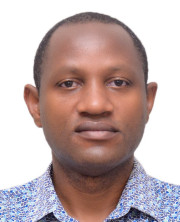
© Private
Edward Kaweesi is a Lecturer in the Department of Political Science and Public Administration at Makerere University, Uganda. He benefited from DAAD scholarships for both his Master of Arts, obtained at Makerere University, and his Doctoral Studies in Political Science at the University of Erfurt in Germany. He also received specialised training in Research Grant Writing from the University of Cologne under the DIES-DAAD ProGrant Programme. Kaweezi’s research agenda is on Political Ideas-Theories and New Frontiers of National Security.
Edward Kaweesi describes his association with DAAD as transformational on a personal level. “The PhD training in Germany got me out of my comfort zone”, he remembers. “One has to appreciate diversity to be part of the world.” He also considers his PhD scholarship as aiming at transforming societies through the knowledge he acquired. “I have transformed many lives, which means the scholarship benefited the whole society of Uganda.”
His studies in Germany trained him in approaching research philosophically and theoretically, contrary to the rather empirical thinking he was used to at Makerere University. Being able to marry these two approaches in his own research and teaching is what Edward Kaweesi considers a highlight from his stay in Germany.
In a collaboration with the University of Leipzig, he has been involved in developing a global handbook for conflict studies that seeks to merge the knowledge systems of the Global North and Global South to help solve conflicts. His current research projects include Political Theory Pedagogy and the dynamism of critical security in Africa.
Kidanemariam Tirussew Teferra, Ethiopia
Special Needs & Inclusive Education
DAAD Master Scholarship: 1984- 1986
DAAD Doctoral Scholarship: 1986 -1990
Alexander von Humboldt Foundation: Georg Forster Research Fellowship, 2019, 2020-2021
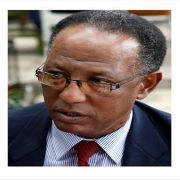
© Private
Tirussew Teferra is a Professor and Laureate in Special Needs Education and Inclusive Education at Addis Ababa University.
Having graduated in Psychology from Addis Ababa University, he earned a Master’s degree in Special Needs Education and Psychology of the Handicapped from Humboldt University of Berlin and went on to obtain his Ph.D. there in 1990. Following his return to his University in Addis Ababa, he initiated the establishment of the Department of Special Needs Education at Addis Ababa University, which is the first of its kind in the country. He has won a number of national and international honors for his outstanding contributions to research and innovation in the field of education, including the Jan Amos Comenius Medal, which is awarded by UNESCO in recognition of outstanding achievements in the fields of educational research and innovation.
He was the first researcher in Ethiopia to focus on the needs, early care, and rehabilitation of children with physical or mental disabilities, and his studies and research publications essentially established the subject of Special Needs Education and Inclusive Education as a scientific discipline in the country. In addition, he has become a leading advocate for the education of persons with special needs, not only in Ethiopia, but in the whole of Sub-Saharan Africa, and is a globally renowned professional in his field.
He is the author and co-author of scientific articles, book chapters, books, manuals, and instructional materials. His research and publications are on early intervention, care, and learning, focusing on children with special needs.
“Scientific Exchange with Germany shapes my life and my life’s work.”
Thanks to his initiative, special education was introduced as a scientific subject in Ethiopia. In this way, crucial research gaps could be addressed.
Kiiru Joy Mueni, Kenya
Economist
DAAD Scholarship EPOS (2004 – 2008)
Funded by the DAAD Development-Related Postgraduate Courses
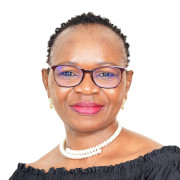
© Private
Dr. Kiiru is a senior Lecturer at the University of Nairobi’s School of Economic, specialising in applied development research. She holds a PhD from the University of Bonn, completed her Master’s in Malawi and obtained a BA from University of Nairobi. Her main research interests include social protection, trade policy, microfinance, food security, gender and development. She seeks to use research evidence to solve problems and improve the wellbeing of people. For her PhD thesis on the impact of microfinance on poverty reduction, she was awarded the First Prize Medal for Research on Development by the Global Development Network in 2010. She was also a finalist as an outstanding woman scientist at the Africa Science Week in Kenya in 2018.
“I believe that sound economic analyses are a prerequisite to increasing aid efficiency.”
Studying in Germany made her realise that with a good education, opportunities abound, and it is possible to afford a good lifestyle in Kenya. After initial difficulties getting integrated into her new surroundings in Germany, she grew more open-minded, according to her own observation, and became increasingly so through the interaction with people from different countries. She was able to live in an environment where she could think and interact openly. “I learned how important it is to express myself – no matter if others disagree – and to give others as well as myself space to grow.”
Kimani Natasha, Kenya
DAAD Scholarship 2011 – 2013
Funded by the DAAD Helmut Schmidt Programme for Public Policy and Good Governance (PPGG)
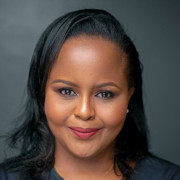
© Private
Natasha is the Head of Partnerships and Research at Africa No Filter. Her work entails leading fundraising and resource mobilisation and research within the organisation and managing relationships with funders and all external partners.
Before joining Africa No Filter, Natasha was the Head of Partnerships and Programmes at Shujaaz Inc. Before this, she was an Academy Fellow at Chatham House, the Royal Institute of International Affairs, where she focused on gender-responsive devolution in Kenya. She has also held senior positions at the Kenya Law Reform Commission and the Commission for the Implementation of the Constitution. A lawyer by profession, Natasha has extensive experience in public policy, constitution implementation, devolution, and governance in East Africa. She holds a Master’s degree in Public Economics, Law and Politics and a Bachelor’s in Law (LLB). She is also a Mo Ibrahim Fellow (2017) and a Mandela Washington Fellow (2016) and serves on Mzalendo Trust and Akili Dada boards.
Natasha earned her Master’s degree in Law, Politics, and Public Economics from Lüneburg University in the then newly established Helmut Schmidt Programme for Public Policy and Good Governance (PPGG) – an educational step that she considers a “real catalyst”.
“Whether in legal, policy, or programme management centred roles”, she says, “I have bent my career towards ensuring that my work represents and reflects the lived realities of those who are directly impacted by it.”
Kuma Getahun Mekuria, Ethiopia
Electrical Engineer, Former Minister of Science and Technology, and Former Minister of Education Federal Democratic Republic of Ethiopia
DAAD Doctoral Scholarship 2005–2008
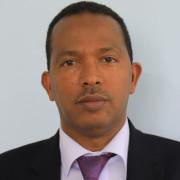
© Private
German technologies enjoy an excellent reputation worldwide – also in Ethiopia. That is why Getahun Mekuria Kuma, the doctor of engineering who was Minister of Science and Technology, and also Minister of Education of the Federal Democratic Republic of Ethiopia, sought out German experts early on.
After his Bachelor’s and Master’s degrees at Addis Ababa University (AAU) and four years of work experience as an electrical network distribution engineer with Ethiopia’s state electricity utility, the electrical engineer became head of the Technical Department at the Siemens subsidiary in Ethiopia. “That opened my eyes to Germany and German technologies”, he explains. “I remember very well my trips to Siemens headquarters in Munich and various production sites. German engineering made a lasting impression on me, and I yearned for more.”
Getahun Mekuria Kuma acquired his scientific expertise at the University of Duisburg-Essen (UDE) between 2005-2008. Powerline communications, which is still used in intelligent energy networks, was his focus.
Getahun became an electrical engineering assistant professor at Addis Ababa University in 2008. He was Deputy Scientific Director of the Addis Ababa Institute of Technology (AAiT) from 2012 until 2014. The DAAD alumni then began his political career as Director General at the Ministry of Science and Technology, where he oversaw the creation of the country’s only two science and technology universities.
In February 2016 he was appointed as State Minister and then in November 2016 as Minister of Science and Technology. Getahun’s major accomplishment as Minister of Science and Technology was the conception, follow-up, and successful launch of Ethiopia’s first satellite. Getahun returned as Education Minister in February 2020. He also chaired the government-owned power utility for five years, helping the Ethiopian government turn it into a technology-intensive company.
He was also the founding Board Chairperson of Ethiopia’s Communication Authority that led the liberalization of the world’s last frontier of gov’t monopolized telecommunication market. “Using Science and Technology, we can transform Ethiopia into a medium-income country within ten years”, says the DAAD alumnus. “I am ready to give my best to achieve this goal for the country I love most.”
Luyiga Regina Cissy, Uganda
Urban development planning
DAAD Scholarship 2020 – 2022
Funded by the (DAAD Development-Related Postgraduate Courses (EPOS) Programme
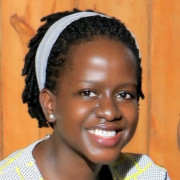
© Private
Regina Cissy Luyiga is a land management professional with great interest in the urban sector. She possesses a bachelor’s degree in Land Economics from Makerere University and a Master of Urban Management from the Berlin Institute of Technology. Having to study a master’s program in the COVID 19 period was challenging, but the team at TUB made it easier by providing a hybrid learning approach.
Having studied German language through her school years, she was always interested in the German culture and their way of life. When she learned about the DAAD scholarships from a peer, she grabbed the opportunity to apply and was fortunate to be selected. On a personal front, she received tremendous support from the DAAD team as an expectant mom, and this enabled her to complete the program on time.
Prior to her master’s studies, Regina worked with The Uganda National Roads Authority as a Land Valuer under the Department of Land Acquisition in the Directorate of Roads and Bridges Development. She improved her skills in stakeholder engagement, conflict resolution, and grievance management as a result of these projects. Prior to this, she worked on valuations for secured lending and assessment of municipal property rates.
She joined the World Bank Group as a Consultant on a Land Administration project in Uganda after finishing her master’s degree in March 2022. The initiative sought to enhance the National Land Information System and secure tenure for residents through the issuance of Certificates of Title among other project components. She is now working as an urban specialist for the Urban, Resilience and Land Global Practice, located in Kampala, supporting the execution of urban development projects in the nation’s capital, the surrounding metropolitan area, and subsidiary cities.
Her professional interests include issues around mobility, urban land use, housing for the poor, and informal land use among others.
Mangare Caroline, Kenya
Molecular Medicine (Immunology)
DAAD Scholarship (2013 – 2014) and (2017 – 2021)
Kenyan German Postgraduate Training Programme
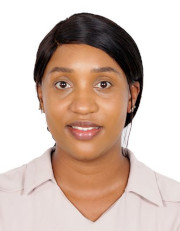
© Private
In 2017, when Caroline Mangare began work as a PhD student at the Medizinische Hochschule Hannover with a scholarship jointly funded by DAAD and the Government of Kenya, she could not have imagined how valuable her research would soon become. Her basic research on the immune system focuses on T cells that destroy viruses. Then came the COVID-19 pandemic. “The question now is what kind of therapeutic options can T cell research offer to help people suffering from chronic illness as a result of COVID-19,” says Mangare. This is also of significance for vaccinated people in her native Kenya. “We have many HIV and malaria patients, and we don’t know whether they can develop protective antibodies at all with the vaccination. There’s still a lot to be done,” stresses the 36-year-old researcher who is now advancing academic cooperation with Germany from Nairobi. There she works as a lecturer at the South Eastern Kenya University (SEKU).
Germany was a milestone for Mangare. “Access to the most advanced lab technology and an experienced research team gave me opportunities I wouldn’t have had in Africa.” She also liked the city. “Hanover had so much to offer. I very much enjoyed the living conditions and made contact with lots of people. My advice is: ‘Go for it!’”
Source: www.deutschland.de, slightly altered and updated by DAAD
Masota Nelson, Tanzania
Medicinal + pharmaceutical chemist
DAAD Scholarship: Government scholarship programme Tanzania for PhD in Germany (2018 – 2022)
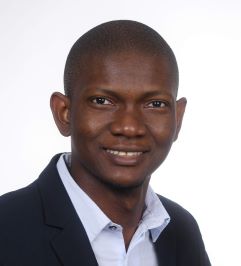
© Private
When Nelson Masota embarked on his PhD research at the University of Würzburg, he discovered way more than the anti-bacterial potential of natural compounds he was initially looking for.
A pharmacist by training, Nelson Masota received a PhD scholarship to Germany jointly sponsored by DAAD and the government of Tanzania. Having never left his home country before, he was determined to overcome the “sharp cultural change in the beginning”, as he calls it, and appreciates the intercultural training DAAD provided upon his arrival. “Don’t try to change the culture you find, but try to live with it”, he told himself. “When in Germany, I will eat German food.” Until today, his favorite German food is Brot mit Leberkäse, Ketchup und Senf.
When Nelson Masota started his search for new antibiotics, eventually isolating four compounds of the Paeonia officinalis plant indicating anti-bacterial potential, he also experienced one of his biggest lessons. His academic supervisor, Prof. Ulrike Holzgrabe (now retired), allowed him “to explore” and find his own ways of solving research problems. “I was used to approaching my superiors with a problem and expecting them to solve it for me”, Masota explains. “With Prof. Holzgrabe, I had to find two or three possible solutions before even approaching her, and I had to have decided which way I would go and explain to her why.” It took him one year to catch up with this supervisory style – now he has adapted it as his own.
His research eventually resulted in contributing to the number of known molecules with anti-bacterial potential.
During his semester assistantship at the University of Würzburg, Nelson Masota’s help train undergraduate Pharmacy students in lab techniques, he taught them and supervised their seminars. The experience how students in Germany are trained in the lab has, too, proved valuable for his own position as lecturer at the Department of Medicinal Chemistry at the Muhimbili University of Health and Allied Sciences in Dar es Salaam that he took up after returning to Tanzania in April 2023.
Mecha Ezekiel, Kenya
Endocrinologist
DAAD Scholarship (2010 – 2014)
Funded by the DAAD Research Grants – Doctoral Programmes in Germany
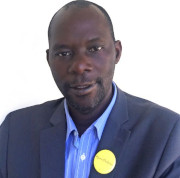
© Private
When it comes to trailblazers, Ezekiel Mecha can proudly claim his place among their ranks. A Senior lecturer at the Department of Biochemistry, Faculty of Science and Technology, University of Nairobi, he received his Ph.D. in Reproductive Endocrinology from Justus Liebig University Giessen in Germany. With more than fifteen years of experience in research and teaching in the field of reproductive health, including endometriosis, adenomyosis, fibroids, and other uterine problems, he organized, with DAAD support, the first and second East African Endometriosis Conferences in 2021 and 2022 respectively, raising awareness for this under-researched, rather unknown, but nevertheless debilitating disease.
His tireless engagement earned him membership in the World Endometriosis Society, and he is participating as a mentor in a World Endometriosis Society mentoring program. In November 2021, he was appointed as the Society’s only ambassador to the African continent. In addition, in May 2023 during the 15th World Congress on Endometriosis which took place at Edinburgh, Scotland, Dr. Mecha was appointed to the seven-member executive board of the World Endometriosis Society for a period of two years.
He spearheads a multi-sectoral and multi-professional approach to the management of endometriosis and adenomyosis, engaging all stakeholders in endometriosis care with the aim of producing an endometriosis policy in Kenya. He serves as the Chair of the Kenya DAAD Scholars Association (KDSA), the University of Nairobi Chapter, and a Board Member of the National Executive Council of the Kenya DAAD Scholars Association.
“To be successful in research and your job in Germany, you must be open, voice your viewpoint, ask questions if you don’t understand anything, and be honest with your supervisors, superiors, and co-workers.”
Mekonnen Yalemtsehay, Ethiopia
Cell and Human Physiology
DAAD scholarship (1989 – 1992)
DAAD Research Fellowship for Doctoral Studies
Alexander von Humboldt Fellowship: 2001-2002
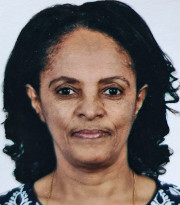
© Private
Professor Yalemtsehay Mekonnen is a senior professor in the Department of Zoological Sciences at the College of Natural and Computational Sciences, Addis Ababa University, and was one of the first women to receive DAAD funding in the natural sciences from the Global South and one of the first women professors in Ethiopia. She received the African Union Kwame Nkrumah Scientific Awards in 2015 for her contributions to science.
She navigated the education system without much difficulty and with the support of her family, although she faced challenges everywhere as a woman. After having her second child, she went to Germany to pursue a doctorate. She had to take care of her family, teach, and conduct research at the university at the same time. After earning her doctorate at Heidelberg University in 1992, she took on leadership roles.
“My passion for my profession is so strong that I convinced myself at a young age that I could accomplish the things I set out to do and that I wouldn’t give up easily. The key to my success is working hard, using my time effectively, and not capitulating to obstacles that are man-made, cultural, or impacted by institutional rules and regulations.”
As a Fellow of the Alexander von Humboldt Foundation (AvH), she was able to set up part of her research lab with financial support from AvH to give young researchers the equipment and opportunity to conduct their research and gain international experience.
Mtengeti Migiro Asha-Rose, United Republic of Tanzania
Politician, Lawyer, Former Deputy Secretary-General of the United Nations; Secretary-General’s Special Envoy for HIV/AIDS in Africa, currently High Commissioner of the United Republic of Tanzania to the United Kingdom and Ambassador to Ireland
DAAD Scholarship 1988-1992
Funded by the DAAD Research Grants – Doctoral Programmes in Germany
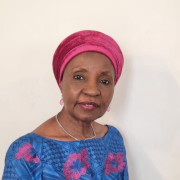
© Private
Dr. Asha-Rose Mtengeti Migiro is a Tanzanian politician and diplomat: she was Minister for Community Development, Gender and Children (2000-2005), and Minister for Foreign Affairs and International Cooperation (2006-2007); making her the first woman to hold this position since the independence of Tanzania Mainland (1961) and formation of the United Republic of Tanzania (1964). She subsequently served as UN Deputy Secretary-General (2007-2012); making her the first African woman to hold this position since its formation in 1997. By the end of her tenure, Migiro was appointed Special Envoy of the United Nations Secretary-General for HIV/AIDS in Africa. She later served her country as Minister for Justice and Constitutional Affairs (2014-2015).
She studied law at the University of Dar es Salaam, obtaining a Bachelor of Laws—First Class Honors (LLB) in 1980; making her the first female student in the Faculty of Law to score the highest honors degree at the University of Dar es Salaam, a record that remains unchallenged. She was later awarded a Master of Laws in 1984. She then continued her studies with a scholarship from the DAAD in the University of Konstanz in Germany, where she obtained a doctorate in law in 1992 with a thesis on Regional Integration frameworks with a Comparative Study of the then-Southern African Development Coordination Conference (SADCC), Preferential Trade Area (PTA) and the European Economic Commission (EEC).
Returning to her home country Tanzania, before entering politics, she worked as a law academician and lecturer at the Faculty of Law of the University of Dar es Salaam (UDSM). She headed the Department of Constitutional and Administrative Law from 1992 to 1994 and the Department of Civil and Criminal Law from 1994 to 1997. Through the legal professional bodies she dedicated much of her time in giving legal aid to common citizens and helped mostly disgruntled families, focusing on women and children.
After her noble service at the United Nations, Asha-Rose was appointed Cabinet Minister in President Jakaya Kikwete’s cabinet. She later contested the most competitive 2015 CCM presidential nomination race as a candidate, and came third in position. She was appointed as High Commissioner of the United Republic of Tanzania to the United Kingdom and Ambassador to Ireland in February 2016.
The dedicated lawyer with a political savvy, acquired an outstanding international reputation as a guest lecturer in several countries including in the southern Africa region, Europe and the United States at seminars on Women’s and Human Rights in several international fora. She is convinced that adequate participation by Tanzanian women in positions of political and economic responsibility is crucial to the country’s development: “We still have a long and difficult way to go,” she says. She has also made a name for herself by taking part in various projects of the Friedrich Ebert Foundation, notably the Agenda 2000 and this helped her keep in touch with Germany. She was appointed a part-time Commissioner of the Law Reforms Commission of Tanzania.
Her passion for gender equality and human development lay deep in her heart. She always stands up for children’s and women’s rights in her official positions and as a member of law societies and women’s organizations. She is one of those rare leaders who can be trusted not to swerve from policies and principles of gender equality and human development. A responsible wife and mother of two daughters believes that “improving the living conditions in our communities is our sacred duty”. Asha-Rose is a highly respected leader who has dedicated years of service to the concerns of developing countries.
Mubiru Allan, Uganda
Co-Founder of Kaffeekoop GmbH
Alexander von Humboldt Foundation – International Climate Protection Fellowship (2012 – 2013)
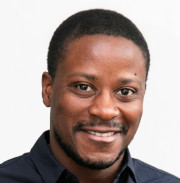
© Private
Uganda-born Allan Mubiru co-founded Kaffeekoop GmbH, the Ugandan-German social company that developed the Fairtrade project promoting the multiple award-winning Rwandan specialty coffee “Angelique’s Finest” that is produced exclusively by women. The economist and climate finance expert ran a successful crowdfunding campaign to launch “Angelique’s Finest” in 2018.
The project is already boosting the financial independence and social participation of the approximately 1,800 women farmers: “Women are responsible for sowing, tending the plants and harvesting, but financially and structurally it is usually the men who benefit from the coffee bean trade,” says Mubiru. “Moreover, much of the cultivated land is owned by men.” Angelique’s Finest counteracts this injustice: the women producers are not only in charge of the cultivation, they also have complete ownership of Angelique’s Finest brand, control of the roasting as well as marketing of the final product.
Allan Mubiru studied business administration with a focus on finance at Makerere University in Uganda. From July 2012 to November 2013, he held an Alexander von Humboldt Foundation International Climate Protection Fellowship at the non-profit organisation atmosfair in Berlin. Here he worked on microfinance and carbon finance models to promote energy access for low-income households. After completing his fellowship, he took on the role of country manager in Rwanda for atmosfair. In 2015, he and an atmosfair colleague initiated Kaffeekoop GmbH, based in Berlin. Mubiru is responsible for the company’s procurement and producer relations, quality assurance and financial management.
Muhwezi Innocent, Uganda
Development Studies
DAAD Scholarship In-Country/In-Region Scholarship Programme (2019 – 2021)
Funded by the DAAD In-Country / In-Region Scholarship
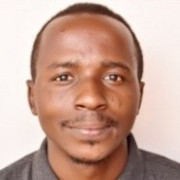
© Private
Thirty-year-old Innocent Muhwezi was born in Kabale District of Uganda. He attended Kyambogo University in Kampala, Uganda and earned a Bachelor of Education in Business Studies as well as a Diploma in Secondary Education with a Business Studies double focus. Muhwezi earned his Master of Education in Research Degree at CERM-ESA based at Moi University, Kenya, supported by a DAAD scholarship.
In October of 2023, through the DAAD’s In-Country / In–Region Scholarship, Muhwezi will enroll at the University of Ghana-ACCRA, Institute of Statistical Social and Economic Research to pursue a doctorate in Development Studies.
Over and above his usual studies, Innocent has received financing from the German Academic Exchange Service (DAAD) to attend a variety of courses and trainings: The School of Education, Nelson Mandela University, South Africa in 2021, the German Centre of Excellence in Educational Research Methodologies Training Seminar and Conference Visit for Online Educa Berlin in Zwickau, Germany in 2022; the SDG Alumni Project; Quantitative Research Methodologies at Kehl University of Applied Sciences in Kehl, Germany.
Muhwezi is a Digital Facilitator at the DAAD DIGI-FACE Project, Kehl University of Applied Sciences in Kehl, Germany, and a Digital Research Colloquium Coordinator (Volunteer), at Leipzig University, SEPT Competence Centre in Leipzig, Germany.
“Masters of Education in Research, at CERMESA, gave me exposure abroad and an interaction with international scholars that widened my research understanding in a unique and highly academically rewarding country-Germany that has made me realize that we don’t learn from experiences, Rather, we learn by reflecting on experiences.”
Muriu Rugo Abraham, Kenya
Expert for public finances
DAAD Scholarship 2011 – 2012 (PPGG) and 2014 – 2017 (GSSP)
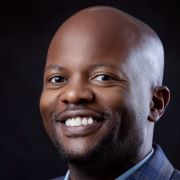
© Private
His stay in Germany for both his Master’s and his Ph.D. at the University of Potsdam changed Abraham Rugo’s outlook on many things: He developed a more international perspective and became less prejudiced, he says. Most importantly, it instilled in him the desire to become wholly dedicated to his work, committed towards society, and offer everyone his best, regardless of their background or financial standing – even if others do not do the same. He learned that people and their attitudes determine whether a governance system works or not – attitude matters and influences change.
The DAAD Public Policy and Good Governance (PPGG) Scholarship programme triggered his desire to become Kenya’s lead expert in public administration and management. Upon his return from Germany, he was made the Futures Programme Officer at the Institute of Economic Affairs (IEA) in Kenya, a leading independent think tank in public policy research, analysis, and advocacy. The subsequent doctoral degree barely completed, he took over as Country Director of the International Budget Partnership Kenya (IBPK) in 2017, an organization that advises governments and society on public spending. Ever since he has been indispensable in the public discourse on taxation and budgeting in Kenya.
Being in Germany helped him to see Kenya more clearly, Rugo remembers. “I started believing that change is possible, and understanding that it takes time, patience, and dedication to build a society.”
Nakaliisa Aminah, Uganda
Assistant Lecturer at Makerere University Kampala
DAAD Scholarship (2014-2016)
Master’s Programme in German Studies at the University of Nairobi
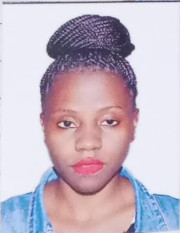
© Private
Amina Nakaliisa is a German lecturer at Makerere University. and a DAAD scholarship holder. Her career began with a Bachelor of Education in German and Religion at Makerere University.
Her pursuit of academic excellence has set her on a very special path. Ms. Nakaliisa embarked on an adventurous journey by pursuing a Master’s degree in German Studies at the University of Nairobi under a scholarship for the education and training of African students and lecturers of German. This opportunity helped her to delve deeper into the complex areas of German language, literature and culture.
She then studied at the Carl-von-Ossietzky University in Oldenburg and deepened her language skills. Here she engaged in intensive research in the field of translation and deepened her understanding of the fascinating dynamics of language change.
Today, Ms. Nakaliisa is a German lecturer at Makerere University. She guides and inspires students in German language, literature, and culture. Her tireless efforts and genuine passion help her students understand and appreciate German.
“I ignite my students’ love and interaction, making language acquisition a breeze. My mission is to mentor a multitude, paving the path for countless individuals to savor similar, life-enriching prospects.”
Ndayikunda Yves, Burundi
Communication Expert, Lecturer, Researcher, Former Vice-Chancellor, Former NGO Director General
DAAD Scholarship (2015 – 2019)
Funded by the In-Country / In – Region Scholarship Programme
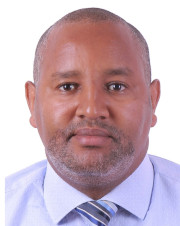
© Private
Dr Yves NDAYIKUNDA is Burundian born in 1979. He holds a PhD in Strategic & Political Communication earned from Daystar University. He is a former VC of Bujumbura Light University (Université Lumière de Bujumbura), and former NGO Director General. He is a university lecturer and researcher in media and communication in different Universities such as Bujumbura Light University and currently at Saint Paul University Ottawa-Canada.
He is the former Secretary General of the East African Communication Association (EACA). Currently, he is a board member of the Academia of Controversies and Sensitive Communication based in France; Alumni of International Visitors Leadership Program, IVLP-US; Founder of Communication Consulting, Audit and Solutions, COCASO; member of UN Sustainable Development Solutions Network: University Sector Support to the UN’s Decade of Action; member of International Declaration of Communications Professionals and Researchers for a Healthier, Viable, Better World, INTERDECOM – Canada; and Chair Planning, Finance and Human Resource Committee at Inter-University Council for East Africa.
He is committed to the cause of gender equality and equity: he is a steering committee member of One Speak One Voice (a central African movement against violence against women and children); and he is a research collaborator with African Population Health Research Center (APHRC) and IUCEA on Participation and Quality of Experiences of Women in Science Technology Engineering and Mathematics (STEM): Postgraduate Training Programs and Careers in East Africa.
He is also a consultant for international organizations, UN agencies and the Government of Burundi on matters of strategic communication, communication for development and innovative education system.
He is passionate about reading, travelling, and coaching the youth.
Ndayitwayeko Willy Marcel, Burundi
Agricultural Economist
DAAD Scholarship: In-Country Programme (2004 – 2006) for refugees
Funded by the In-Country / In – Region Scholarship Programme
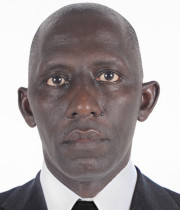
© Private
He was a second-year Agronomy student at the University of Burundi when a civil war broke out in his home country. Willy-Marcel Ndayitwayeko narrowly escaped death and fled to Kenya where he obtained a DAAD refugee scholarship for his Master’s in Agricultural Economics and Resource Management at Moi University.
Since he had to interrupt his academic work due to the civil war, “DAAD was like a foster parent that enabled me to finish my studies”, he says. His Master’s studies supported by DAAD boosted his self-esteem as well as his academic profile. Since he had come to Kenya as a refugee with not much hope of ever resuming his interrupted studies, the DAAD scholarship provided him with a treasured second chance. “My degree was like a complete rebirth and a new passport.”
Upon his return to Burundi in 2008, he was appointed Assistant Lecturer. Few people in Burundi held a Master’s degree in Agricultural Economics by then. With academic tools in hand, he transformed the department of Rural Economics and was able to help students writing theses with sound and articulated research methodologies conveyed to them. Today, he is Associate Professor of the Faculty of Economics and Management, University of Burundi, and Head of Public Relation and Cooperation.
Access to DAAD publications, newsletters, the DAAD online portal and networking with fellow alumni has helped Willy-Marcel Ndayitwayeko understand what needs to be done to reduce or eradicate human suffering in Burundi. It has helped him apply the skills he acquired during his studies – to help humanity by transferring the knowledge and technology gained in education at the grassroots level. He also serves as the president of ABADAAD, a Burundian DAAD alumni association to support networking and have a continued impact on the society of Burundi.
Ngila Catherine Jane, Kenya
Chemist
DAAD Scholarship (1987 – 1989)
Funded by the In-Country / In-Region Scholarship Programme
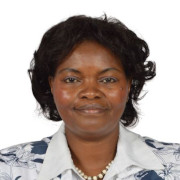
© Private
Professor Dr. Jane Catherine Ngila has devoted her life researching to improve water quality and its resource management on the African continent. She received a number of prizes in her career, the most prestigious the UNESCO L’Oréal Prize for Women in Science, awarded in 2021.
“I want us to have access to safe drinking water, just as is the case in developed countries such as USA and in Europe,” said Ngila in an interview with University World News. “It is my dream to have an Africa where water is not only abundant but also clean and safe.”
She pursued her Bachelor of Education in Science degree and later a Master of Science in Chemistry with a DAAD scholarship at Kenyatta University. In her doctoral research, she focused on nanotechnology for water treatment.
Prof. Ngila believes that nanotechnologies play an important role in water purification in Africa. She was a pioneer in the establishment of the Nanotechnology Innovation Centre and coordinated the Nanotechnology Centre at the University of Johannesburg in South Africa.
She also advocates for more women in science and technology to take leadership roles in water research, not least because the lack of clean water traditionally affects women the most.
She was Acting Executive Director for the African Academy of Sciences from January 2021 to November 2022 and is fellow of the World Academy of Sciences (TWAS).
Ntangare Mercy Mirembe, Uganda
Performance Scholar
DAAD Scholarship: Sandwich PhD programme (1998 – 2001)
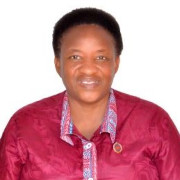
© Private
Mercy Mirembe Ntangaare starts Alumni meetings with a song. “This is an ice breaker – it is quite easy to communicate with music,” the performance scholar from Kampala’s Makerere University states. As an arts person – a playwright, folklorist, educationist, theatre maker and producer of children’s and young people’s theatre – she is rather the exception among DAAD Alumni most of whom are natural scientists and social scientists. For this reason, she always finds herself explaining the relevance of her field. “But art is not just entertainment”, Mercy explains. “We use aspects of theatre as a development and communication tool, for analysis and mobilization. Therefore, you could call it applied theatre.”
Today, Mercy Mirembe Ntangaare is an Associate Professor of Drama at the Performing Arts and Film Department, Makerere University, where she teaches Drama/ Theatre, Dramatic Literature, Folklore, Theatre Marketing Entrepreneurship and Make-Up, Scenic and Costume Design.
She is interested in inter-disciplinary research, Cultural Economics, Folk Arts, Biographies including biographical drama and presentations, Arts Marketing, Drama Portals, and E-Publishing.
During her 18 months stay as a Ph.D. student at the University of Bayreuth, she learned to appreciate how to combine, if not even merge, German and African ideas of artistic expression, working with the diversity of cultures and languages. “This made my scholarship worthwhile,” she says. She thoroughly enjoyed the performances of the Bayreuth Opera House as a student with complimentary tickets, and upon invitation from German friends at church, she went to primary schools to perform with children, introducing them to African folk songs.
Unforgettable for her will be the kindness of a German who found her pulling a very heavy suitcase upon arrival from Frankfurt Airport at the Mannheim train station. Her name was Irina Köcher. She hosted the stranded Mercy, whose pre-booked hostel was not available, for two nights at her house, marking this as the beginning of a lifelong friendship.
Oba Peter, Uganda
Veterinarian
DAAD Scholarship: In-Region Programme (2017 – 2021)
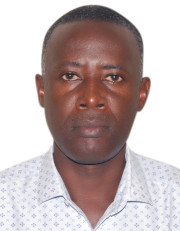
© Private
Peter Oba is a veterinarian with 22 years’ experience in design, implementation, and evaluation of animal health programs in Uganda. After his Bachelor of Veterinary Medicine (BVM) degree and a Master of Science (MSc) in Infectious Disease Management, he completed his PhD in Veterinary Medicine, specializing in epidemiology and conducting his research at ILRI, completing it with the support of DAAD in 2023. In his research, he sought to understand the dynamics of respiratory disease distribution in pigs regarding its impact on pig production and found out that these diseases are associated with farm management practices which need to be improved to increase pig production.
While under the DAAD scholarship, Peter Oba appreciated DAAD for setting clear targets and deliverables for which the recipient of the fellowship program was evaluated against. “This has greatly shaped my abilities for any future assignments I happen to come across”, he reflects.
As a new DAAD Alumnus, he is interested in mentoring upcoming scientists in his field in what it takes to have a scientific career, and in order to build capacity for Uganda. Peter Oba is now looking forward to a professional career in his field of expertise – livestock research, capacity development and training for the benefit of society. He is passionate and motivated to improve livelihoods of livestock value chain actors through addressing animal health and production constraints. The overall goal is to improve productivity and household incomes for reduction of hunger, inequality, and poverty.
Ombaka Lucy, Kenya
Chemist
2018-2021: Georg Forster Postdoctoral Research Fellow of Alexander von Humboldt Foundation
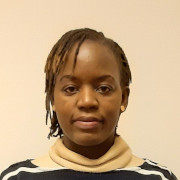
© Private
Lucy Ombaka is a chemist at the Technical University of Kenya in Nairobi, Kenya. In 2018, she was a Georg Forster Research Fellow at the Institute of Technical Chemistry at Leibniz Universität Hanover. Her research targets facile techniques of developing economical and efficient semiconductor-based catalytic systems for solar-driven hydrogen fuel production as an alternative to fossil fuel. She is a promoter of green hydrogen and power-to-X (PtX) systems who is looking into building bridges between scientific innovations, technology and community development. Dr. Ombaka is also experienced in training green hydrogen and other PtX modules, energy efficiency and science communication.
She obtained an MSc in Chemistry from Egerton University, and later received a scholarship from the South African government to conduct a PhD at University of KwaZulu-Natal. Upon completion of her PhD, she secured a lecturing position at Dedan Kimathi University of Technology. She joined the Technical University of Kenya in 2017.
She takes pride in every huddle she overcame towards advancing her career – as women, particularly those from developing countries, have to overcome plenty of barriers -both economical and social -to advance their careers.
While being a postdoctoral fellow in Hanover, she also took care of her 3-year-old son on her own. She was thrilled to be nominated by the Alexander von Humboldt Foundation to attend the Lindau Nobel Laureate Meeting and learn from Nobel Laureates.
Source: Women in Research: Lucy Ombaka from Kenya – Lindau Nobel Laureate Meetings (lindau-nobel.org), slightly altered and updated by DAAD
Onyango, Christine A., Kenya
Deputy Vice Chancellor Taita Taveta University (TTU)
Funded by the DAAD for the International deans Course (IDC) in partnership with German Rectors Conference (HRK), Commission for Higher Education (CHE) under the Dialogues on Innovative Higher Education Strategies (DIES) Programme
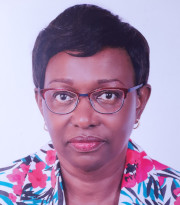
© Private
Christine A. Onyango is a Professor of Food Science and Postharvest Technology with specialisation in Food Chemistry and Meat Preservation. She holds a BSc. (Hons) in Food Technology and Nutrition and an MSc in Food Technology from the University of Nairobi and a PhD in Food Science and Postharvest Technology from Jomo Kenyatta University of Agriculture and Technology. Prof Onyango completed postgraduate studies in Advanced Food Technology at the Hebrew University of Jerusalem in 2002 and Postgraduate Studies in Agricultural Research for Development (IAR4D) at the International Centre for Development-oriented Research in Agriculture (ICRA) in Wageningen, the Netherlands in 2006.
At Taita Taveta University (TTU), she is currently the Deputy Vice Chancellor (Academic, Research and Outreach) responsible for the teaching and learning, policy development related to student affairs, academic staff recruitment, programme development, examinations and quality assurance, research and outreach, and Library and ICT. At CEMEREM (Kenyan-German Centre of Excellence for Mining, Environmental Engineering and Resource Management, a DAAD-funded consortium, she coordinates the project work and has been involved in the partnership in collaboration with the University of Applied Sciences Dresden (Hochschule für Technik und Wirtschaft Dresden (HTWD) and TU Bergakademie Freiberg (Technical University of Mining in Freiberg (TU BAF) over the years.
She serves on several boards locally and in Europe and is currently Vice Chair of the Board of the African Network For Agriculture, Agroforestry And Natural Resources Education (ANAFE). She is an alumna in the DAAD funded DIES (Dialogue on Innovative Higher Education Strategies ) programme and is committed to quality assurance and development of international standards. She is also a facilitator for the IDC-Africa Training since 2015 to date.
She has several years experience in donor programme management and has been a team leader for the capacity building in resolution of complex problems and over years experience in teaching and research at university level, development of training programmes, planning and facilitation.
Owuor Yvonne Adhiambo, Kenya
Writer
Artist in residence at the Berlin Artist-in-Residence Programme (2020 – 2021)
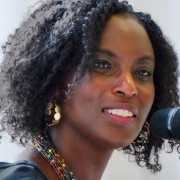
© paukwa.or.ke
Yvonne Adhiambo Owuor burst into the literary limelight in 2003 when she won the Caine Prize for African Writing. Ever since, she has contributed in no small way to expanding the global visibility of African writing and literary culture. Her writing, both fiction and nonfiction, captivates readers with its representation of African life in resonant and complex ways. This makes her one of the leading voices of contemporary African writing.
Whether in a novel like Dust (2014), set against the 2007 post-election violence in Kenya or in a short story like Weight of Whispers, which explores the Rwandan genocide, Owuor invites readers to participate in a shared experience of trauma as a private experience and a collective reckoning.
Her most recent work of fiction pushes boundaries in other ways. The Dragonfly Sea, for example, shows Owuor to be part of a new generation of African women writers taking the literary space by storm. Against a literary tradition that has always been male dominated, writers like Owuor are recasting Africa’s past in fiction and reconstituting the present in ways that centers the lives of women. The Dragonfly Sea is a book that would have been inconceivable in a different literary climate.
Owuor’s literary pursuits boil down to the search for an ideal form of African storytelling that conveys the truth of the human condition beyond clichés, stereotypes, and worn-out conventions.
Text: Ainehi Edoro
Source: BKP (shortened)
Rugunda Grace Kagoro, Uganda
Biology
DAAD Scholarship In-Country / In-Region Scholarship Programme (2003 – 2007) and Post-Doctoral Research (2011 – 2012)
Funded by the DAAD In-Country / In-Region Scholarship and Post-Doctoral Scholarship
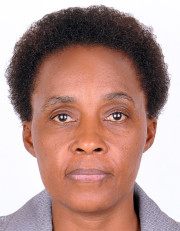
© Private
Dr. Grace Kagoro Rugunda is a professor of Resources Ecology at the Department of Biology at Mbarara University of Science and Technology (MUST), Uganda. She received her PhD from the same university funded by DAAD. Afterwards, she undertook a Postdoc fellowship from Leibniz Institute for Zoo and Wildlife research in conjunction with the University of Hamburg, Germany, in which she worked on a research project entitled Phytochemical and antimicrobial constituents of ethnobotanical plants eaten by chimpanzees (Pan troglodytes schweinfurthii) in Kalinzu forest.
She graduated with a BSc Botany and Zoology at Makerere University and with a MSc. Biology (Natural resource management and conservation) at Mbarara University of Science and Technology (MUST).
She specializes in teaching invertebrate zoology, animal behaviour and natural resources ecology, management and conservation. She has also trained in QGIS and Cybertracker methods of data collection. Her fifteen-year career as a professor has enabled building up of other collaborations such as Vrije Universiteit Brussel on research projects Digital citizen-science for community-based resilient environmental management and improved mechanisms for climate change adaptation for sustainable food production for small scale farmers. Other universities collaborated with include Liebig University Giessen for fresh water ecology with special emphasis on fresh water molluscs, and the University of Kassel on a research project of reducing postharvest losses and adding value in East African fruits and vegetables.
Grace Kagoro Rugunda serves as a member of various boards and committees, including the advisory committee of the National Agricultural Research Organization and the Regional Network for Conservation Educators of the Albertine Rift in Uganda.
Source: Council Members – Mbarara University of Science & Technology (must.ac.ug), slightly altered and updated by DAAD
Sentongo Elizabeth, Uganda
Medical Doctor
DAAD Scholarship 1988 – 1990
Funded by the In-Country / In – Region Scholarship Programme
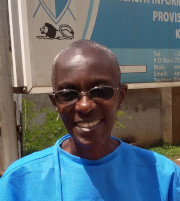
© Private
DAAD started funding Elizabeth Sentongo’s Masters studies in Public Health in 1988, when she was a young medical doctor on the verge of deportation from Kenya. Studying Public Health at the University of Nairobi enabled her to carry out fieldwork on the control of human African trypanosomiasis or sleeping sickness in Uganda and the exposure to international health organisations. She was subsequently offered the opportunity to study at the Bernhard-Nocht Institute for Tropical Medicine (BNITM) in Hamburg for her PhD.
From 1994, under the mentorship of the late Professor Dr. Dietrich W. Büttner, she developed her research and teaching expertise in parasitology and tropical medicine, combining clinical, laboratory, and field methods. She considers the upgrade to parasite immunology in 1996 overwhelming but worthwhile, under the gentle guidance of Dr. Norbert W. Brattig who was also at the BNITM. On returning to Uganda, she headed the immunology laboratory during the first HIV vaccine trial. Besides learning Swahili and German, she interacted in Germany with people from different ethnicities and nationalities, which broadened her perception of culture. “Most of all, DAAD facilitated a comfortable life”, she remembers. “While some colleagues worked day and night shifts, I concentrated on my studies and even found time to relax.”
DAAD’s Sandwich Scholarship allowed her to study partially in Germany and in Uganda. She would do the clinical and fieldwork in the then Kabarole District of western Uganda, later ship and analyse samples in Hamburg. When the immunology studies required more expensive reagents and equipment, she travelled to Bonn; “I made a special request and DAAD agreed to more funding”, she recalls.
Dr. Sentongo has fond memories of the Speak and Write language school in Marburg. In 1993, with North and West Africans, Asians and South Americans, she learned German beginning from “Das ist ein Schrank“. The teacher’s job was so well done that she wrote her thesis in German. The summer schools in Bayern were an exceptional experience for her, bringing DAAD-sponsored and German students together and living the nature of Bavaria. The “Nobelpreisträger-Tagungen” in Neubeuern was unforgettable, there she interacted with the Laureates and witnessed exquisite German culture.
Soma Grace Juan, South Sudan
Medical Doctor
DAAD Scholarship 2014 – 2018
Funded by the In-Country / In – Region Scholarship Programme
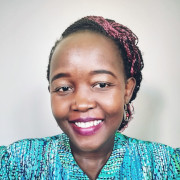
© Private
She always wanted to become a paediatrician. After receiving her Bachelor of Medicine and Surgery degree from the University of Nairobi, Kenya, Dr. Grace Juan Soma, with the help of a DAAD scholarship, earned her Masters of Medicine degree in Paediatrics and Child Health from the same university. Today, she is a paediatrician, child health specialist and training consultant and has more than 10 years of experience practising medicine in both Kenya and South Sudan. She additionally obtained a Master’s of Science degree in Tropical Paediatrics from Liverpool School of Tropical Medicine.
Dr Soma has worked as a lecturer at the Department of Paediatrics and Child Health, University of Juba and at St. Mary’s College in Juba, South Sudan. She is keen on building the capacity of health workers and has conducted child health and clinical training consultancies in South Sudan.
A summer school at the University of Heidelberg as a DAAD scholarship holder in 2018 is what she considers a career-changing moment: Due to her enhanced qualifications in teaching and researching public health she acquired in Germany, she has been able to train healthcare workers on newborn care and TB in South Sudan.
As one who is keen on capacity building, knowledge transfer and women’s empowerment, especially in the global south, Dr. Soma has co-founded South Sudanese Women In Medicine (SSWIM) and Women In STEM (WiSTEM) South Sudan. Her roles in these institutions include providing organizational leadership, program development, grant writing and project management. Through these initiatives, she engages medical women to positively shape healthcare, and empowers and inspires women and girls to pursue STEM related courses and careers respectively. “We want to put science on the mind of every citizen,” she urges. “Let’s have scientists put solutions on the table and be the bridging piece to development and sustainable peace.”
Taremwa Nathan Kanuma, Rwanda
Senior Lecturer
Department of Rural Development and Agricultural Economics (RDAE), School of Agriculture and Food Sciences (SAFS)
DAAD project funding for university collaborations: “Praxispartnerschaften” 2021 – 2024
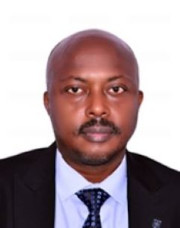
© Private
Dr. Nathan Kanuma Taremwa is a Senior Lecturer at the University of Rwanda (UR) in the College of Agriculture, Animal Sciences and Veterinary Medicine (CAVM). He obtained his PhD in Agribusiness from Kenyatta University (KU), Kenya. He holds two master degrees from different disciplines, namely: M Sc., Leadership Development in ICT the Knowledge Society from University of Mauritius (UoM) and M Sc., Agricultural Development from Ghent University, Belgium. He obtained his bachelor’s degree from the National University of Rwanda (NUR). He has also acquired various professional trainings and benefited from different research stays in Germany with DAAD funding.
He is the Principal Investigator (PI) for two projects funded by DAAD: “Capacity Strengthening in Technology Transfer and Commercialization of University Intellectual Property” (TT-CUIP) in cooperation with both Neu Ulm University of Applied Sciences (HNU), Germany and Kenyatta University (KU), Kenya and the Advancing Sustainable Economic Development in Rwanda through Circular Agro-Economy (Rwanda CAE) in cooperation with HNU and the two projects are funded by DAAD.
The TT-CUIP project aims at strengthening the technology transfer capacity through the UR’s research directorates/offices. It also focuses on commercializing the university’s intellectual property to the broader stakeholder networks and partnerships with society. The TT-CUIP project also aims to produce able and competent training trainers in patent drafting as an essential skill at the University of Rwanda. The Rwanda CAE project is supported by the DAAD in the program University-Business-Partnerships. Rwanda CAE is cooperating with Neu-Ulm University of Applied Sciences (academic institution) and two industry partners, SharkBite Innovation and En-Crops GmbH both from Germany and Sina Gerard (Urwibutso Entreprise Ltd) from Rwanda.
He is the Secretary General for the Rwanda Quality Assurance Network (RWAQAN) and Country Representative at EAQAN.
Teklemichael Ghirmay Yohannes, Ethiopia
Public Health Officer
DAAD Scholarship 2021 – 2023
Funded by the Leadership for Africa Scholarship Programme
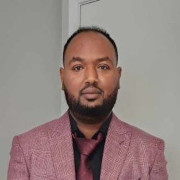
© Private
Teklemichael Ghirmay Yohannes completed his Bachelor’s degree at the Asmara College of Health Science/Eritrea in Public Health 2012-2016. He was one of the first graduates with a DAAD Leadership for Africa scholarship to achieve an MSc. in Global Public Health at the Technical University of Deggendorf at the European Campus Rottal-Inn.
As an Eritrean refugee, he applied for the Leadership Programme from Ethiopia in 2020 and was able to gain international experience abroad.
He was born and grew up in a village district 30 km from Asmara, Eritrea, where he experienced a lot about disease and prevention. This motivated him to become active in the health sector. So after completing high school, he joined the College of health Science where he studied public health. Right after his graduation he was assigned to his village in Dbarwa health center as a public health officer in malaria controlling program and integrated disease surveillance response (IDSR). As he was the first health officer assigned to the place he had lot things to do. He taught the community about health education, especially about malaria, and distributed mosquito nets to every household.
Through the DAAD scholarship and during his stay in Germany, he gained cultural and social convictions and has benefited from the large DAAD network at various meetings in Berlin, Munich and Cologne.
He is a professional public health officer and researches communicable and non-communicable diseases. He has worked in this profession for more than eight years. The DAAD scholarship has helped him a lot to further qualify in his profession and has given him a high level of competence in decision making and data processing.
“I want to gear my major career path in conducting and advocating public health research related to Eritrea and the Eritrean people.”
Tussie Gemedo Dalle, Ethiopia
Former Minister of Environment, Forest and Climate Change of the Federal Democratic Republic of Ethiopia
DAAD Scholarship 2003 – 2004
DAAD Doctoral Scholarship 2003–2004
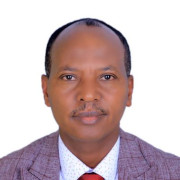
© Private
Dr. Gemedo Dalle is an Associate Professor of Vegetation Ecology and Biodiversity Management at the Center for Environmental Science, Addis Ababa University, Ethiopia. From November 2016 until October 2018, he was Ethiopia’s Minister of Environment, Forests, and Climate Change. Prof. Dalle also served as Chairman of the Climate Vulnerable Forum (CVF) and Least Developed Countries (LDC) for two years. He has worked for the Global Green Growth Institute (GGGI) as GGGI Ethiopia Country Representative (January 2021–December 2021) and Africa Regional Lead for Forestry and Nature-based Solutions, based in Abidjan, Cote D’Ivoire (January 2023–present).
From November 2012 until October 2014, Dr. Gemedo Dalle chaired the Convention on Biological Diversity (CBD)’s CBD’s Subsidiary Body for Scientific and Technical and Technological Advises (SBSTTA). He was among the African negotiators for the Nagoya protocol on Access and Benefit Sharing of the CBD and also served as National Primary Focal Person for the CBD, International Treaty on Plant Genetic Resources for Food and Agriculture (ITPGRFA) and Intergovernmental Platform for Biodiversity and Ecosystem Services (IPBES).
He was Ethiopian Biodiversity Institute Director General from 2012 until October 2016. He served in different capacities in the same institute in the past including as Director of the Genetic Resources Transfer and Regulation Directorate and Head of the Forest Genetic Resources Conservation Department.
Gemedo holds a PhD in Ecology (Agricultural Sciences) from Georg-August University of Goettingen, Germany, MSc in Botanical Sciences (Biology) and BSc in Biology both from Addis Ababa University and has been teaching, supervising and conducting research in diverse fields.
Sources: Gemedo Dalle — Global Green Growth Institute (gggi.org)
Wanjuki Carolyne, Kenya
DAAD “Garissa Scholarship” 2015- 2019
DAAD-Stiftung Scholarship, Garissa Master Scholarship Kenya: 2021 – 2023
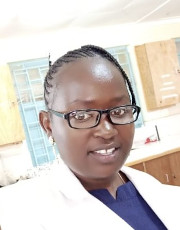
© Private
“As the saying goes, a long journey starts with a single step. I thought my dreams would never come true after the barbaric attack by the al-Shabaab militia on innocent students at Garissa University. But I thank God that the DAAD came through during the difficult times of my life and helped me to find my way back to normal with their education support programs, which really helped me complete my first academic degree with a DAAD scholarship.”
Carolyne Wanjuki was a Bachelor of Education Science (Mathematics and Biology) student at Garissa University before the attack. After the devastating attack by terrorist militia al Shabaab on the Kenyan University of Garissa in 2015, the DAAD helped students to find their way back to normal with a support program. Several hundred particularly needy students received scholarships and were able to successfully complete their first academic degree with DAAD scholarships, one of them was Carolyne.
After her Bachelor’s degree program, Carolyne never thought she could pursue a Master’s degree but the DAAD-Stiftung’s Garissa Master Scholarship Kenya enabled this. In the spirit of civil society engagement, the DAAD-Stiftung (DAAD foundation) in 2021 awarded a grant for Master studies to seven students in order to make it easier for these young academics to continue their studies.
Her motivation to advance her education came about after realizing that people have abandoned the conservation sector, which has led to an increase in food insecurity and poverty. She is interested in the improvement of biodiversity, a factor that holds significant potential for the advancement of both the local community and the country at large.
“I want to devote myself to the conservation sector more so to help small-scale farmers near forest reserves who have faced lots of challenges from small mammals.”
Apart from studies, Carolyne loves traveling to explore nature, playing volleyball, and watching movies.
Partly adopted from www.daad-stiftung.de
Wibabara Charity, Rwanda
Lawyer
DAAD Scholarship (2009 – 2013)
Masters and PhD Studies funded by DAAD
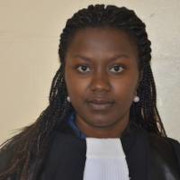
© Private
Dr. Charity Wibabara as a prominent lawyer with extensive experience in International criminal law. LLM & PhD Alumna Dr Charity Wibabara was appointed National Prosecutor at the National Public Prosecution Authority in Rwanda in March 2015. She is currently the coordinator of the International Crimes Department which specifically prosecutes cases transferred by the ICTR to Rwanda and extradited cases from third states as well as cross-border crimes.
She is a visiting lecturer at the University of Rwanda.
She had a humble childhood and attended most of her primary school as a refugee in Uganda until 1994 when her family came back to Rwanda. Wibabara advises women to take advantage of the Government’s policy to promote women’s standing in society to aim for the highest.
She enrolled for a Masters degree in 2009 and a PhD in 2010. Both her Masters and Doctorate were sponsored by the DAAD at the University of Western Cape in South Africa in collaboration with Humboldt University in Berlin. Her Bachelor’s degree was obtained from the National University of Rwanda in General law with distinction.
During her PhD research, she was focusing on the lessons from the different justice approaches that were applied to deal with the aftermath of the 1994 Genocide against the Tutsi which involved the International Criminal Tribunal for Rwanda, national courts and the traditional Gacaca Courts.
She is an advisory Board member of the African-German Research Network for Transnational Criminal Justice, which aims to provide Alumni with the basis and the resources to further their academic and personal exchange.
Woldemariam Hirut, Ethiopia
Former Minister of the Ministry of Science and Higher Education, Ministry of Culture and Tourism, Ministry of Labor and Social Affairs in Ethiopia
DAAD Doctoral Scholarship/Sandwich (2001 – 2004) and AvH Fellowship (2016 and 2021)
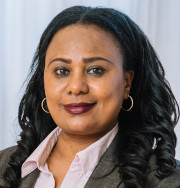
© Private
Dr. Hirut Woldemariam received her Doctor of Philosophy in Linguistics from the University of Cologne, Institute of African Studies (2004), following her MA (1993) and BA (1988) in Linguistics from Addis Ababa University. In addition to her wide-ranging and internationally networked activities in research and teaching, she has also made a lasting contribution to the development of her Ethiopian alma mater at the administrative level. Starting with the heads of the Department of Linguistics (2006-8) and the Anti-Corruption and Ethics Office (2007-8), she was the first woman to rise to the university management level, first as “Associate Vice-President for Academic Affairs” (2008-10), then as “Vice-President for External Relations, Strategic Planning and Partnership” (2010-12) in a Sandwich program with Addis Ababa University. Her prolific academic record demonstrates leading international research projects, publishing two books and over three dozen of peer reviewed articles in international journals. She has also served as a member of editorial boards for international academic journals, and as a member of selection committee for international research grants including for Volkswagen foundation.
She has received different awards including Doctor Philosophiae causa for 2022 from University of Oslo; Research Award for Senior Scientists from Alexander Humboldt; Solidarity Award from the Association International de Linguistique Appliqueé (AILA), USA; and OSSREA, the 17th Social Science Research competition for young scholars. Moreover, she has been member in various national and international research networks and projects. She was also a member of the Ethiopian Public Diplomacy.
Her life philosophy is, “We are the products of our actions.”
She believes she is the designer of the life she wants; hence, she exerts all effort to get what she wants in all walks of life. Hirut is proud of all the accomplishments she achieved in her profession, career, academics, family and social life. With confidence, she speaks of time management.
Celebration Events
The DAAD Regional Office for East Africa recently celebrated its 50 years!
You can watch the events here
More information: Anniversary website with alumni gallery
